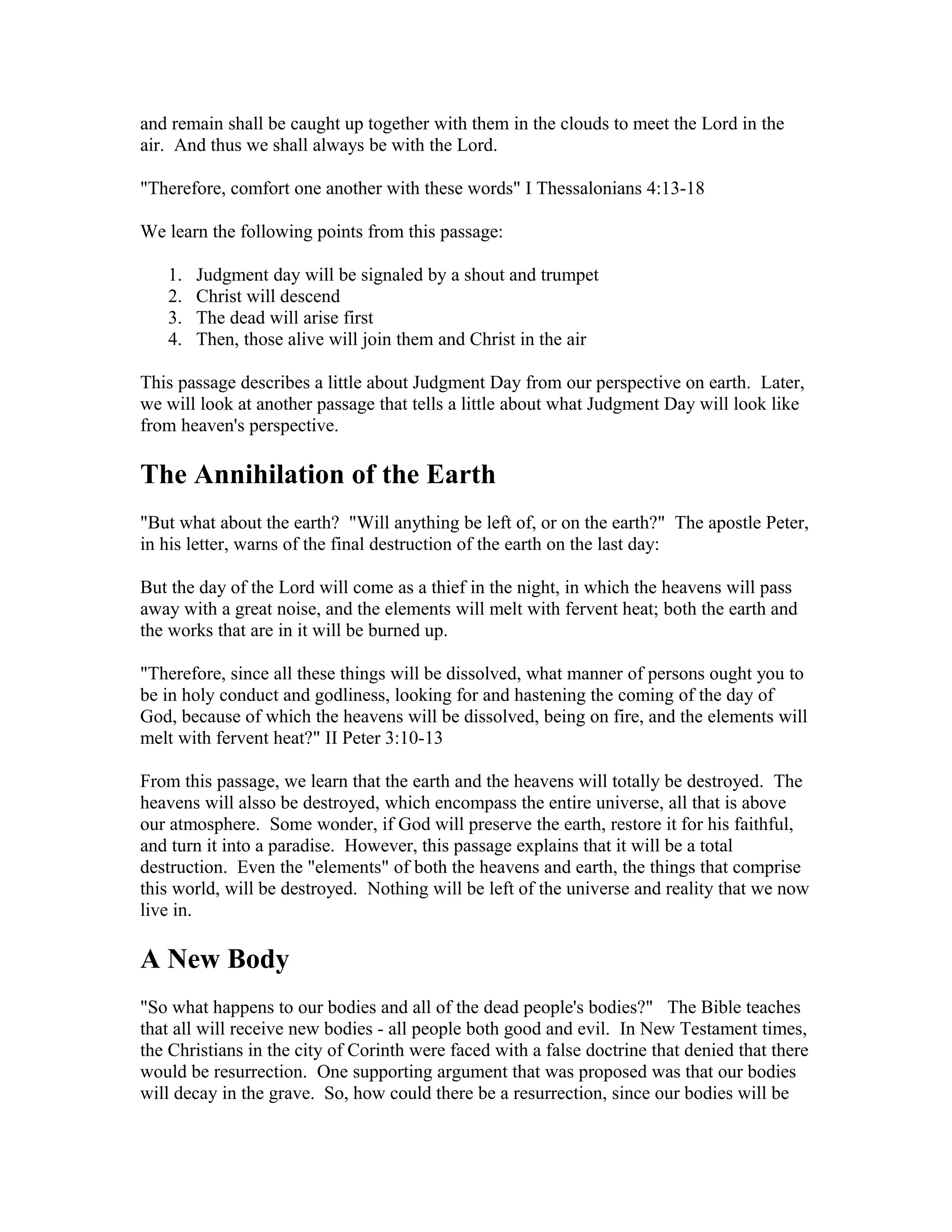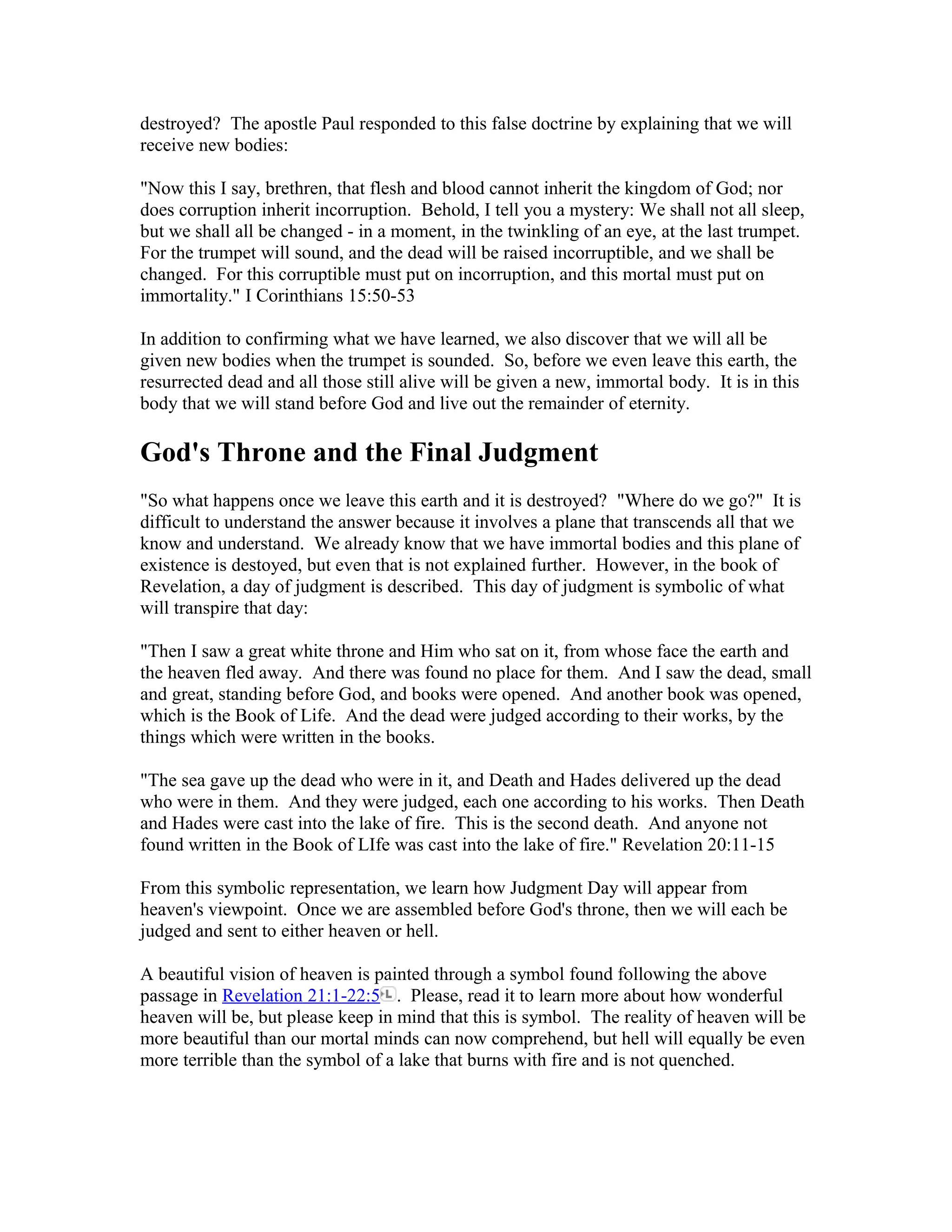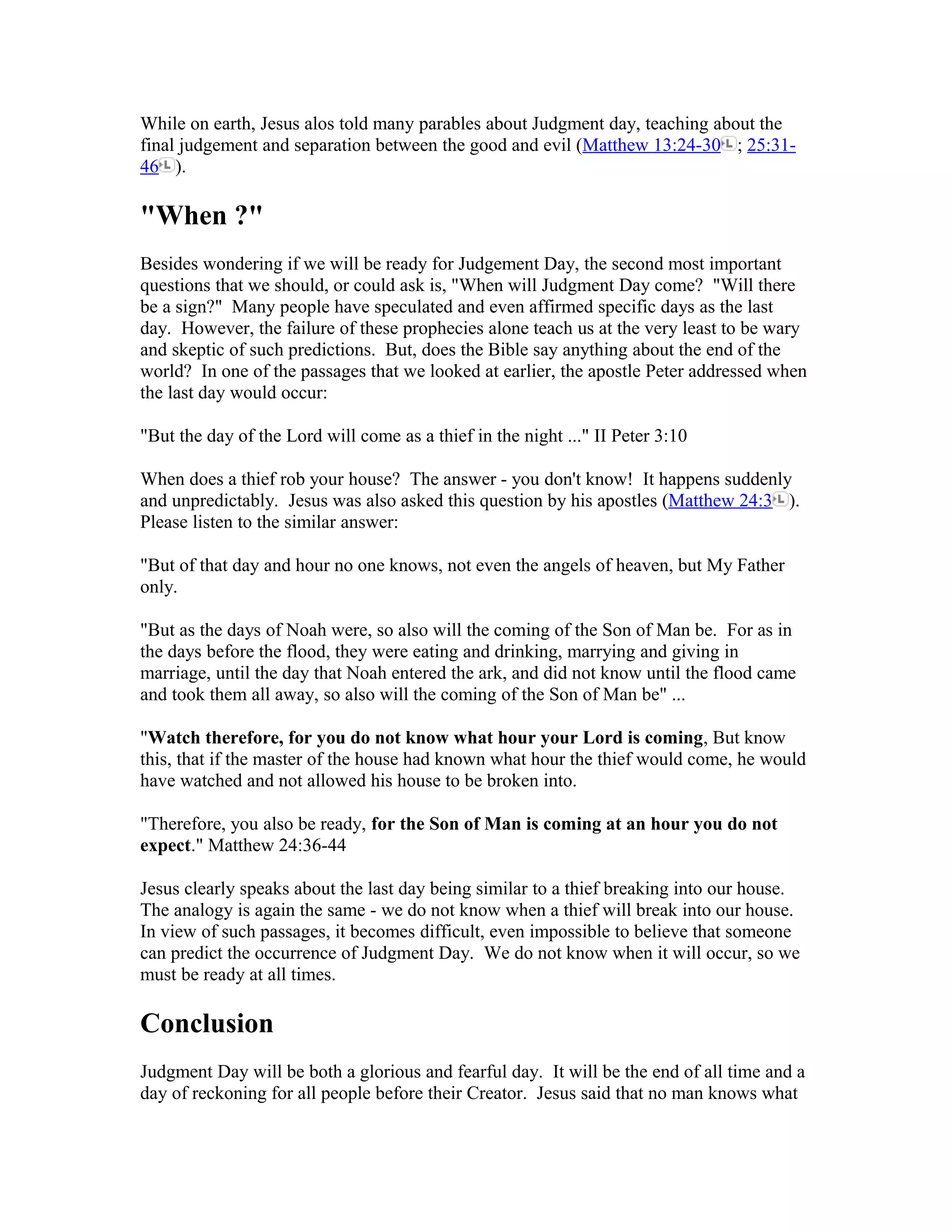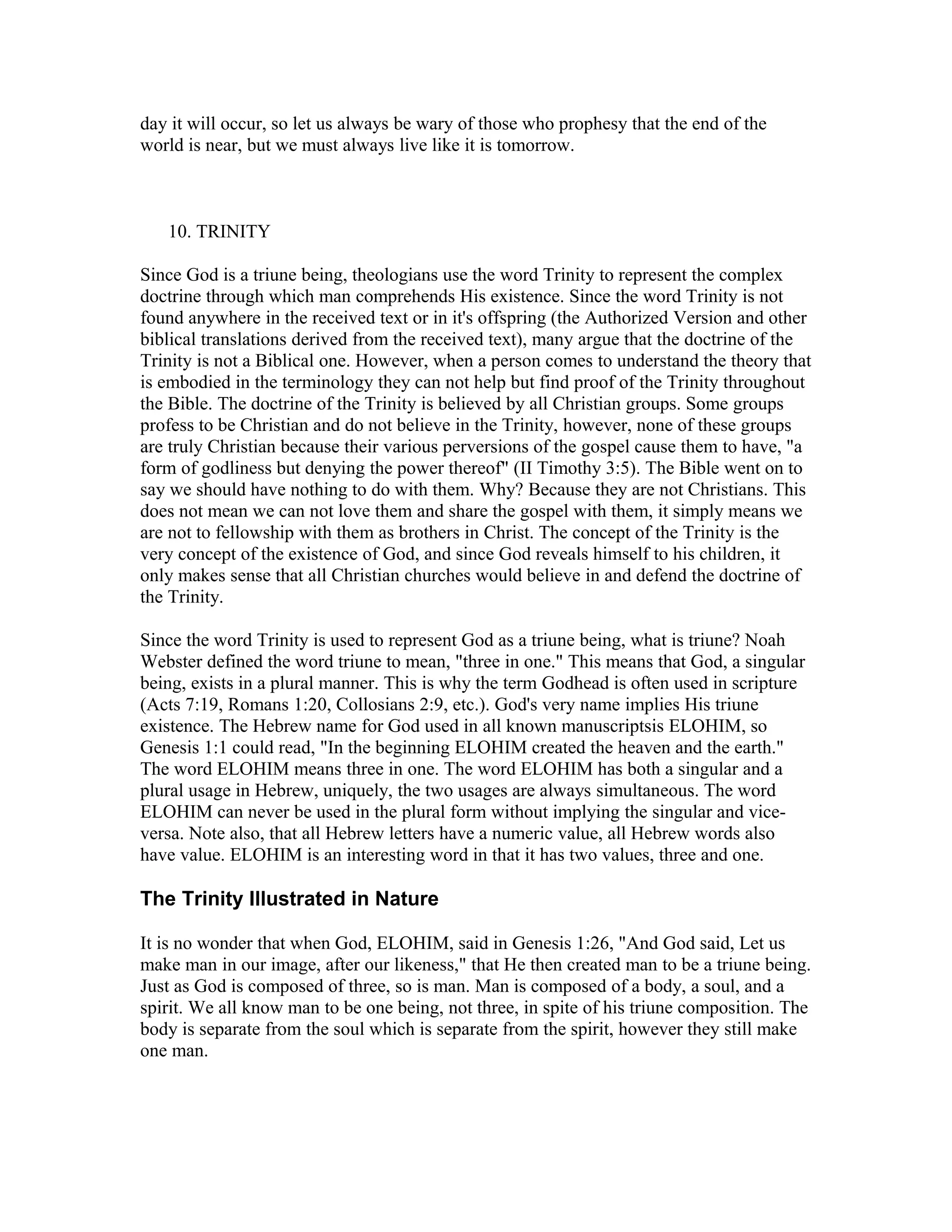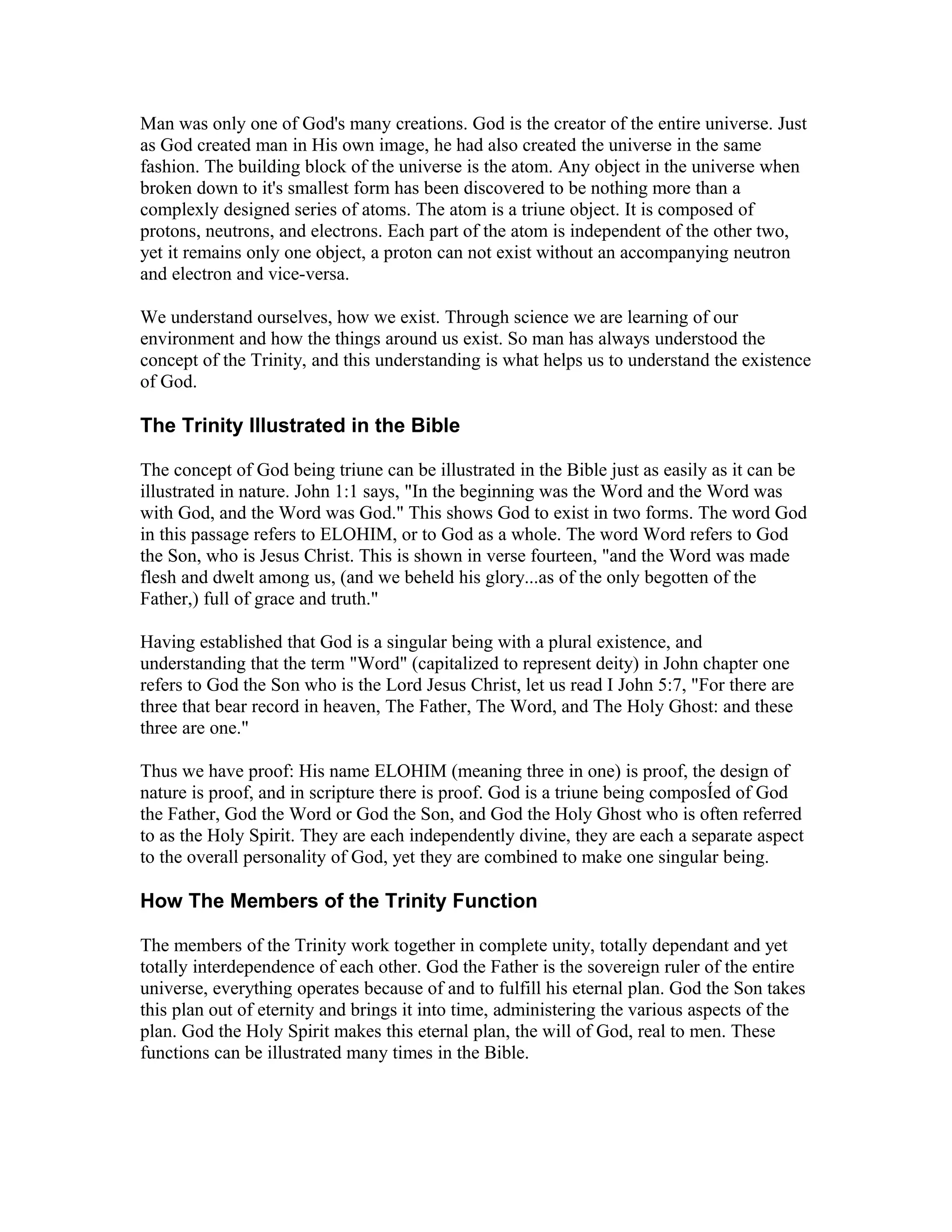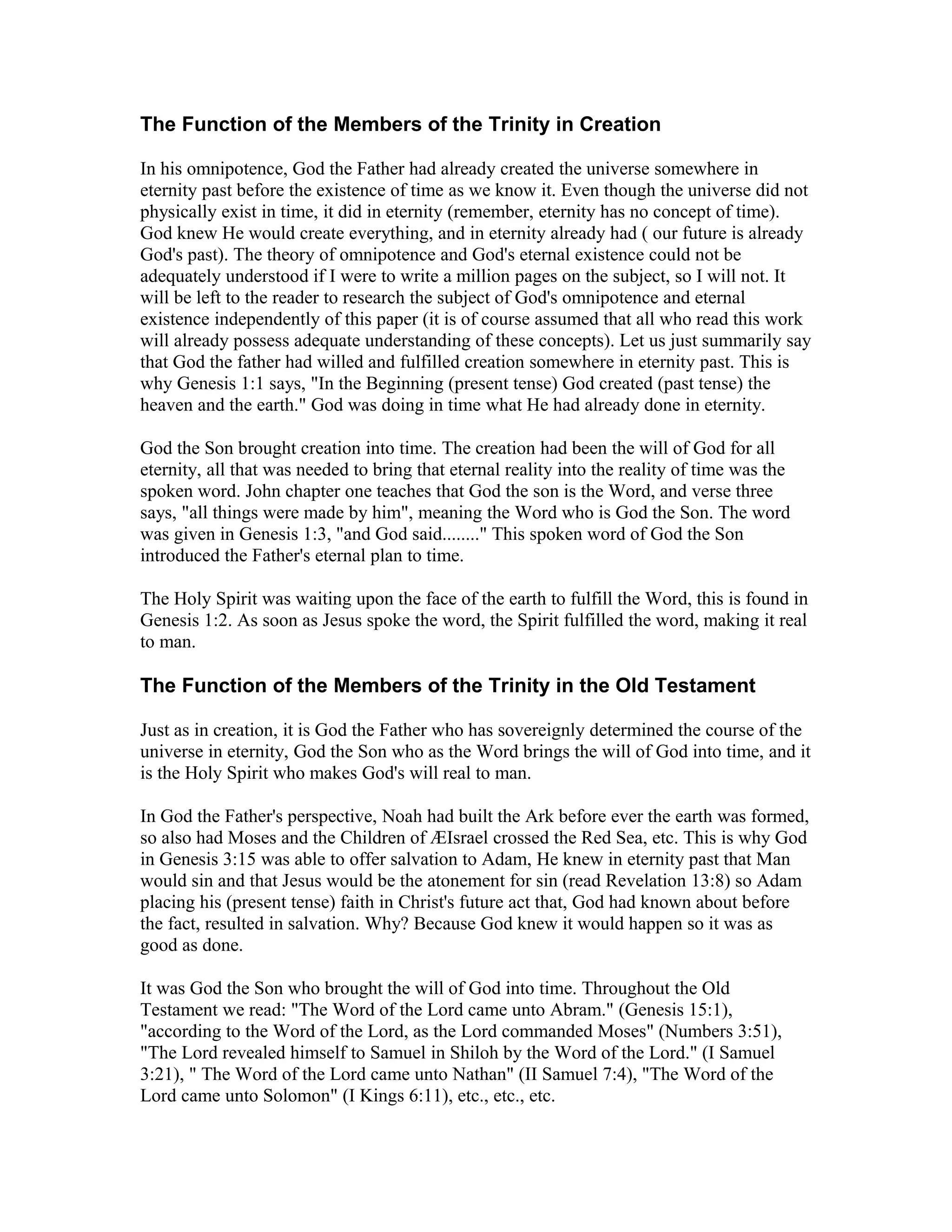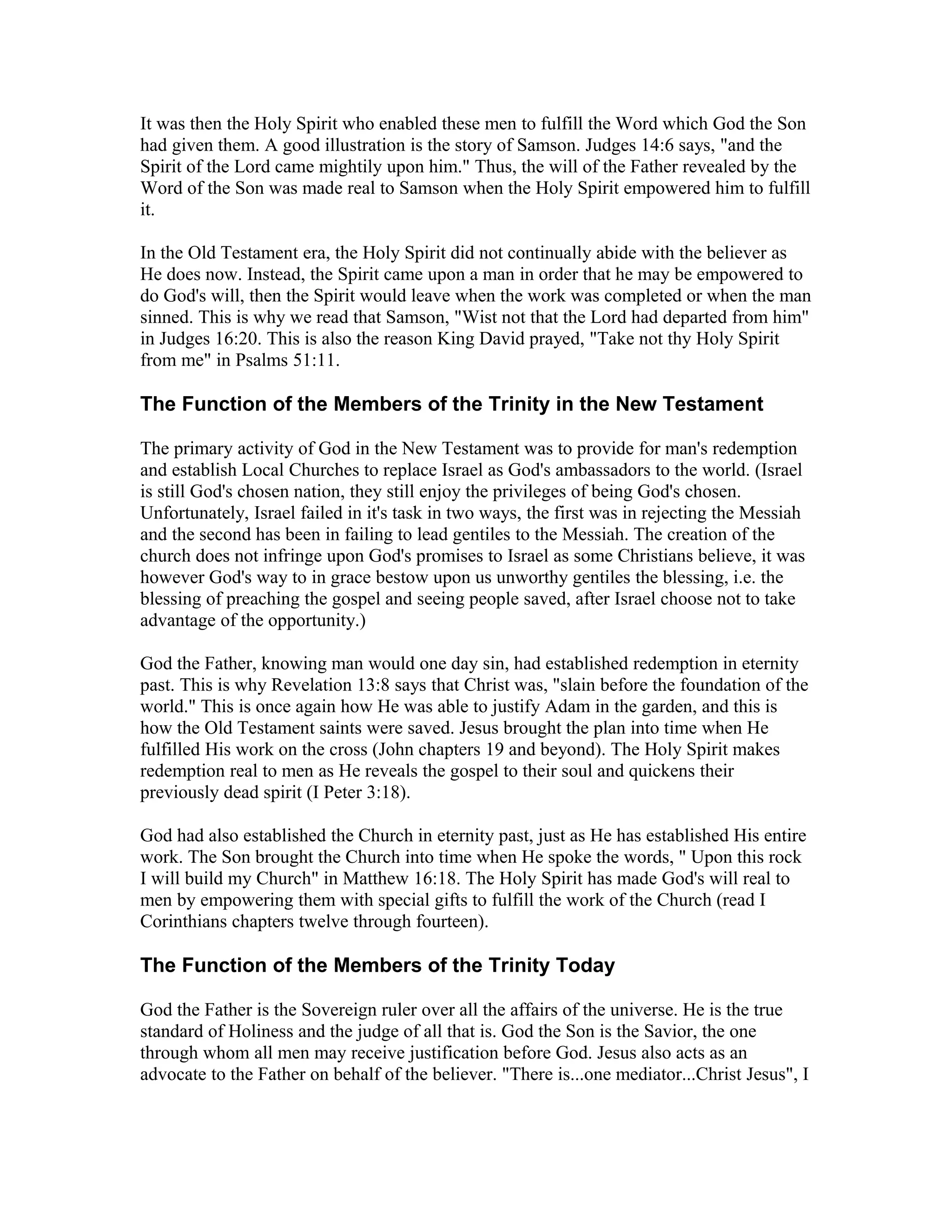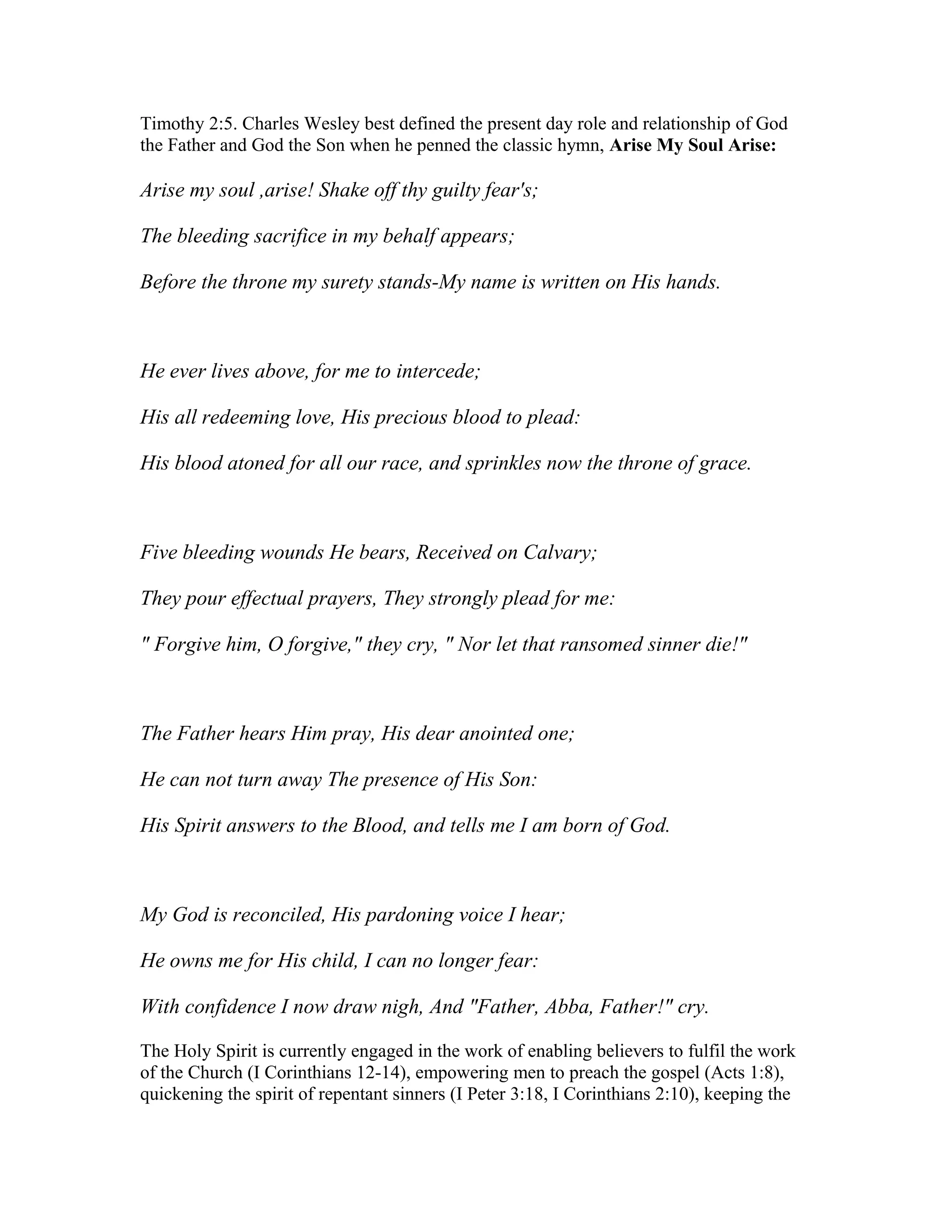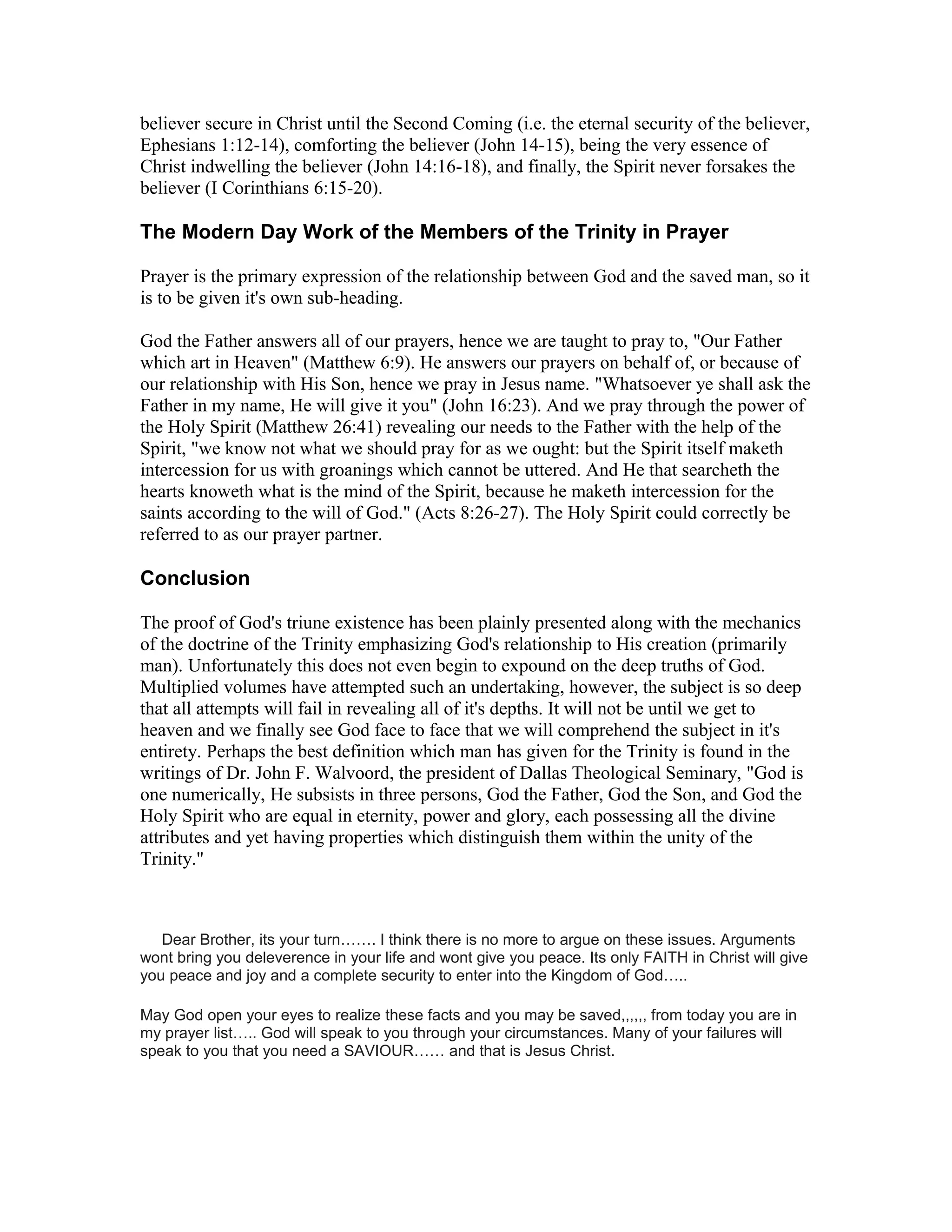The document discusses evidence that the Bible is historically authentic and factually reliable. It provides statistics on the number of manuscripts and time elapsed for other historical texts compared to the Bible. For the Bible, there are over 24,000 manuscripts dating back to the originals within 150 years, while other texts have fewer manuscripts and dates 900+ years after the originals. The document also discusses biblical prophecies and their fulfillment as additional evidence of the Bible's divine authorship. It argues that based on scientific evidence, the Bible can be accepted as authentic history and that its contents, including Jesus' life and miracles, likely occurred.

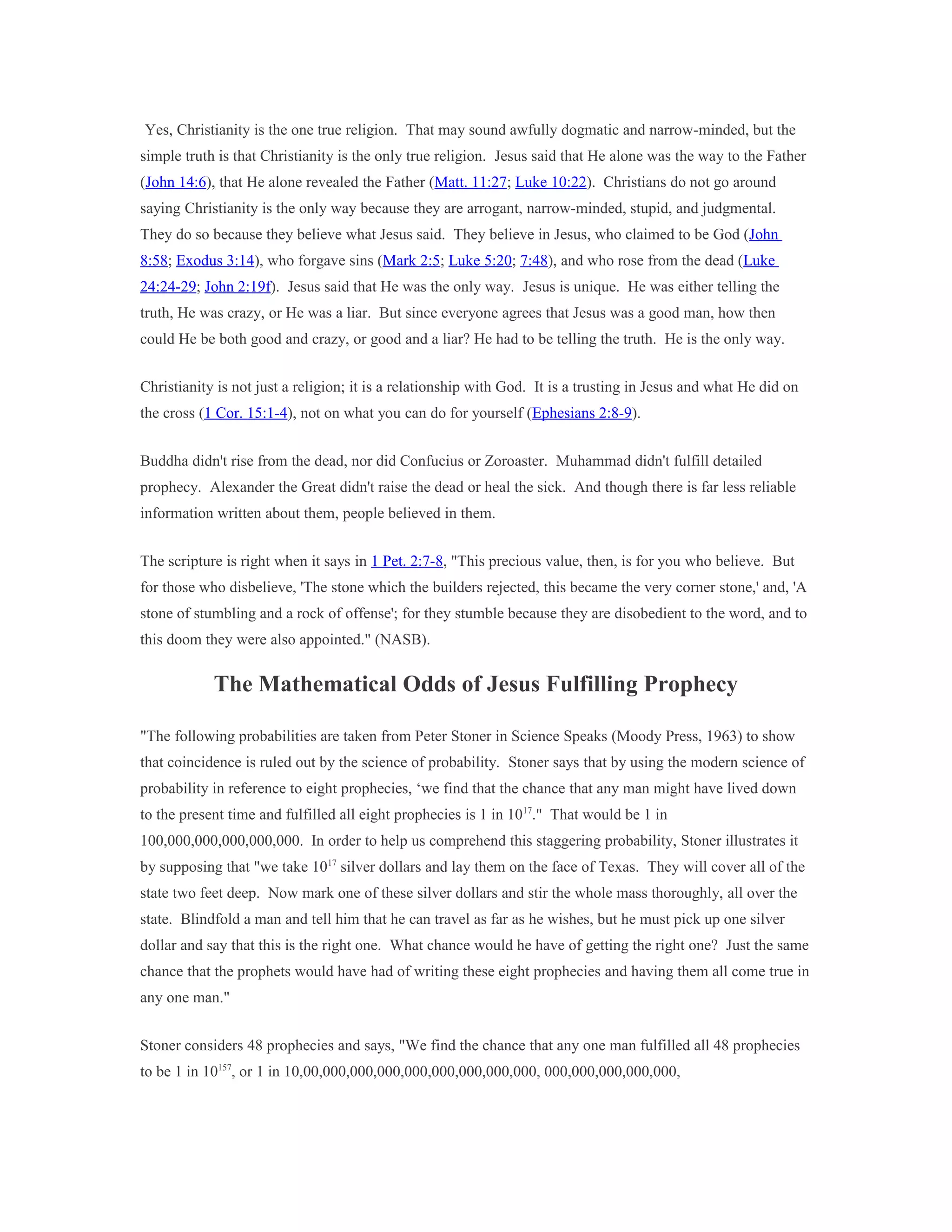
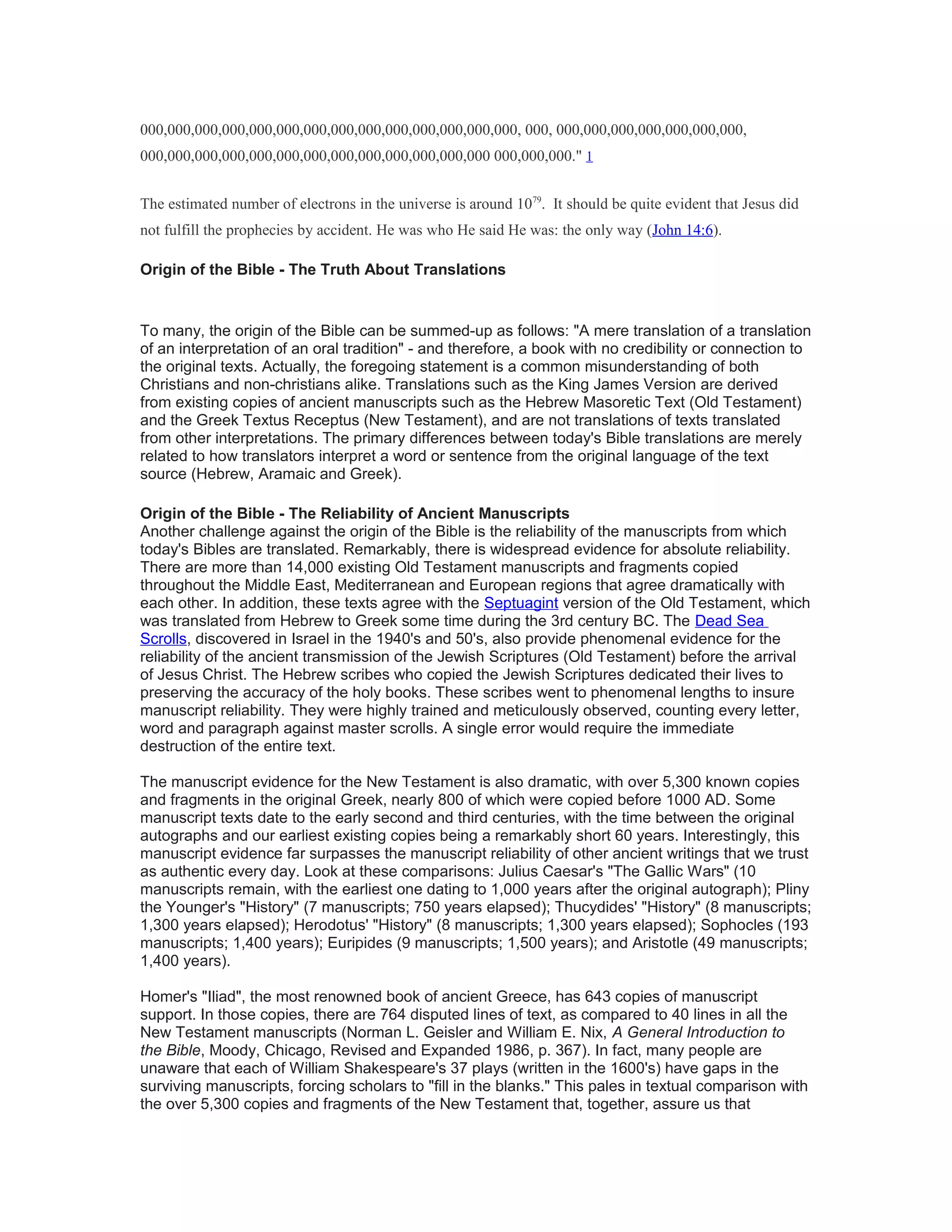
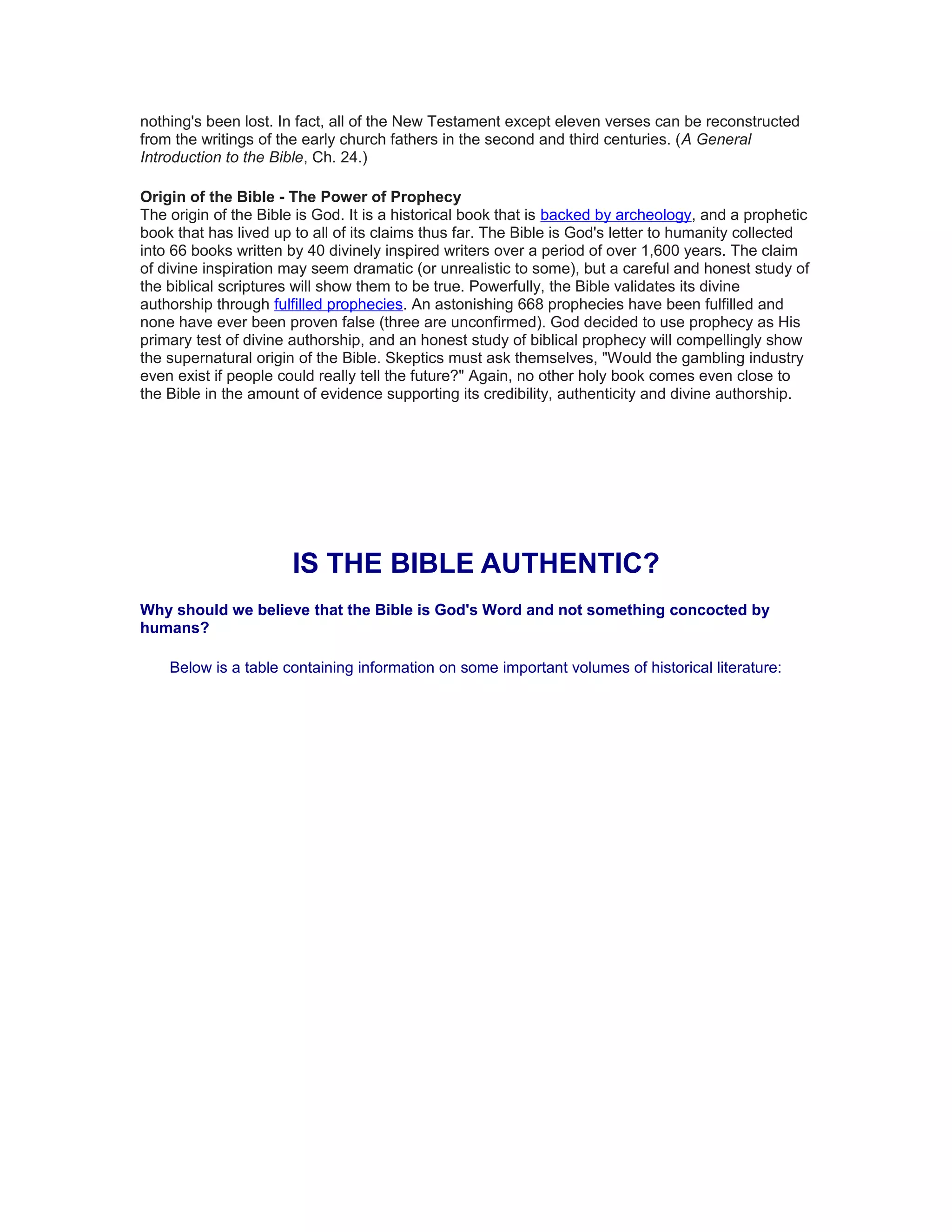
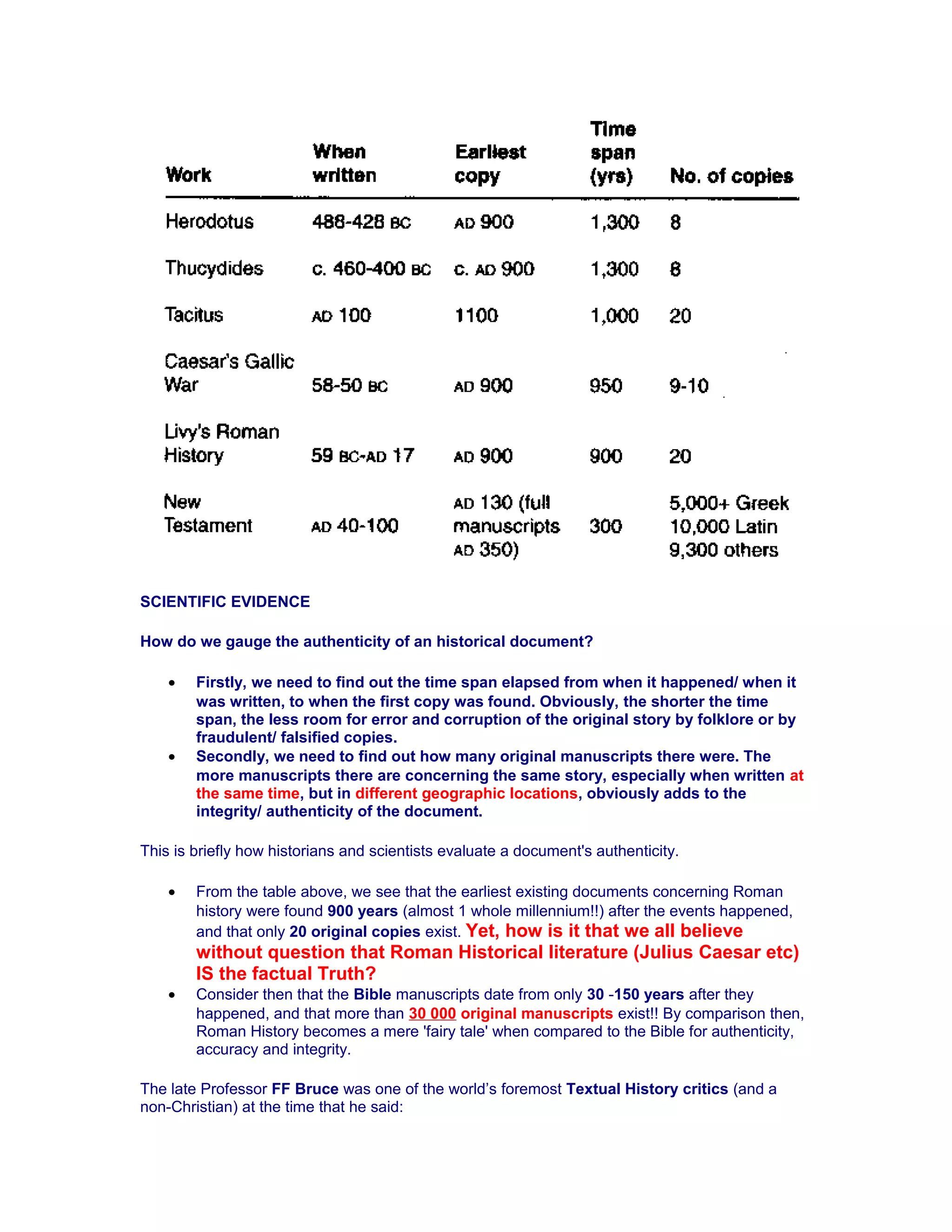
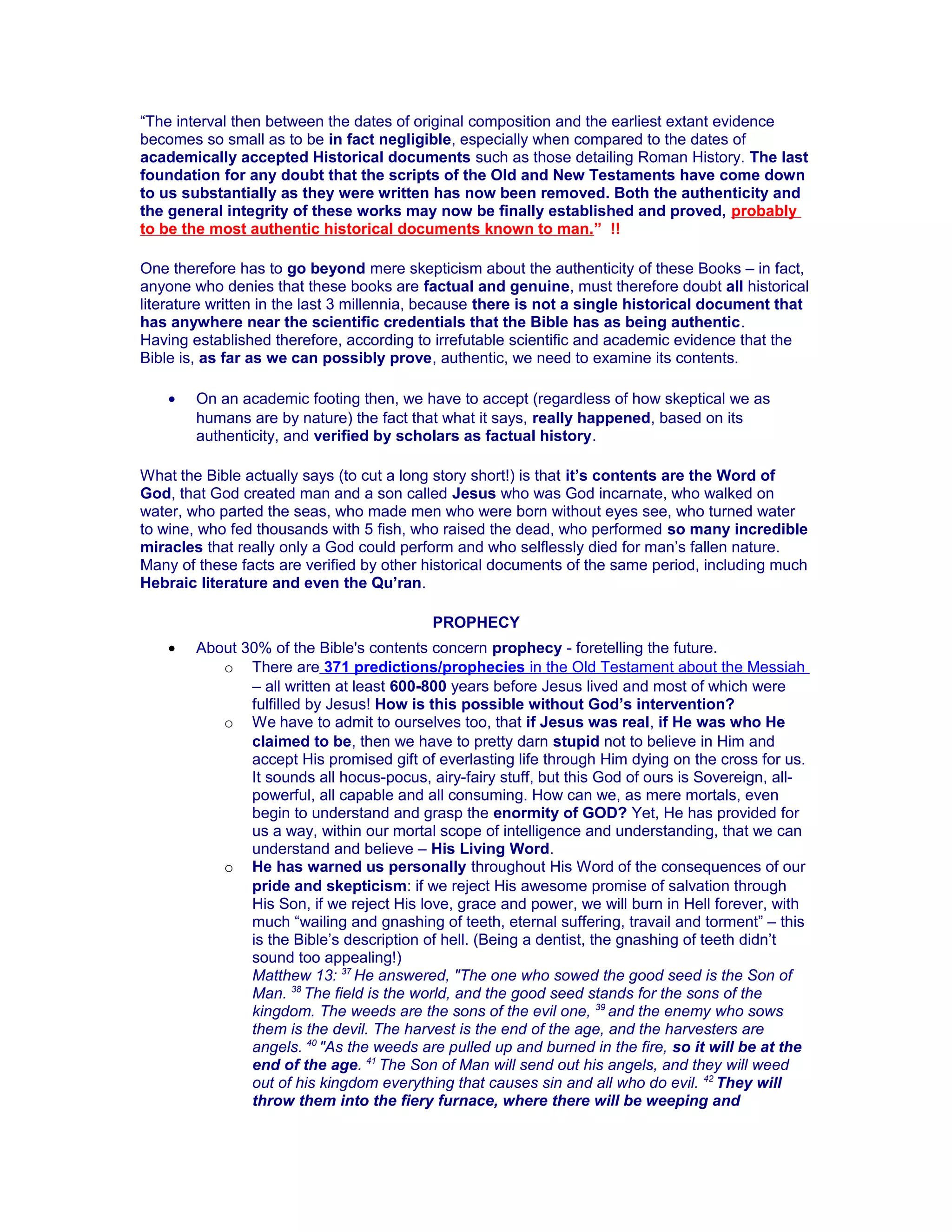
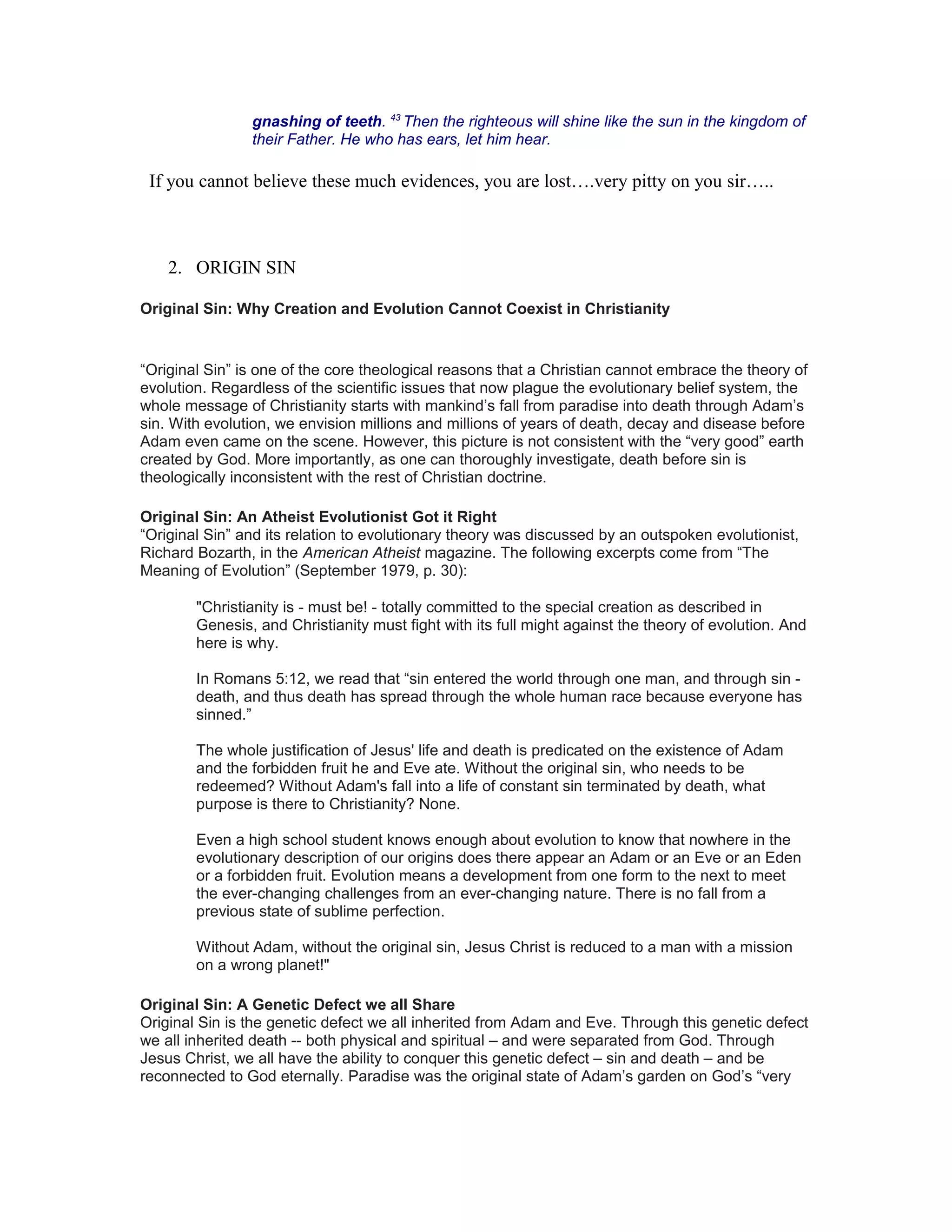
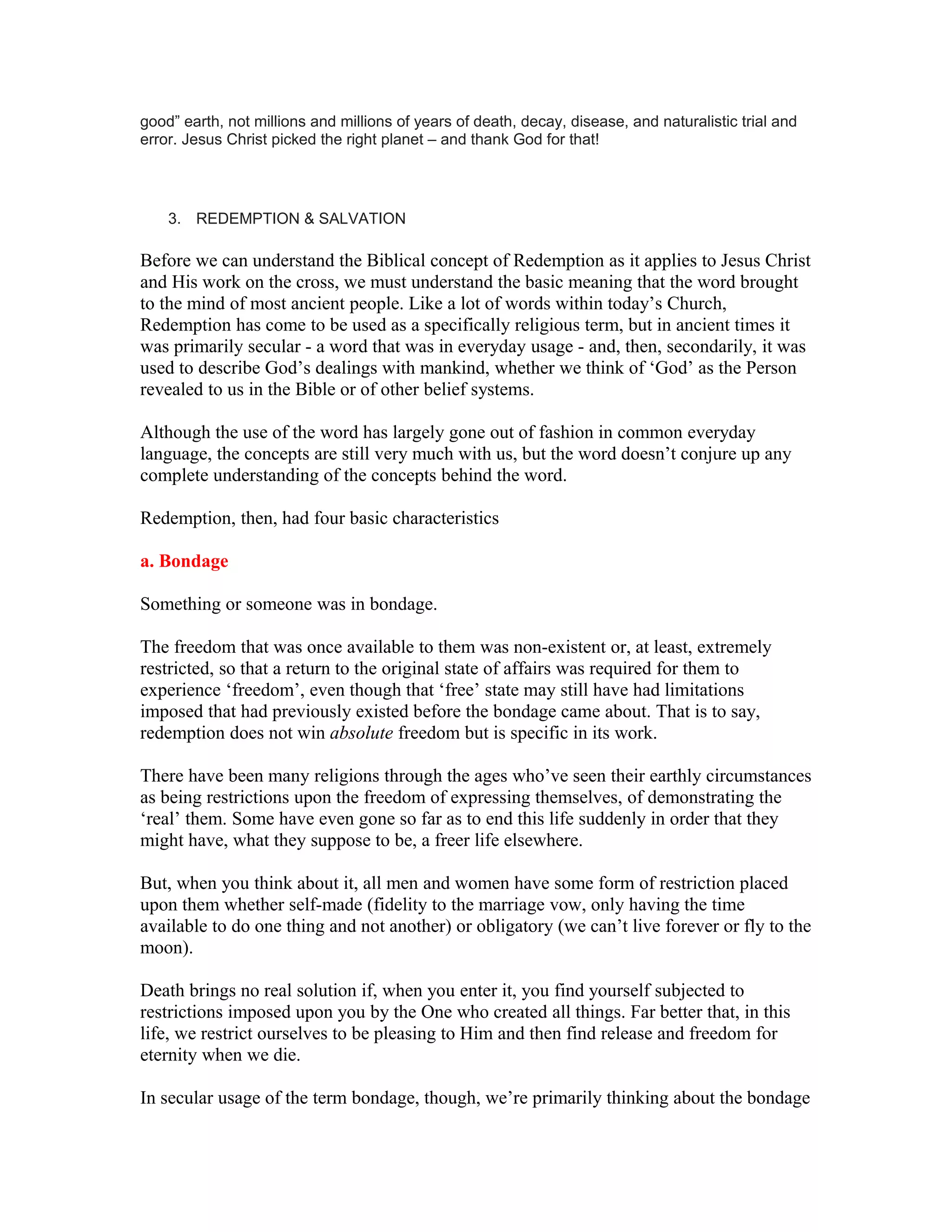
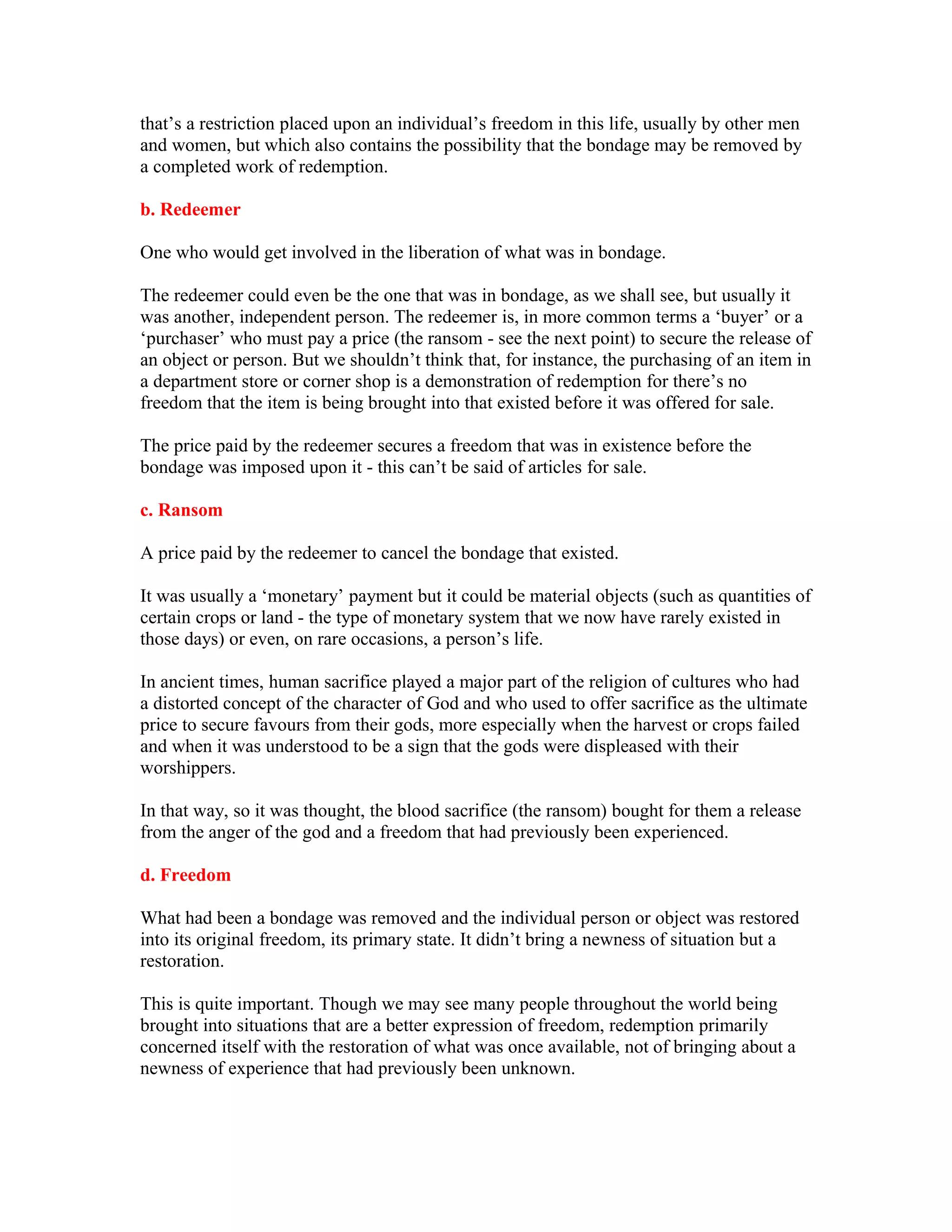
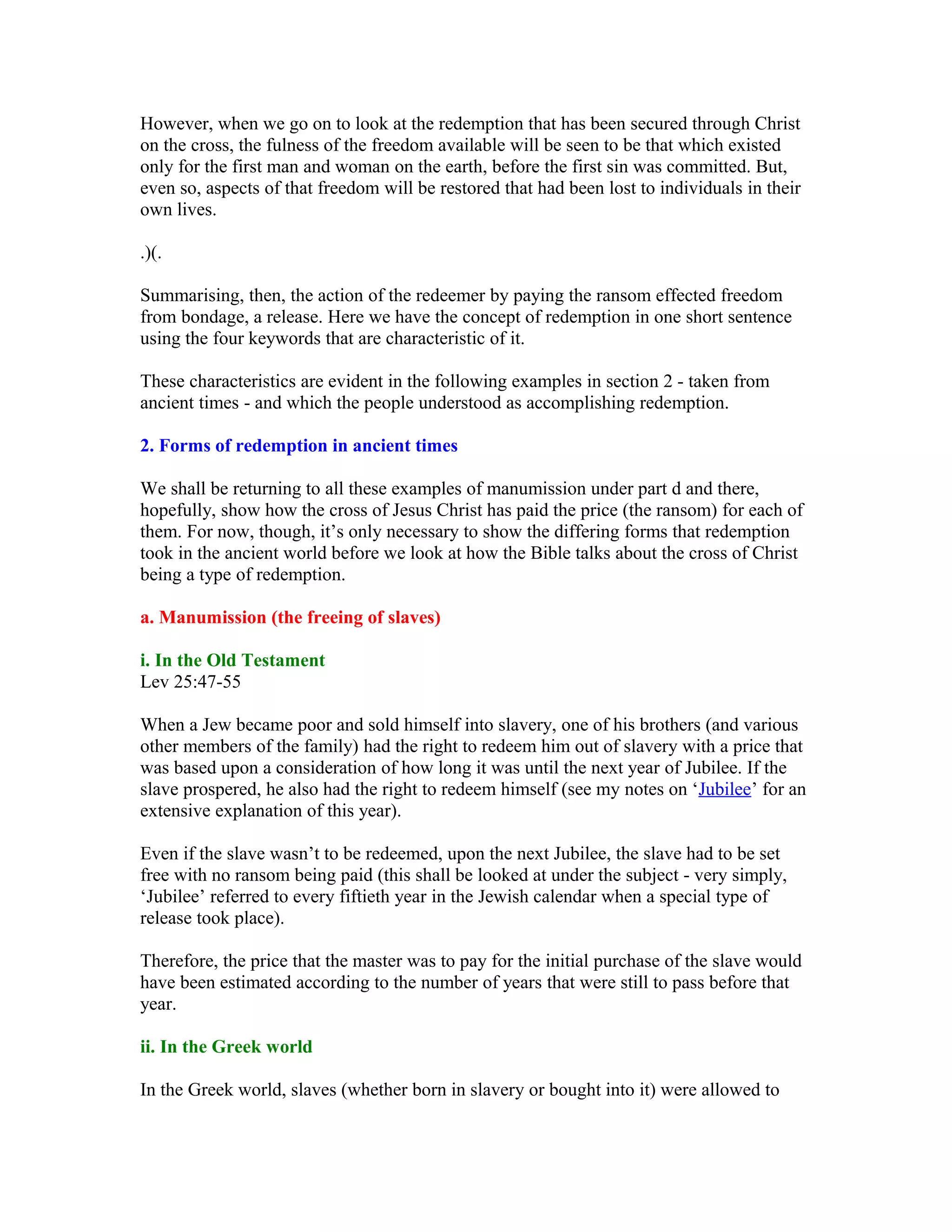
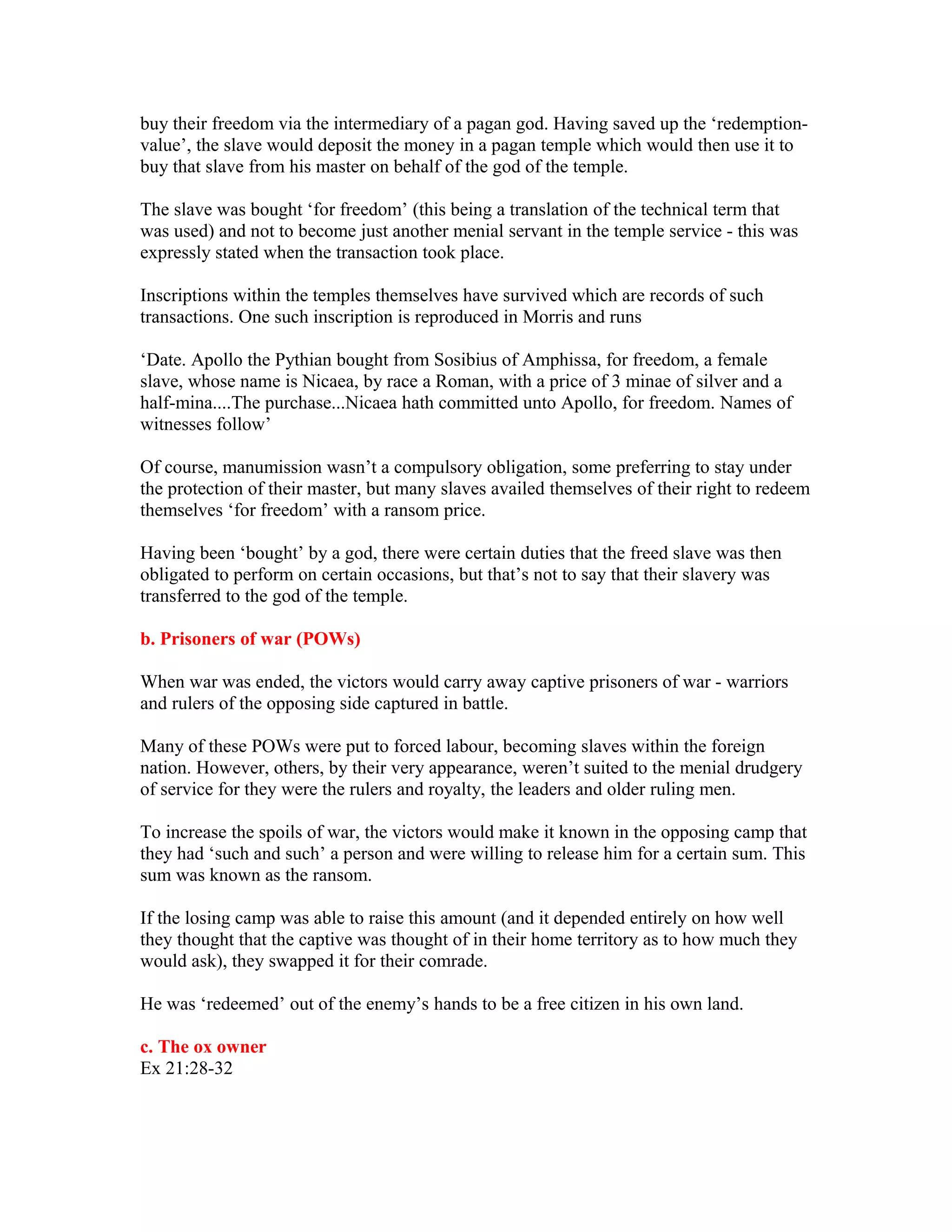
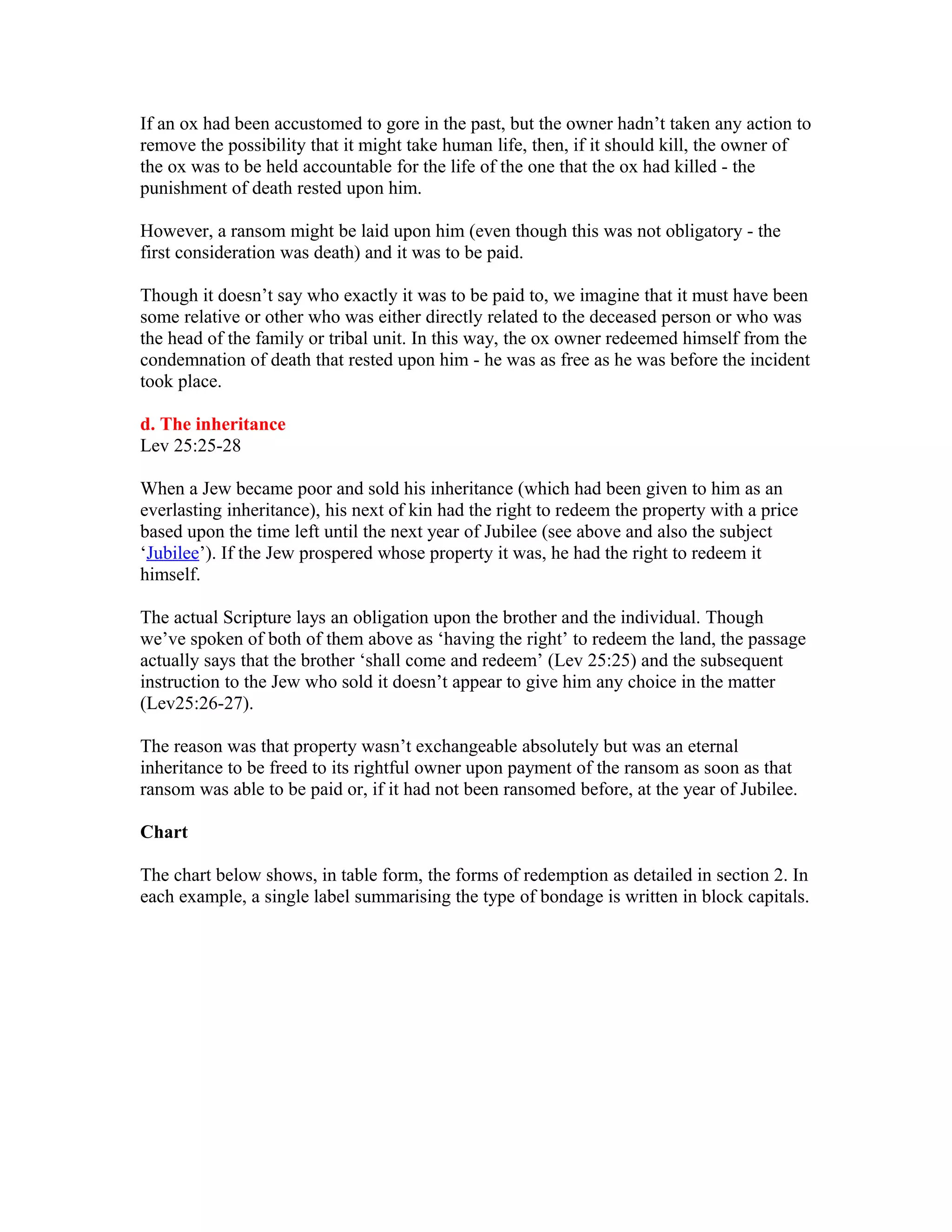
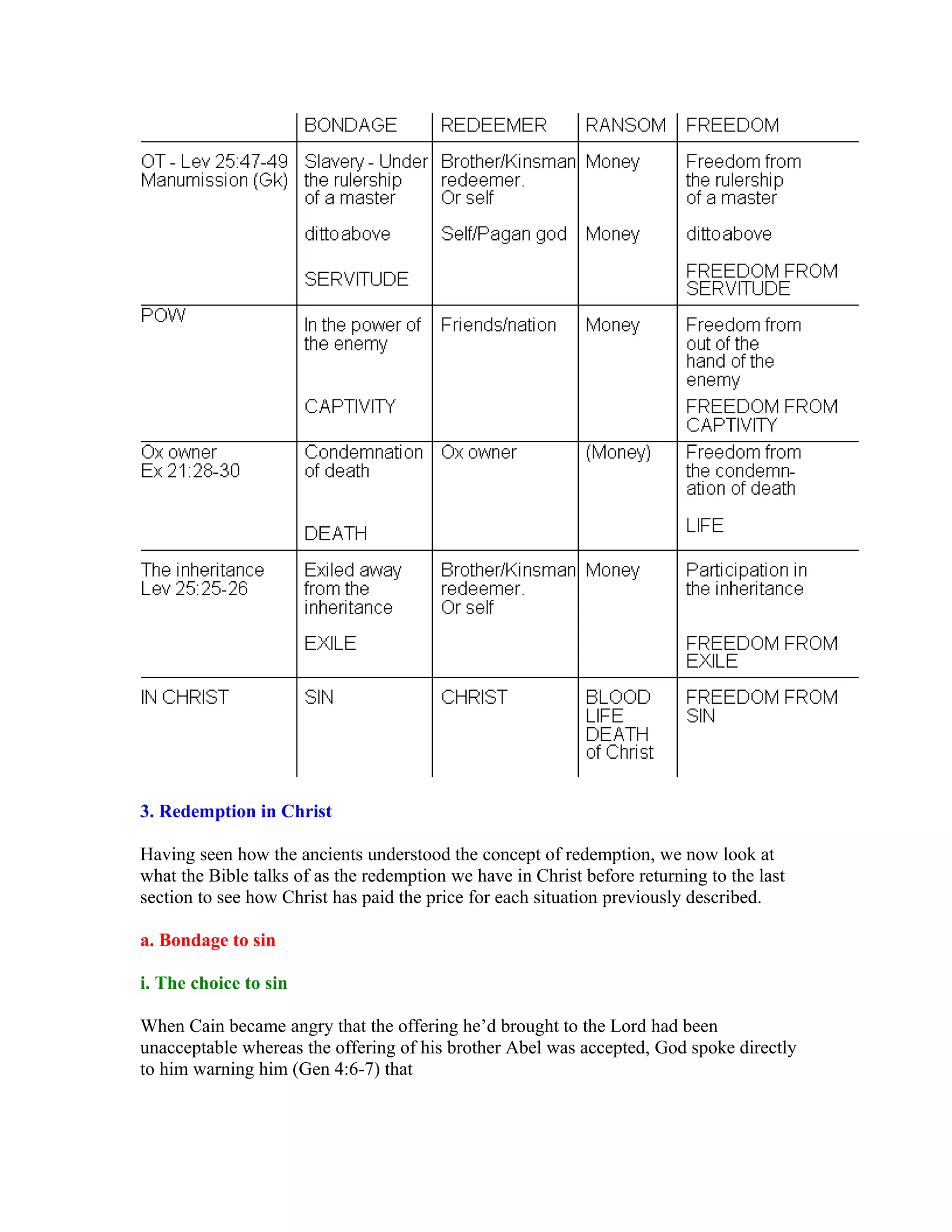
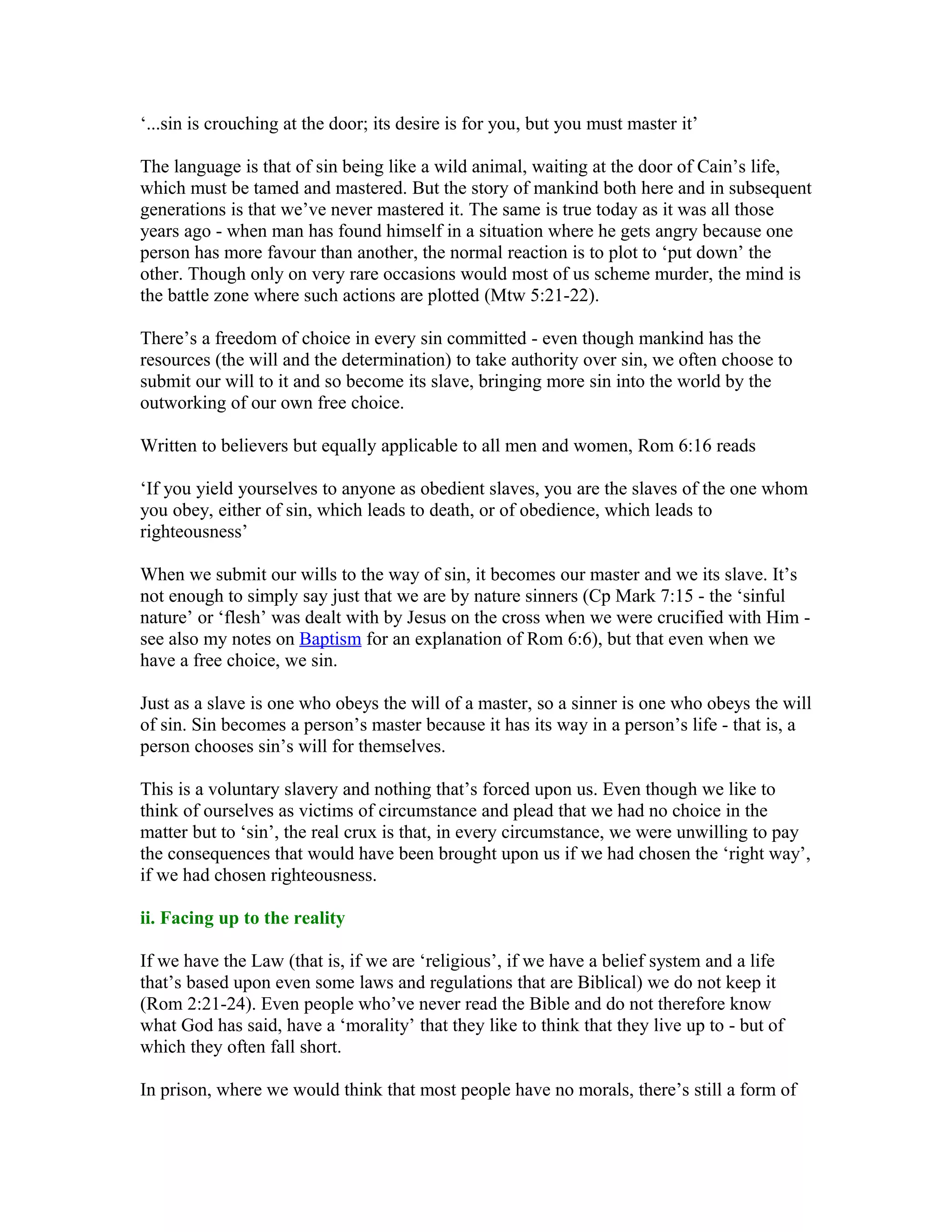
![moral code in the life of even the grossest individual (in the world’s eyes). But, still, what
little we think we are, we fail to be.
But, further than this, if we don’t have the Law (if we have no recognised moral code by
which we live our lives), even the ‘light’ we perceive about God we don’t live up to
(Rom 1:18-21ff). When individuals look around themselves and perceive what’s plainly
evident to them, they still suppress that truth and replace it by an image that doesn’t
resemble either the nature that we were created in or the nature of God (which, when all’s
said and done, are one and the same).
So, Paul can say with conviction (Rom 3:23 - in one of his ‘greatest hits’!) that
‘...all have sinned and fall short of the glory of God’
and that (Rom 3:9)
‘...we are all under the power of sin’
Man’s great problem is not that he’s living in bondage but that he won’t accept that he’s
in bondage.
When Jesus spoke to the Pharisees in the Temple at the Feast of Tabernacles about the
truth setting them free (John 8:31-34), they retorted with the statement (v.33)
‘...we are descendants of Abraham, and have never been in bondage to anyone...’
not realising the bondage to sin that Jesus had in mind. Therefore, He replied by pointing
out (v.34) that
‘...everyone who continues in [so the meaning] sin is a slave to sin’
By their reaction to Jesus’ words it’s obvious that the Jews present refused to
acknowledge the truth about themselves as individuals and corporately as a nation. But
the scenario is not one that just belongs to ‘then’ - each of us would like to see Jesus’
teaching as pointing to ‘him’ or ‘her’ but certainly not to ‘me’ or ‘us’ because that
convicts us of the situation that we’re in and begins to wake us up to the fact that we need
to change. Johntask writes
‘Man’s greatest need...is to know what is his greatest need’
That is, man needs to face up to the reality of his dilemma and not to rely upon any false
hopes or ideals, neither to mask the truth of his situation and try to rely upon false words,
lies and deceit.
Some people rely on doing good (hoping that somehow their good deeds may outweigh
the evil they do) or even on not being as bad as another (and we can always find some](https://image.slidesharecdn.com/238822738-apologetics-arguments-150913062852-lva1-app6892/75/238822738-apologetics-arguments-15-2048.jpg)
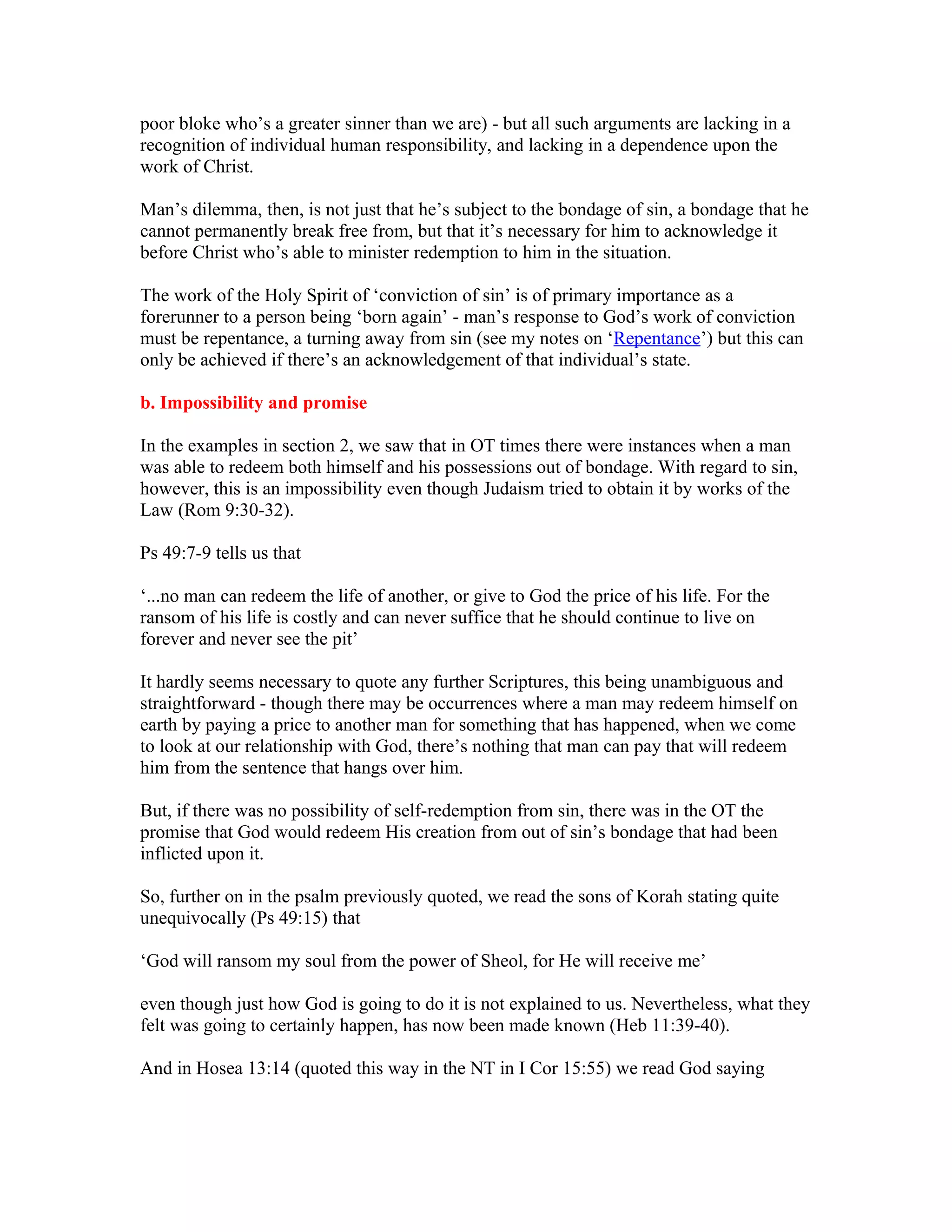
![‘I shall ransom them from the power of Sheol, I shall redeem them from death. O Death,
where are your plagues? O Sheol, where is your destruction?’
These verses speak of a redemption from the grave, from death, and don’t directly refer
to sin - but (I Cor 15:56)
‘the sting of death is sin...’
and (Rom 5:12)
‘...sin came into the world through one man and death through sin, and so death spread to
all men because all men sinned’
Death is spoken of as a direct consequence of sin in the Romans’ verse and we find the
same in James 1:14-15 which states that
‘...sin when it is full grown brings forth death’
The promise of a redemption from the bondage of sin necessarily deals with death, for
it’s in death that sin finally triumphs and keeps us eternally absent from the presence of
God. But, more than this, if sin is to be defeated, the curse of physical death must be
broken (Gen 3:19).
To defeat death, therefore, sin must be dealt with.
c. The Redeemer and the ransom
In this section, we’re going to simply look at the passages that use redemption imagery to
speak of the death of Christ and so begin to understand how the work of the cross can be
taken to have been a ransom paid that’s acceptable to God that frees men and women
from sin and its consequences.
There are three words that are spoken of as being the ransom (blood, death and life) and
we’ll list these first (my italics throughout) before going on to discuss their relevance.
i. Blood
Jesus shed His blood.
Eph 1:7-8 - ‘In [Christ] we have redemption through His blood, the forgiveness of our
trespasses [that is, sin], according to the riches of His grace which He lavished upon us’
Rev 5:9 - ‘...[the Lamb] was slain and by Thy blood didst ransom men for God from
every tribe and tongue and people and nation...’
I Peter 1:18-19 - ‘...you were ransomed from the futile ways inherited from your fathers
[that is, legalistic observance/Oral law = self-redemption]...with the precious blood of
Christ, like that of a lamb without blemish or spot’
Acts 20:28 - ‘...the Church of God which He purchased with the blood of His own Son’](https://image.slidesharecdn.com/238822738-apologetics-arguments-150913062852-lva1-app6892/75/238822738-apologetics-arguments-17-2048.jpg)
![ii. Death
Jesus died on the cross.
Heb 9:15 - ‘...a death has occurred which redeems them from the transgressions under the
first covenant [that is, the people before Christ came]’
The penalty of sin, under the Law, is death - spiritual and physical. Jesus took that death
upon Himself, so paying the price for our freedom.
iii. Life
Jesus gave His life.
Mark 10:45 - ‘...the Son of man came...to give His life as a ransom for many’
.)(.
‘Blood’, ‘Death’ and ‘Life’ are the three words that are used to describe the sacrificial
offering of Christ to God on the cross. ‘He shed His blood’, ‘He gave His life’ and ‘He
died on our behalf’ are three phrases which are synonymous - if you lay down your life
by the shedding of your blood, you die. They’re so integrated in their meaning that we’re
virtually saying the same thing no matter which one of the three words that we choose to
use.
Jesus owned no land or property that we know of (though, as head of Joseph’s family,
there may have been a small allocation of land where they grew some crops), neither did
He have any riches or personal possessions that were of any great worth, so He gave the
one thing that He did have in exchange for mankind’s salvation - Himself.
We read, therefore, that (Titus 2:14) Jesus
‘...gave Himself for us to redeem us from all iniquity’
Jesus had nothing else to give us but Himself. Jesus is both our ransom and our Redeemer
and, more than this, redemption is only found in Him even though we may try and find it
elsewhere and in different people who now exist or who have existed throughout history
(Rom 3:23-24, Acts 4:12).
Therefore, this believer’s claim is quite shocking in our modern society that likes to court
the favour of many gods and see in each and every religion a way to God that’s both
relevant and acceptable. The Bible says ‘not so’ and becomes offensive to a lot of its
readers.
On the cross, Jesus was made to be sin even though He knew no sin - He knew what sin
is but He knew no sin by experience, He hadn’t committed sin (II Cor 5:21).](https://image.slidesharecdn.com/238822738-apologetics-arguments-150913062852-lva1-app6892/75/238822738-apologetics-arguments-18-2048.jpg)
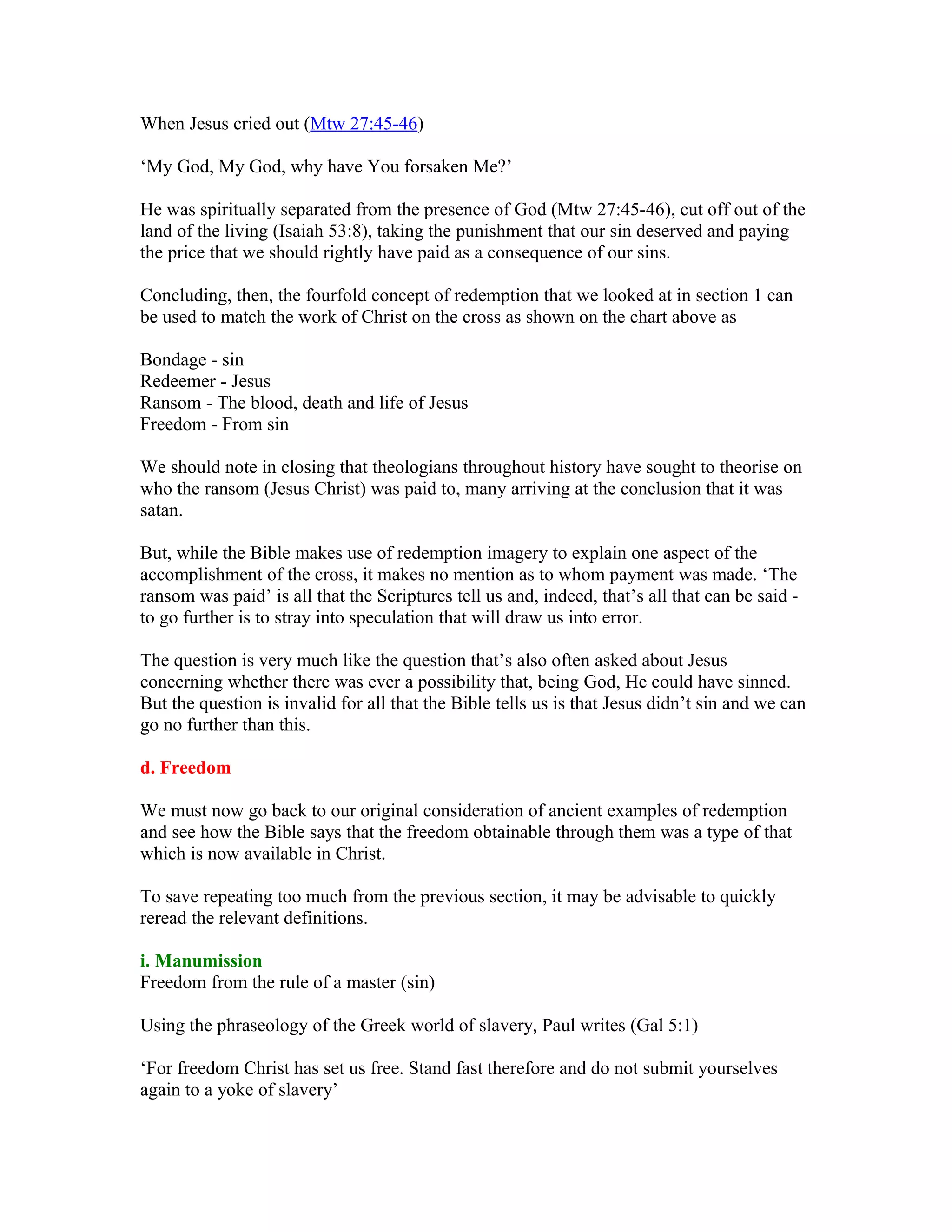
![where the ‘yoke of slavery’ mentioned is a reference to the legalistic observance of a
written code - that is, self-redemption. Just as the pagan temple bought a slave ‘for
freedom’, so the imagery is the same - God has bought a people (I Cor 6:20, 7:23, II Peter
2:1) ‘for freedom’.
Yet, just as the Greek slave was obligated to perform certain duties and functions towards
the god that had bought him, so we also have become slaves of God, responding to His
love in Christ through our initial commitment to give our lives over to Him but also from
that moment onwards being obedient to the will of Him who bought us.
Therefore Paul writes (Rom 6:18) that
‘...having been set free from sin, [we] have become slaves of righteousness...’
and that (Rom 6:22)
‘...you have been set free from sin and have become slaves of God...’
It’s very easy to read passages like these from a modern viewpoint and so fail to miss the
depth of what Paul is actually trying to convey to us. We can think of freedom in abstract
or real terms but don’t often make the connection that the culture that it sprang from
already had a procedure in place that Jesus became the ultimate solution for.
Though the NT writers never did campaign to abolish physical slavery in their day (and
they would probably not have got very far had they done so!), they nevertheless did
proclaim that the real slavery of mankind is to sin and that true freedom can only be
experienced when it’s dealt with through the cross of Christ.
So, if we’re ‘in Christ’, then we’re free from sin (the master) and free from any effort on
our part to redeem ourselves and yet, at the same time, obligated to be obedient to the
God who bought us out of that state.
ii. Prisoners of War (POWs)
Freedom from out of the hand of the enemy (sin)
Mankind’s enemy is sin, which separates us from the reality of God’s presence and
everything that goes with Him (Isaiah 59:2). It’s often asserted that satan is the real
enemy but, in the context in which we’re considering redemption, he shouldn’t be
misconstrued as such.
Having been set free by Christ from sin’s power and dominion over us, we’re back on
God’s side and back in God’s army, residing in His camp. When Jesus says (Luke 4:18)
‘He has sent Me to proclaim release to the captives’](https://image.slidesharecdn.com/238822738-apologetics-arguments-150913062852-lva1-app6892/75/238822738-apologetics-arguments-20-2048.jpg)
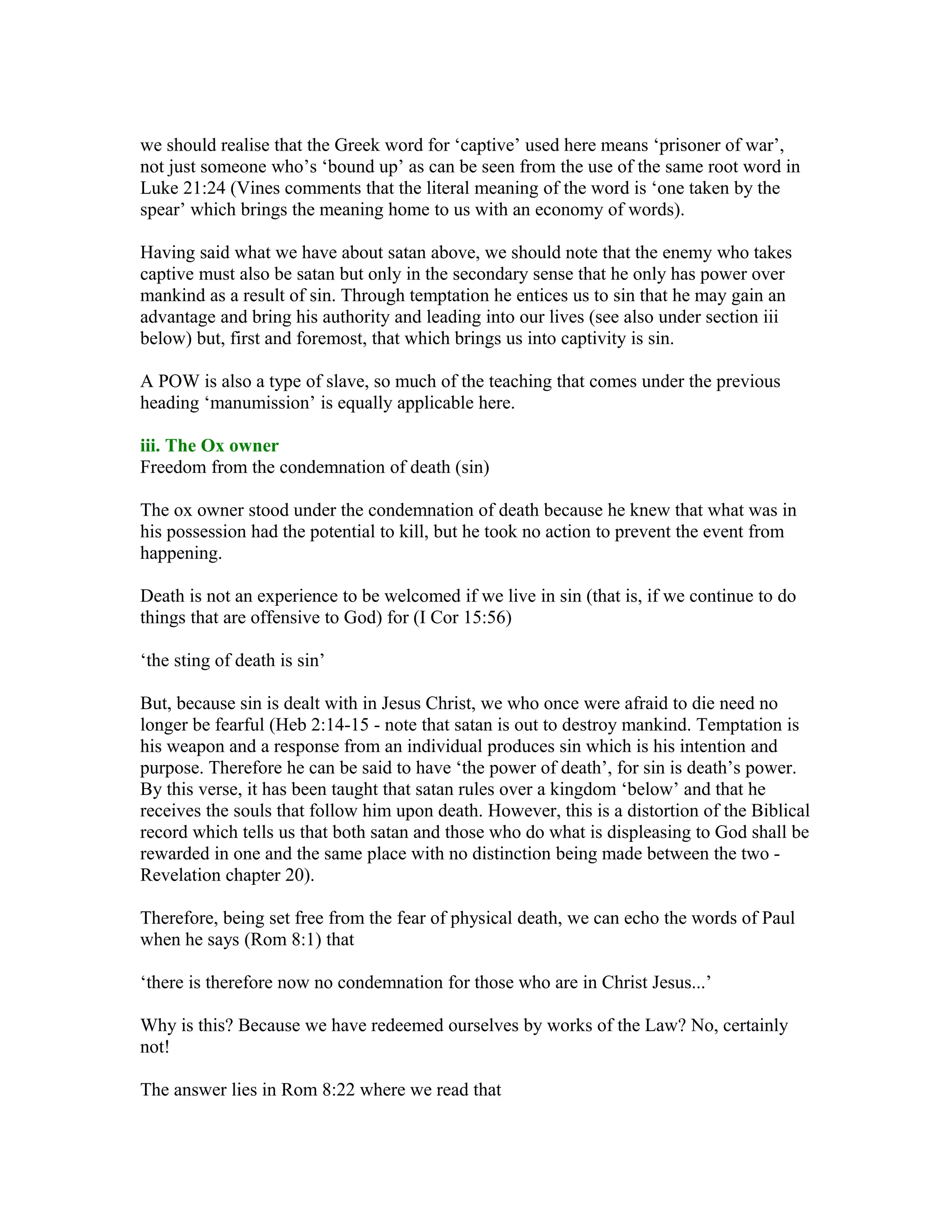
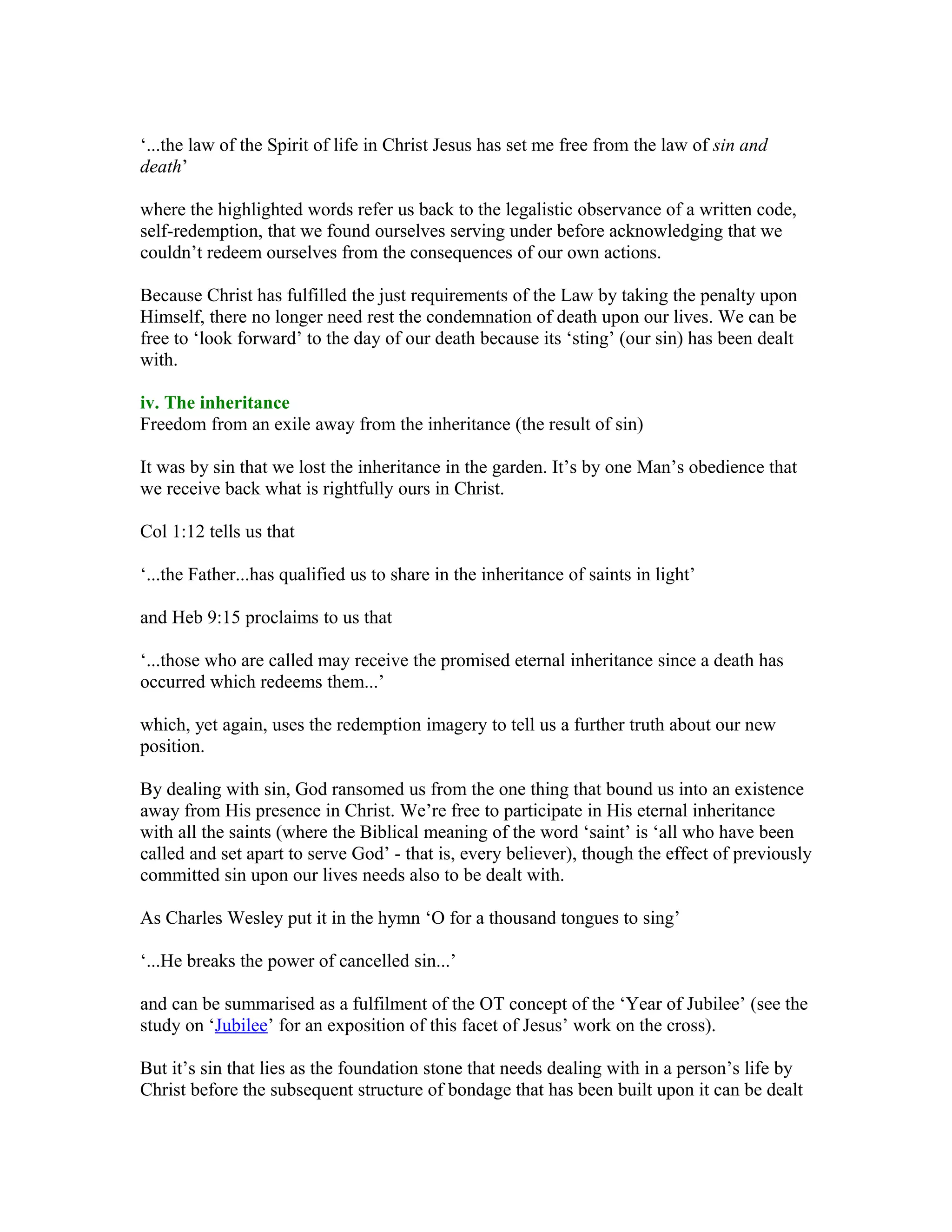
![with.
Conclusion
Concluding this study on redemption, we should realise not just that the Bible presents
Jesus as the Redeemer who pays Himself as the ransom to redeem mankind from the
bondage of sin but that, when the early Church tried to express the work of the cross in
realistic terms to the society in which they lived, they did so in language that was secular
and didn’t employ purely religious terms that were specifically christian and which the
ordinary man in the street would have failed to understand.
In each and every generation, the challenge of presenting the Gospel to society is not to
use language that’s largely ignorant of everyday English usage but to use words and
concepts that mean something to the normal man in the street.
4. SALVATION
DEFINITION AND NECESSITY OF SALVATION
sal•va•tion (sal vâ/shen), n. [ME. salvacioun; OFr. sauvation; L. salvatio < salvatus,
pp. of salvare, to save], 1. a saving or being saved; preservation from destruction; rescue.
2. a person or thing which is a means, cause, or source of preservation or rescue. 3. in
theology, spiritual rescue from sin and death; saving of the soul through the atonement of
Jesus; redemption.
In Christian doctrine, salvation is a rescue or deliverance of humanity from a
specific condition and from a specific destination. Salvation presumes that there
is a danger, jeopardy, peril or life threatening hazard from which rescue must be
accomplished on an imminent basis.
The CONDITION from which humanity must be rescued:
1. Separation from the Creator/God of humanity.
2. Such separation from the Creator/God occasioned by the sinful actions of
all humanity (by disobeying and ignoring the commands of the
Creator/God), both in congress and individually.
The DESTINATION from which humanity must be rescued::
1. The sinful human actions necessitate that the Creator/God pronounce a
judgment on all humanity as a punishment for those actions taken.
2. Such punishment being separation from God, and assignment in company
with Satan and all his followers in the region of Hell.
3. Such assignment to be eternal in nature, never to be reconsidered,
changed or revoked.
THE REASON FOR THE CONDITION OF HUMANITY
In Relation To The Federal Heads Of The Human Race - Adam and Eve.](https://image.slidesharecdn.com/238822738-apologetics-arguments-150913062852-lva1-app6892/75/238822738-apologetics-arguments-23-2048.jpg)
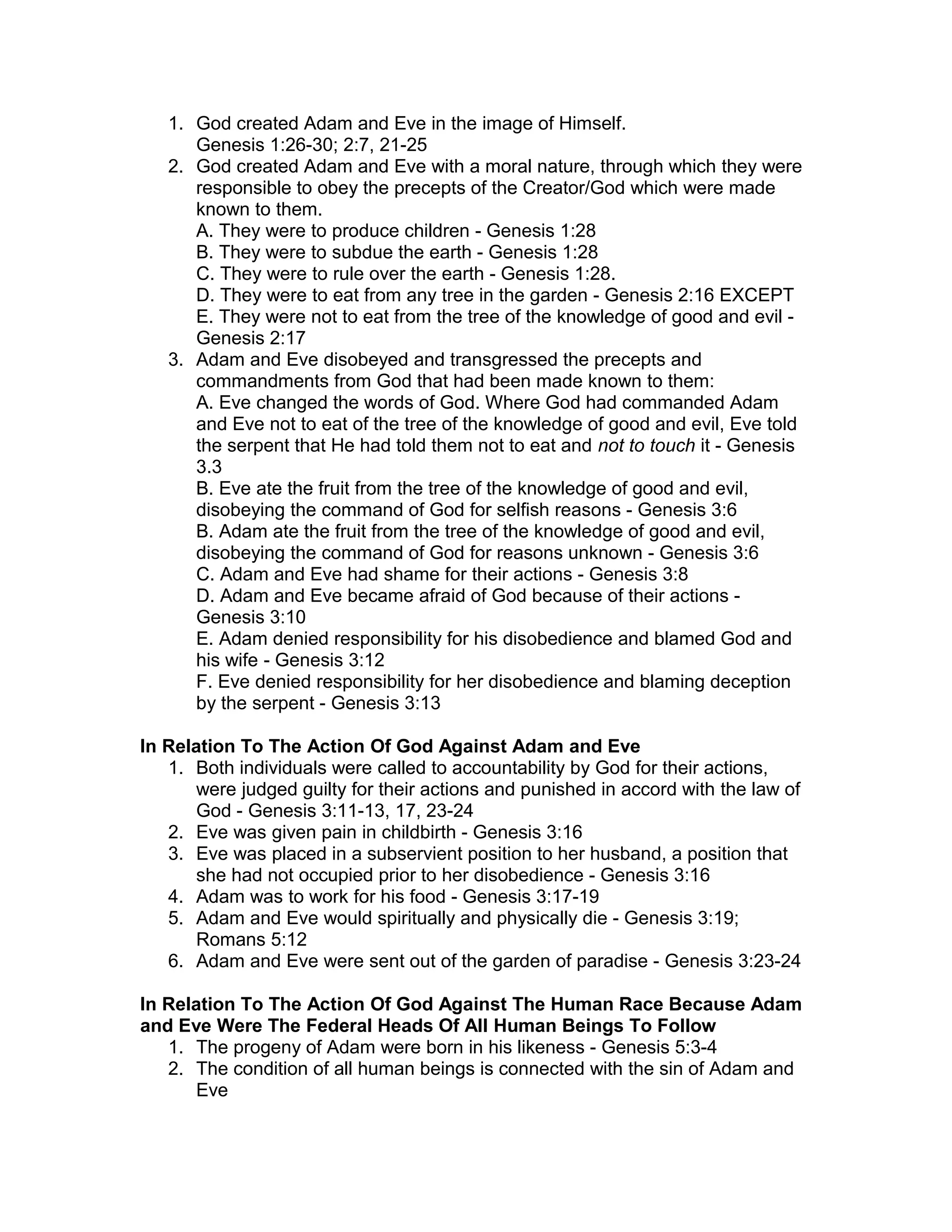
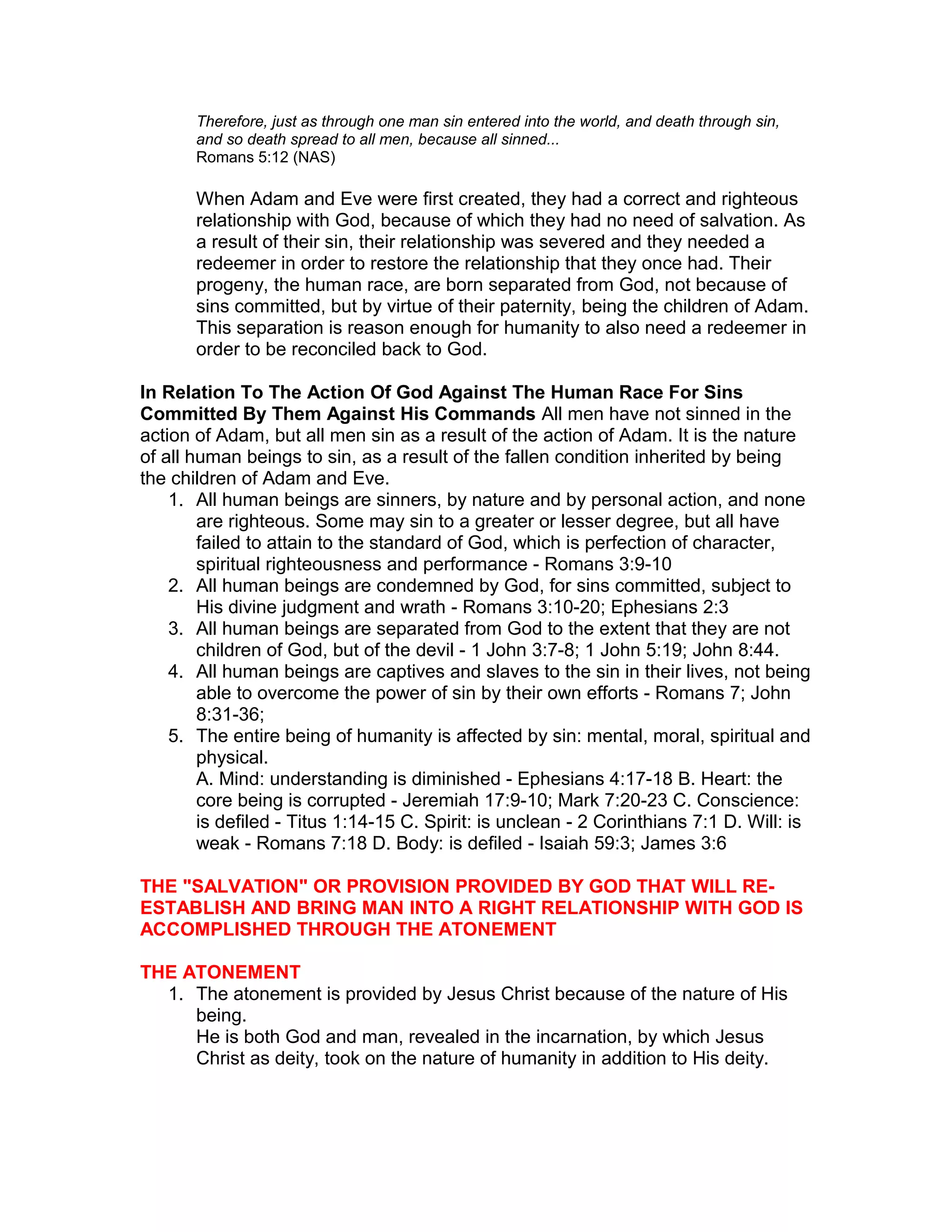
![And the Word [Jesus Christ] became flesh, and dwelt among us, and we saw His glory,
glory as of the only begotten from the Father, full of grace and truth.
The Holy Bible, John 1:14 (NAS)
While Christ as God was uncreated and eternal, the word "became" emphasizes Christ's
taking on humanity. This reality is surely the most profound ever because it indicates that
the infinite became finite; the Eternal was conformed to time; the Invisible became
visible; the supernatural One reduced Himself to the natural. In the incarnation, however,
the Word did not cease to be God, but became God in human flesh, i.e., undiminished
deity in human form as a man.
"The MacArthur Study Bible", John MacArthur editor, commentary on John 1:14
2. The atonement is provided by Jesus Christ because of His sinless life.
He [God] made Him [Jesus Christ] who knew no sin to be sin on our behalf, so that we
might become the righteousness of God in Him.
The Holy Bible, 2 Corinthians 5:21 (NAS)
In order to redeem man from sin, He had to be free from any evil taint of humanity. Had
He committed only one sin, He would have been disqualified as the Redeemer of sinful
men, Perfect Himself, Christ professed the highest conceivable standard of character
and conduct for His followers, "Be ye therefore perfect."
"All The Doctrines Of The Bible", Herbert Lockyer, Zondervan, 1964, p. 48
3. The atonement is provided by Jesus Christ because of His voluntary death
on the cross.
THE REASON FOR HIS DEATH
AS A RANSOM
Sin places humanity into a state of captivity from which a price must be
paid in order that a person might be redeemed or purchased out of that
state. The state of captivity, brought about by the sinful condition of
humanity, is like a slave market where people are sold as the possession
of the purchaser, and in order to be free, the slave must pay for a release
or deliverance; this is a ransom. Humanity is "sold under sin" (Romans
7:14) and therefore fall under the judgment of God. The judgment has
already been pronounced by God and the penalty is death, both physically
and spiritually. The death of Jesus Christ is the ransom paid in order to
redeem the human race from the penalty of sin. The ransom is paid to
God, as a payment for the release of humanity from the penalty of their
sinful state. (cf. Matthew 20:28, 1 Peter 1:17-19, 1 Timothy 2:5-6,
Galatians 3:13)
AS A PROPITIATION
The justice of god demands that a penalty for sin be paid, but is Jesus
Christ as a propitiation that satisfies the justice of God and allows Him to
forgive sinful human beings through His mercy and grace.
Crucial to the significance of Christ's sacrifice, this word [propitiation] carries the idea of
appeasement or satisfaction - in this case Christ's violent death satisfied the offended](https://image.slidesharecdn.com/238822738-apologetics-arguments-150913062852-lva1-app6892/75/238822738-apologetics-arguments-26-2048.jpg)
![holiness and wrath of God against those for whom Christ died (Is. 53:11; Col. 2:11-14).
The Heb[rew] equivalent of this word was used to describe the mercy seat - the cover to
the ark of the covenant - where the High-Priest sprinkled the blood of the slaughtered
animal on the Day of atonement to make atonement for the sins of the people. In pagan
religions, it is the worshiper not the god who is responsible to appease the wrath of the
offended deity. But in reality, man is incapable of satisfying God's justice apart from
Christ, except by spending eternity in hell.
"The MacArthur Study Bible", John MacArthur editor, commentary on Romans 3:25
AS A RECONCILIATION
By committing sins, which all have their direction toward God, humanity
has become separated and alienated from God. A reconciliation cannot be
effected because humanity cannot meet the requirements of God in a
sinful state and cannot be removed from the authority of judgment by God.
It is Jesus Christ who becomes the mediator of the reconciliation between
man to God.
Reconciliation was not necessary from God's side. Man has ever been the offender. His
sin estranged him from god, and he has been at enmity with Him. Thus, as an enemy,
someone had to make possible a reconciliation. Christ, assuming human nature, satisfied
divine justice for our sins at Calvary, and through our acceptance of Him as Saviour we
are received into favor again with an offended God. He never departed from man, and
therefore has no need to be reconciled.
"All The Doctrines Of The Bible", Herbert Lockyer, Zondervan, 1964, p. 191
God by His own will and design used His Son, the only acceptable and perfect sacrifice,
as the means to reconcile sinners to Himself. God initiates the change in the sinner's
status in that He brings him from a position of alienation to a state of forgiveness and
right relationship with Himself.
"The MacArthur Study Bible", John MacArthur editor, commentary on 2 Corinthians 5:19
AS A SUBSTITUTION
Because Jesus Christ was fully deity and fully man, His death was
substitutionary on behalf of humanity. The perfect and sinless life of Jesus
Christ is the substitute for that of sinful human beings, and his death is
also a substitute for the eternal spiritual death that has been pronounced
as the judgment against all sinful human beings.
God the Father, using the principle of imputation, treated Christ as if He were a sinner
though He was not, and had Him die as a substitute to pay the penalty for the sins of
those who believe in Him (cf. Is. 53:4-6; Gal. 3:10-13; 1 Pet. 2:24). On the cross, He did
not become a sinner (as some suggest), but remained as holy as ever. He was treated
as if He were guilty of all the sins ever committed by all who would ever believe, though
He committed none. The wrath of God was exhausted on Him and the just requirement
of God's law met for those for whom He died.
"The MacArthur Study Bible", John MacArthur editor, commentary on 2 Corinthians 5:21
4. The atonement is provided by Jesus Christ because of His resurrection
from the dead.
THE REASON FOR HIS RESURRECTION
A redeemer who remains in the grave cannot redeem, a mediator cannot
mediate and one to provide reconciliation between God and man, cannot](https://image.slidesharecdn.com/238822738-apologetics-arguments-150913062852-lva1-app6892/75/238822738-apologetics-arguments-27-2048.jpg)
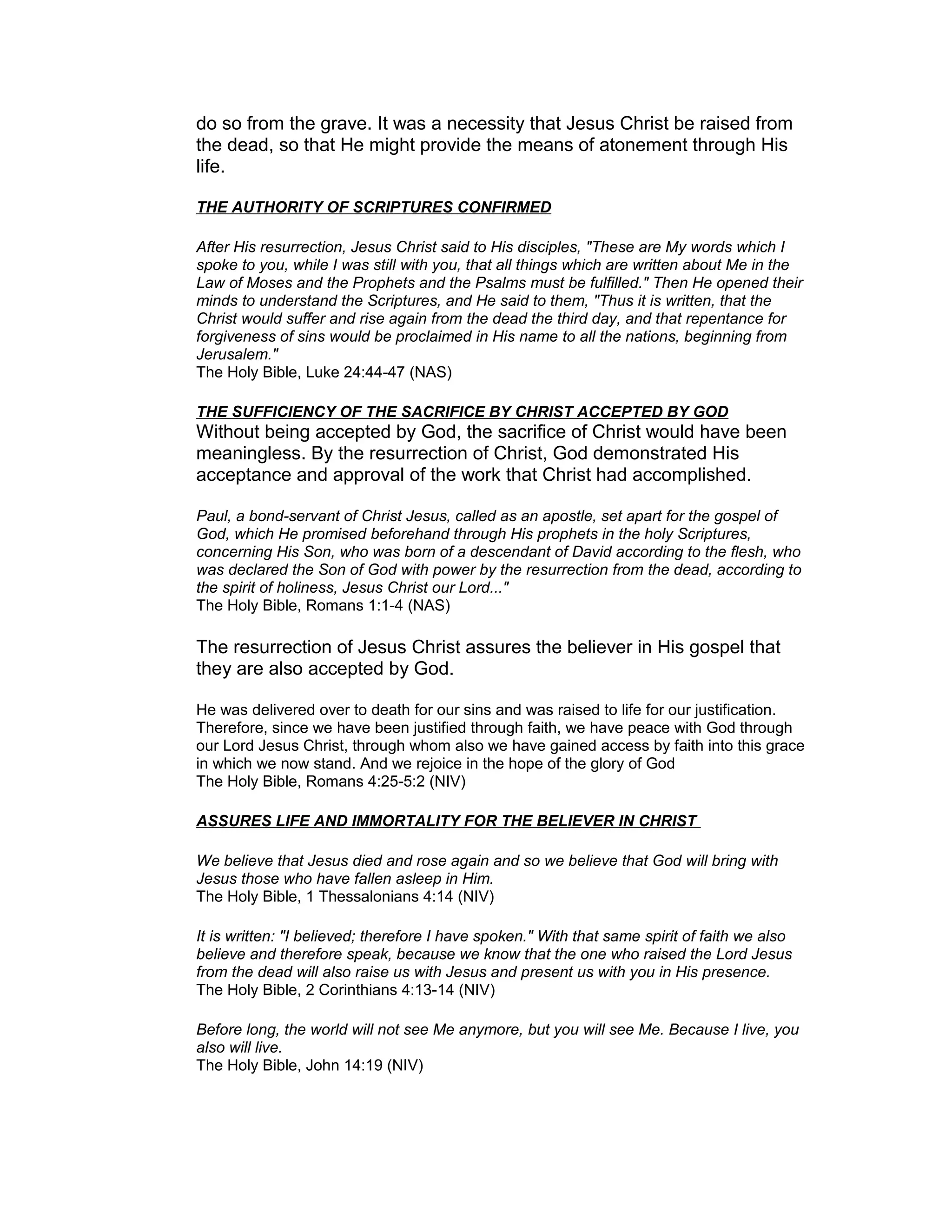
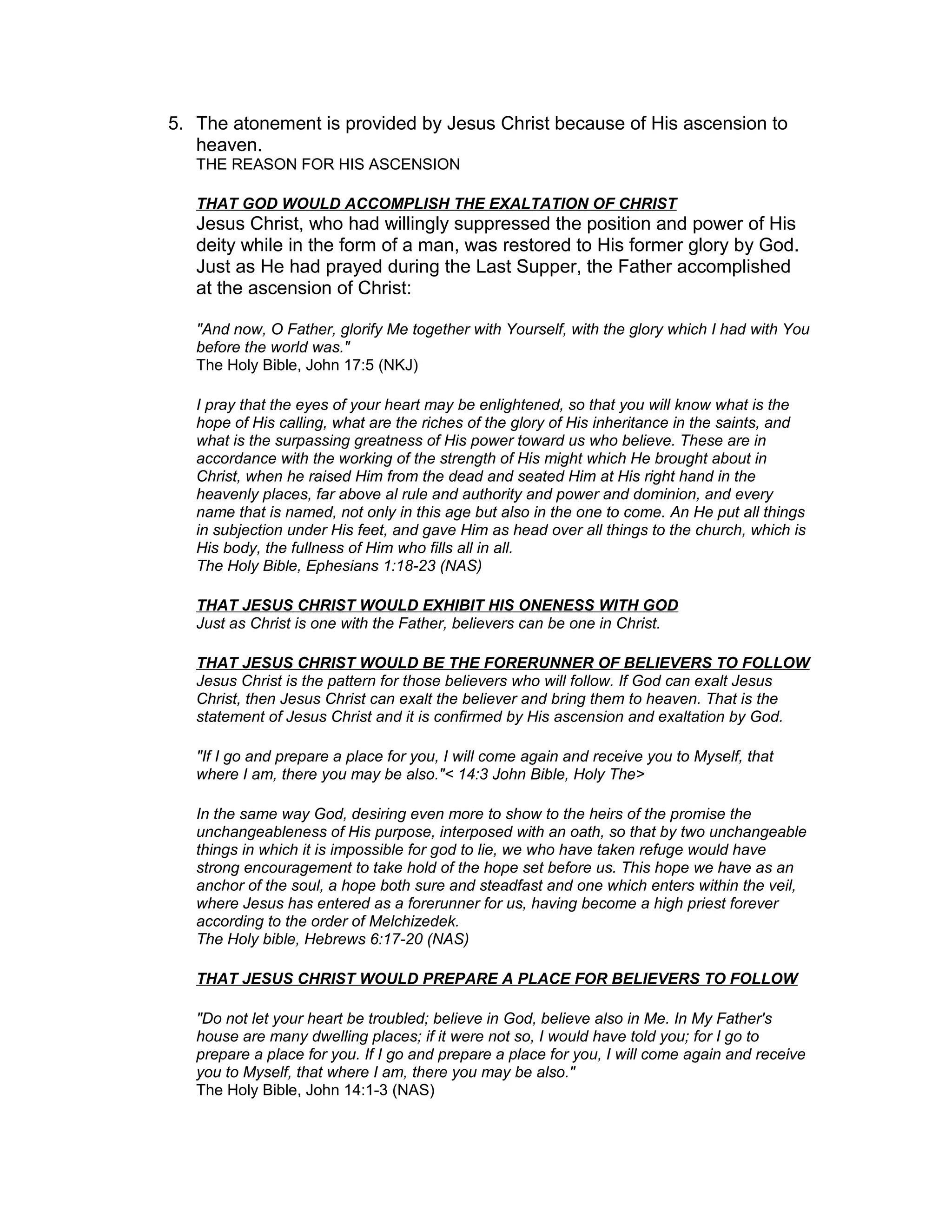
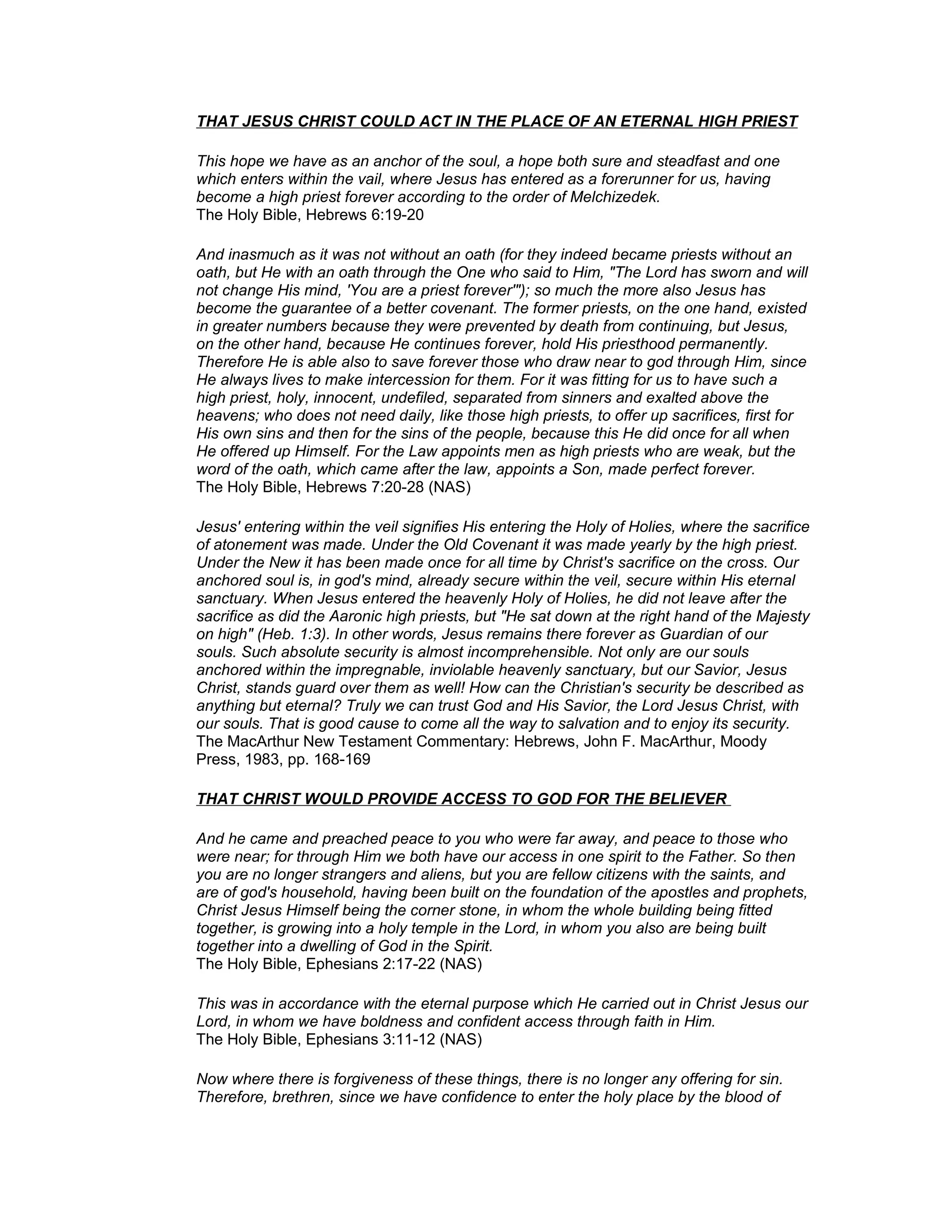
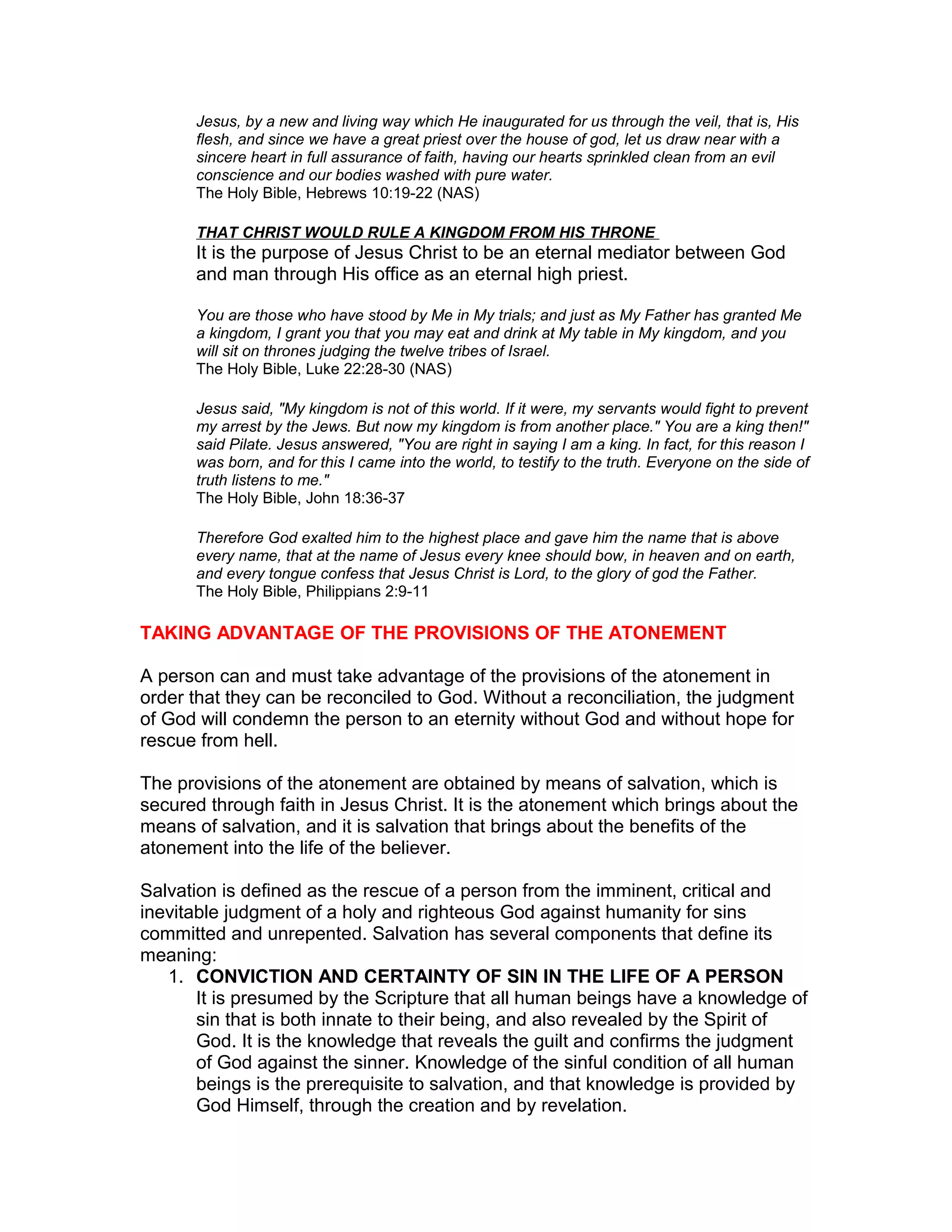
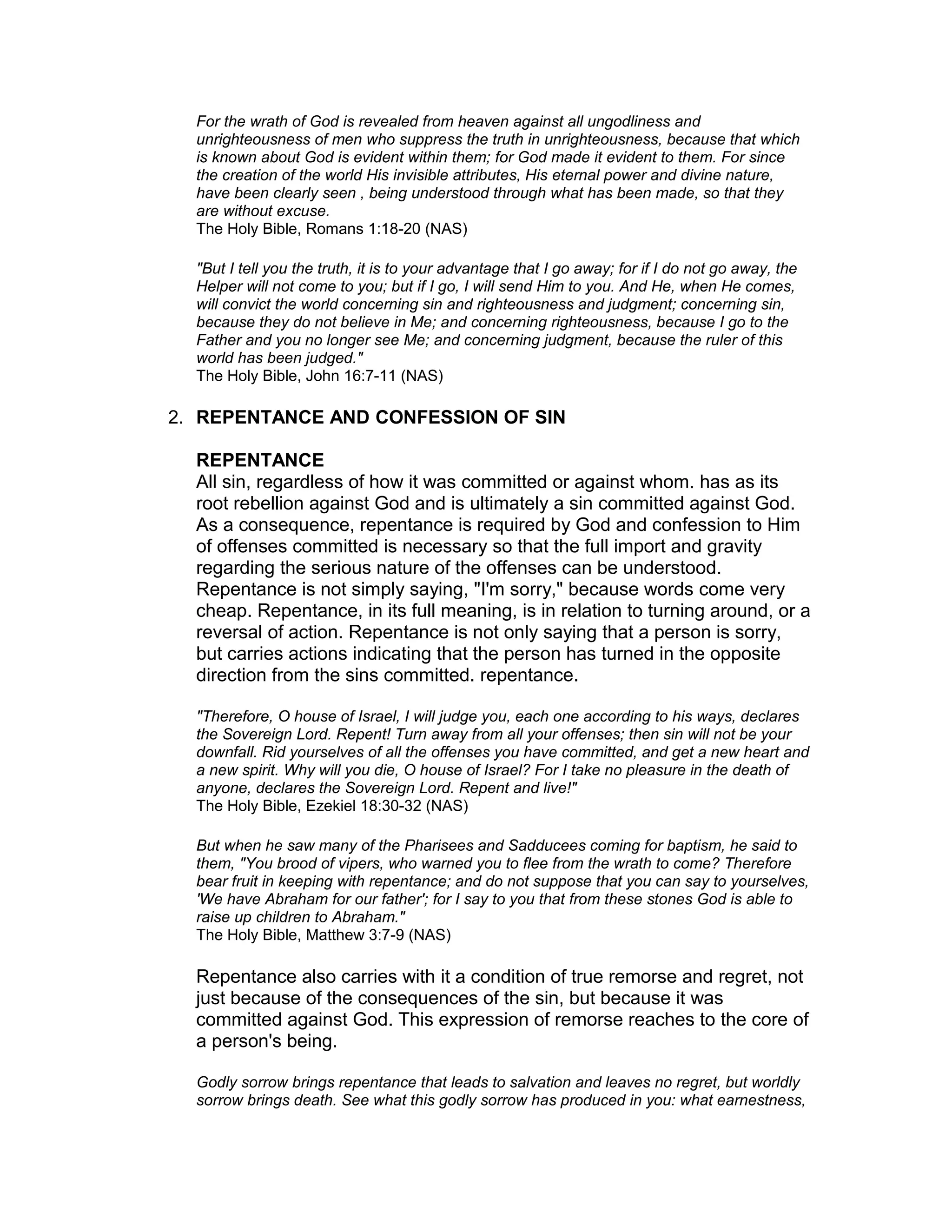
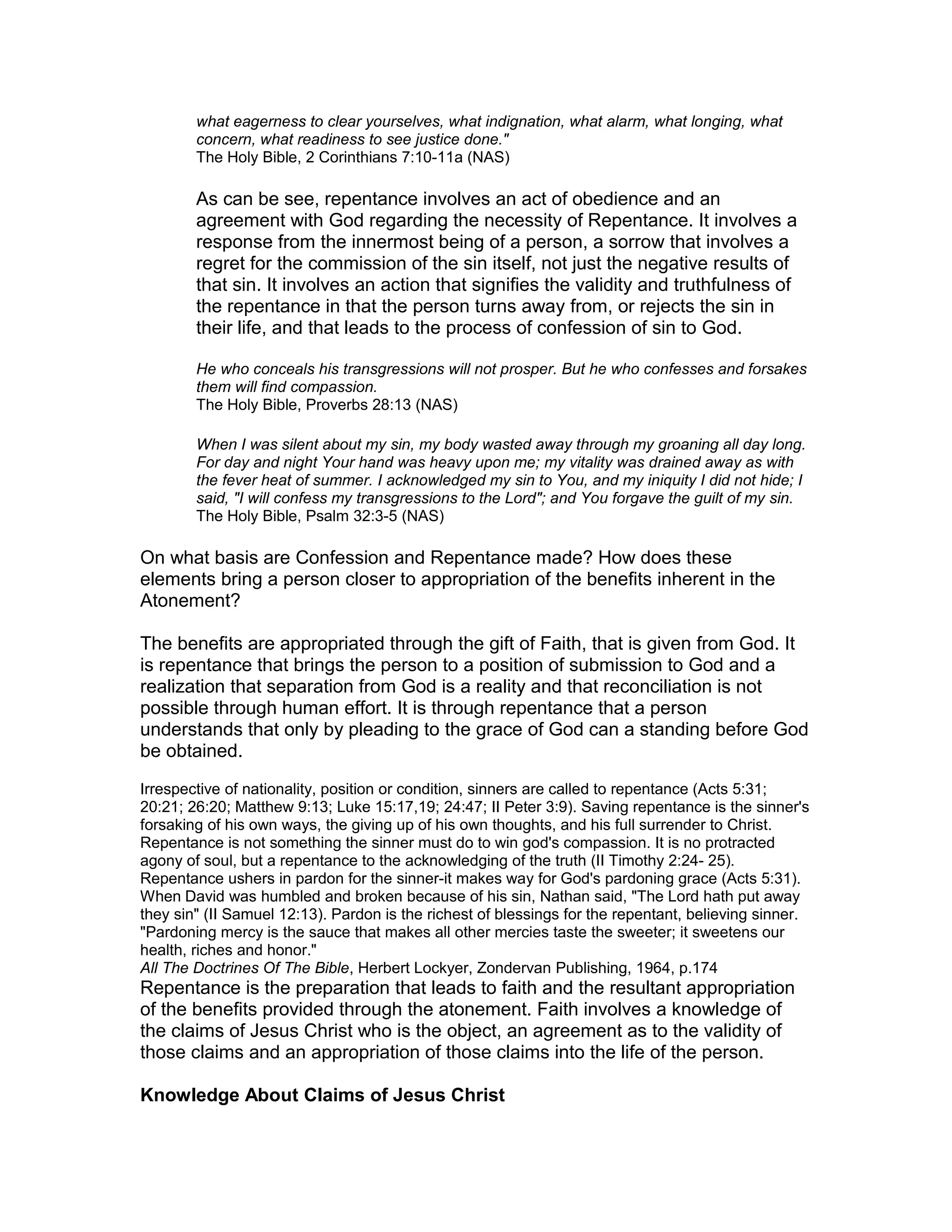
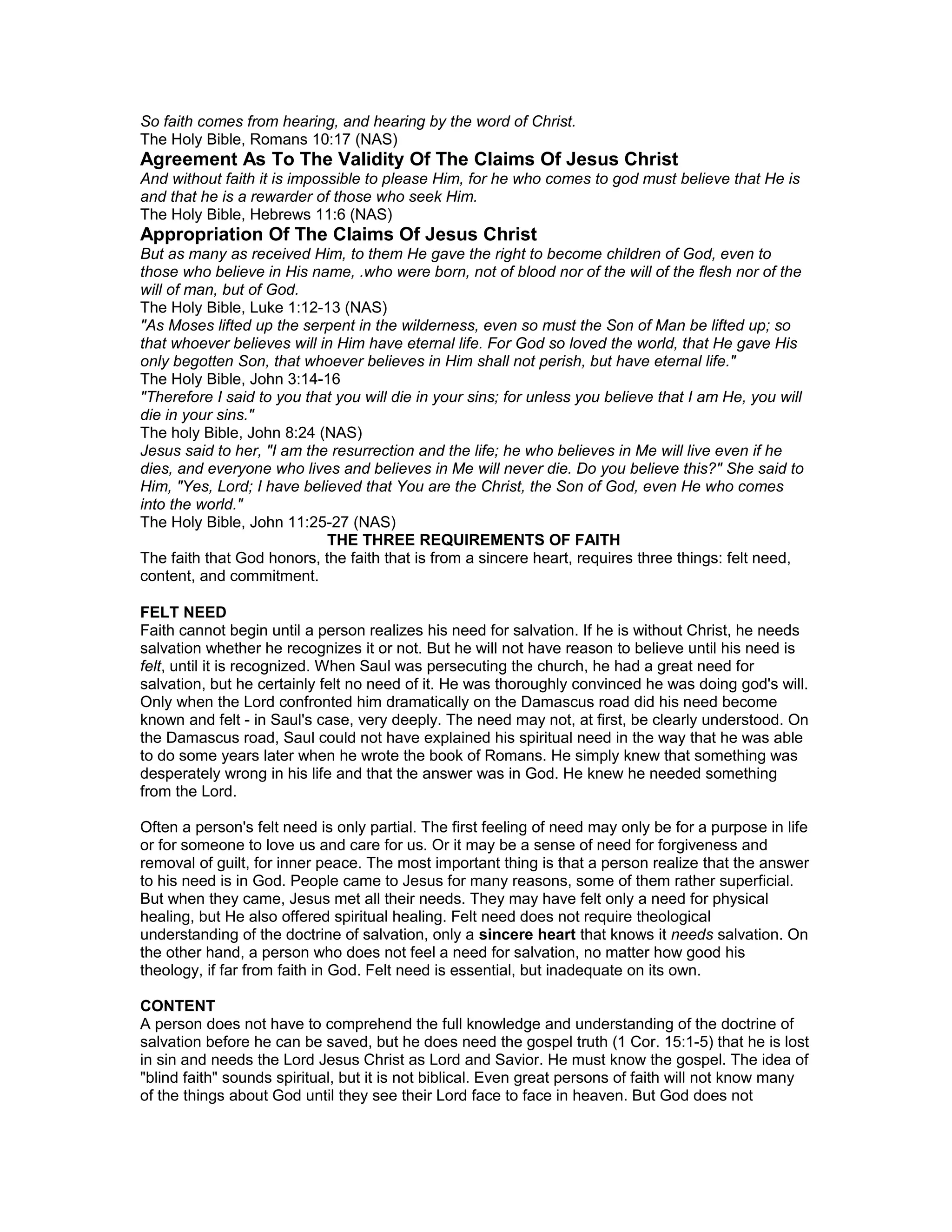
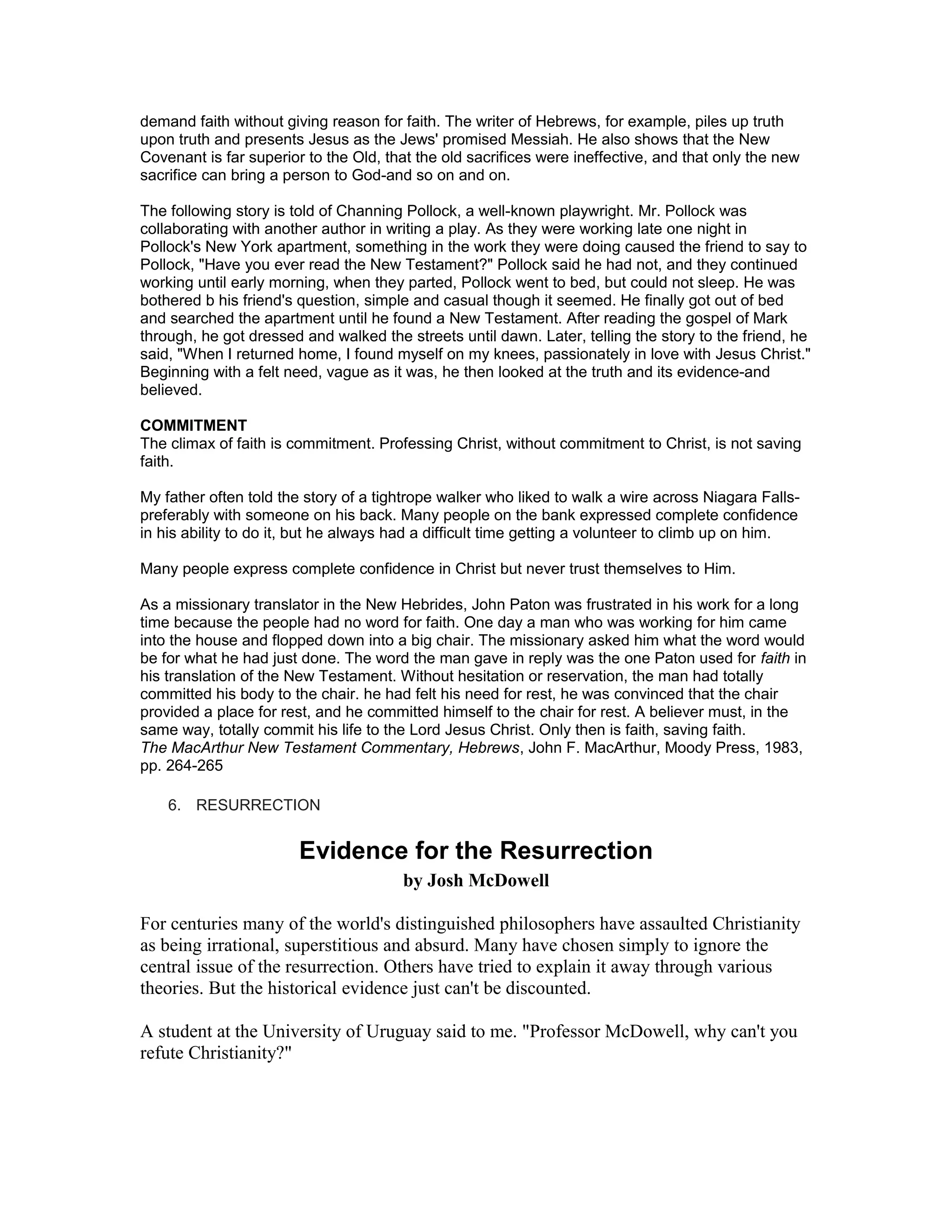
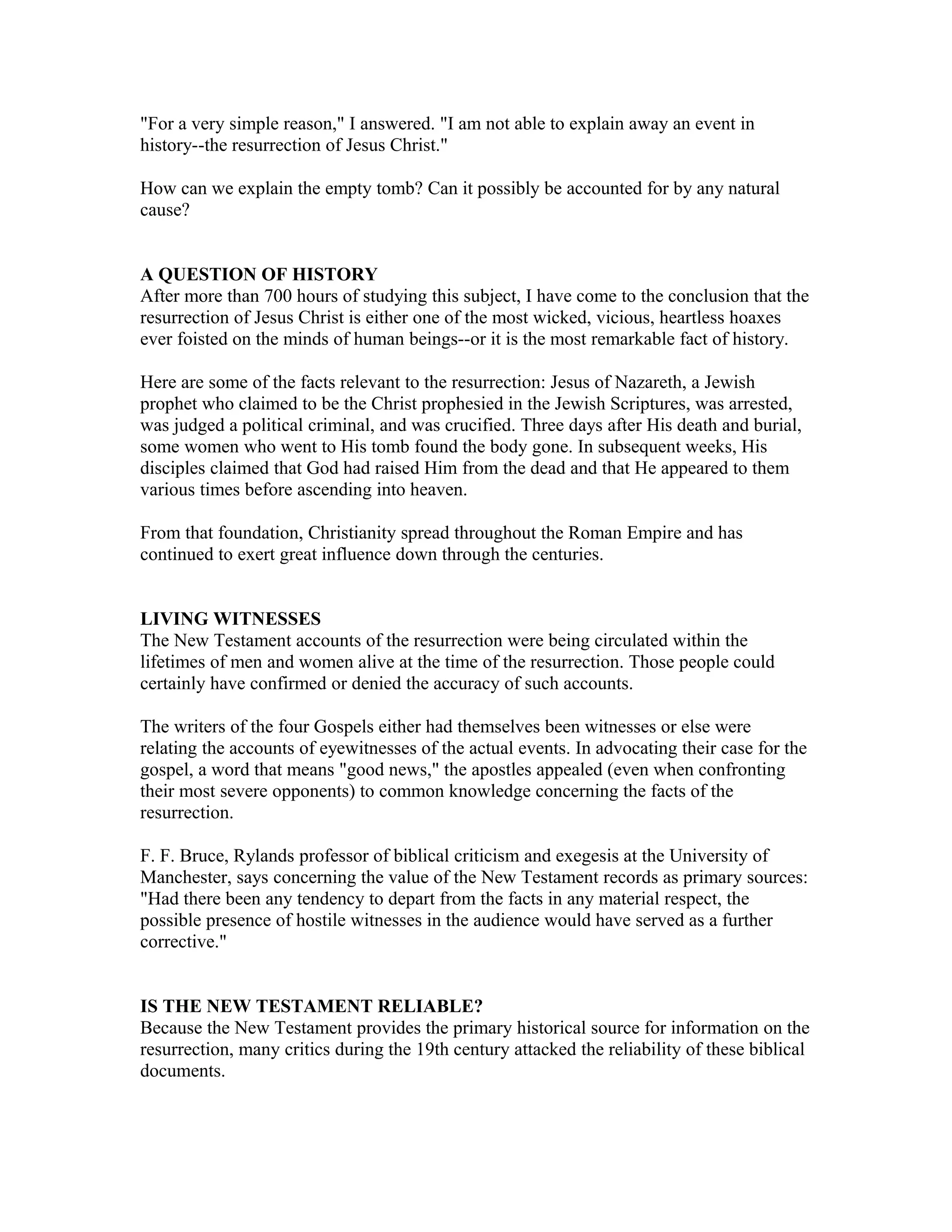
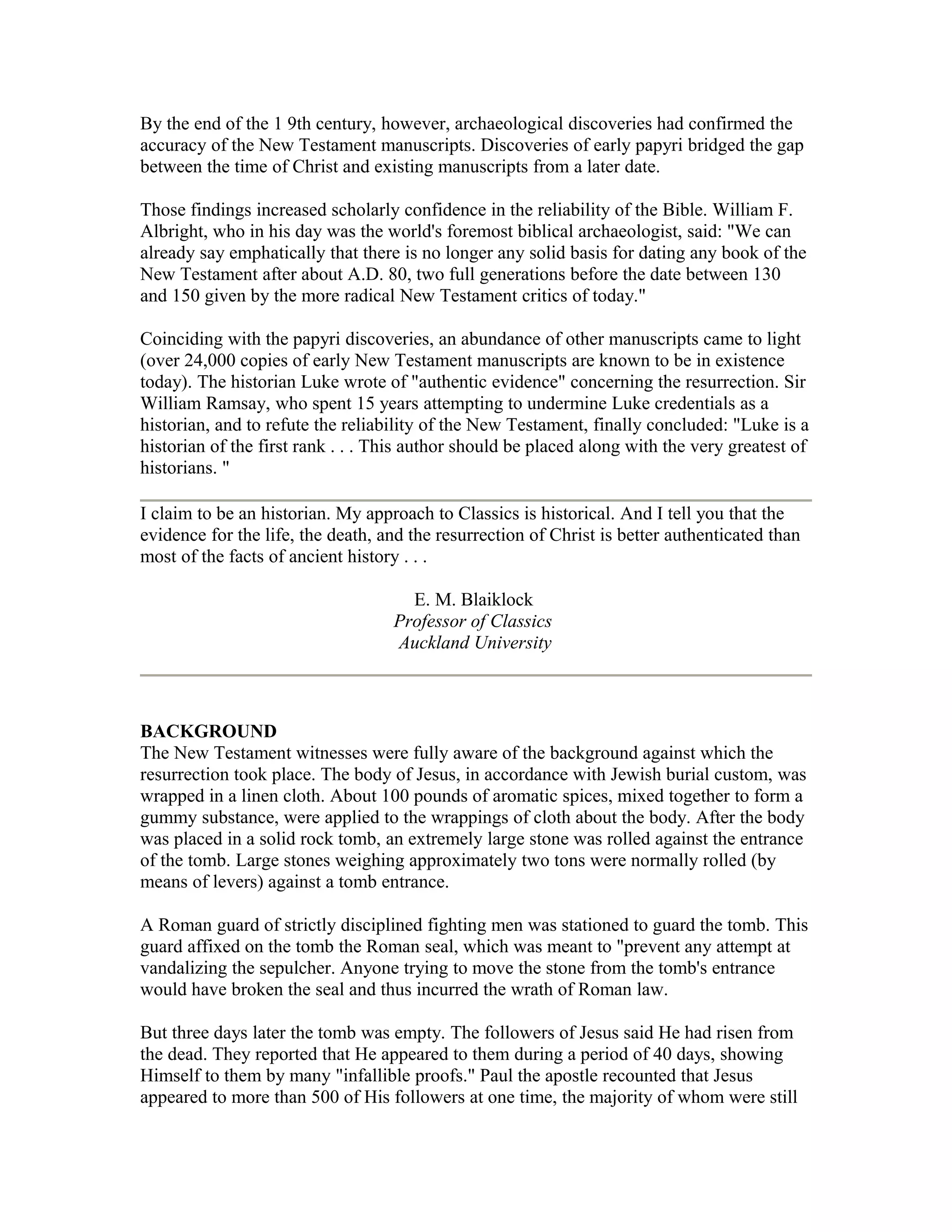
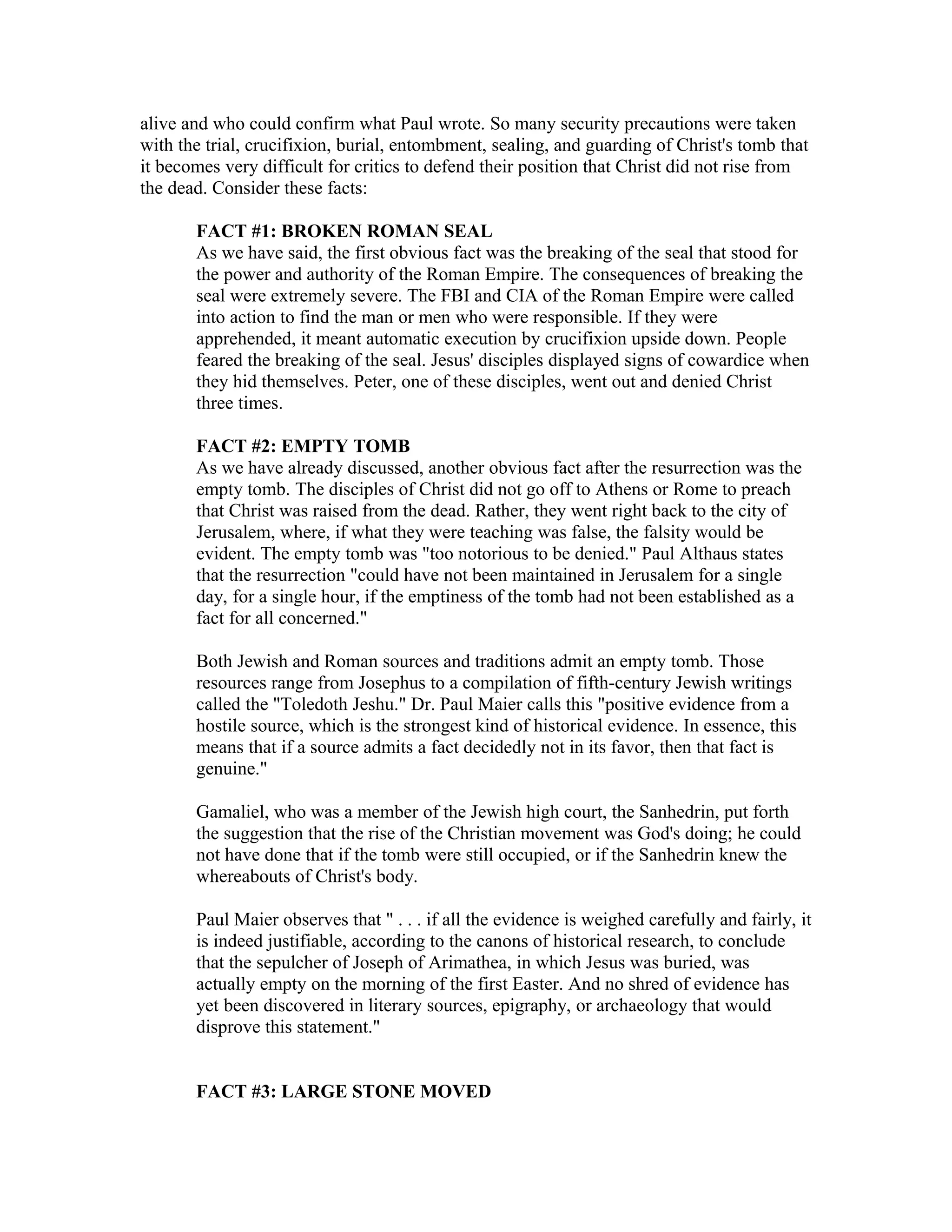
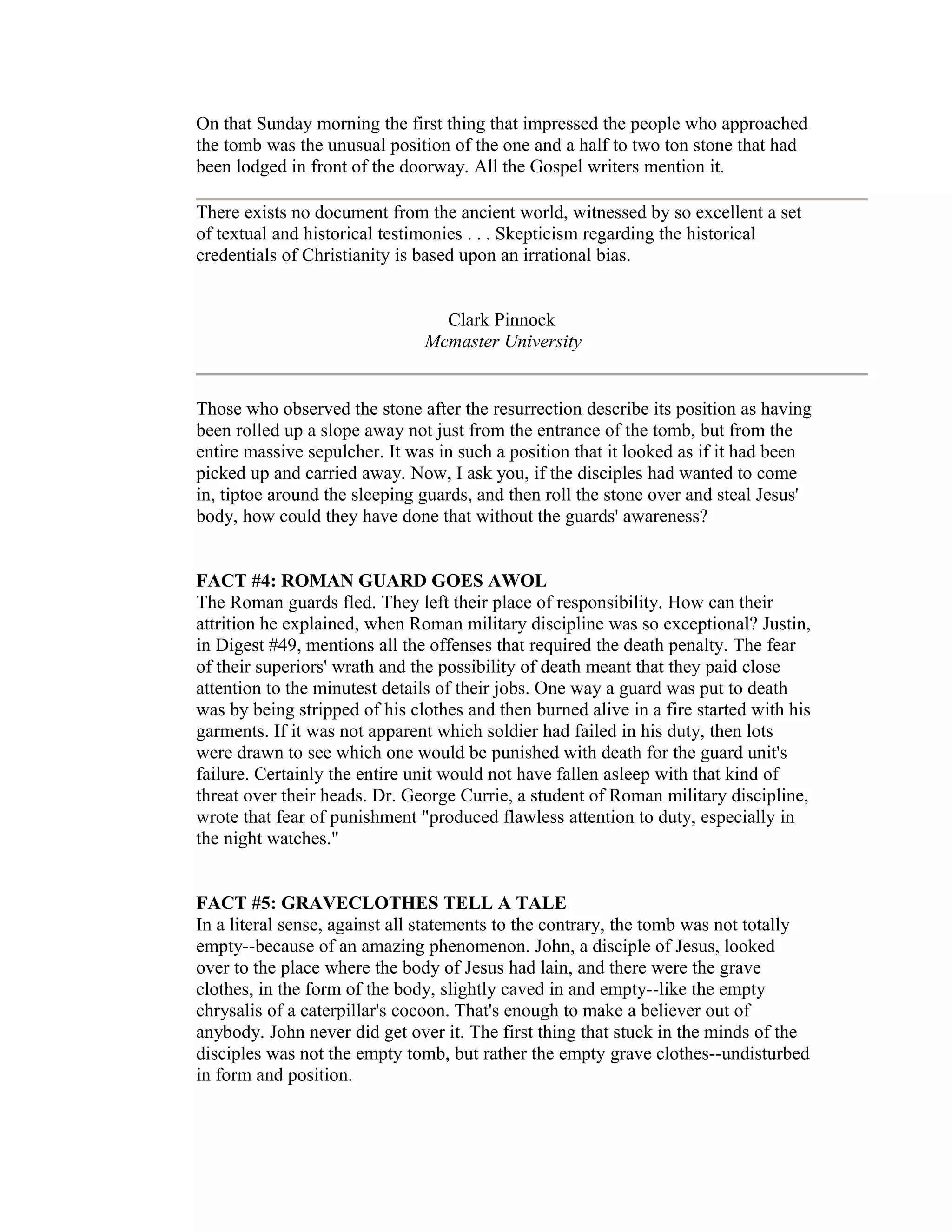
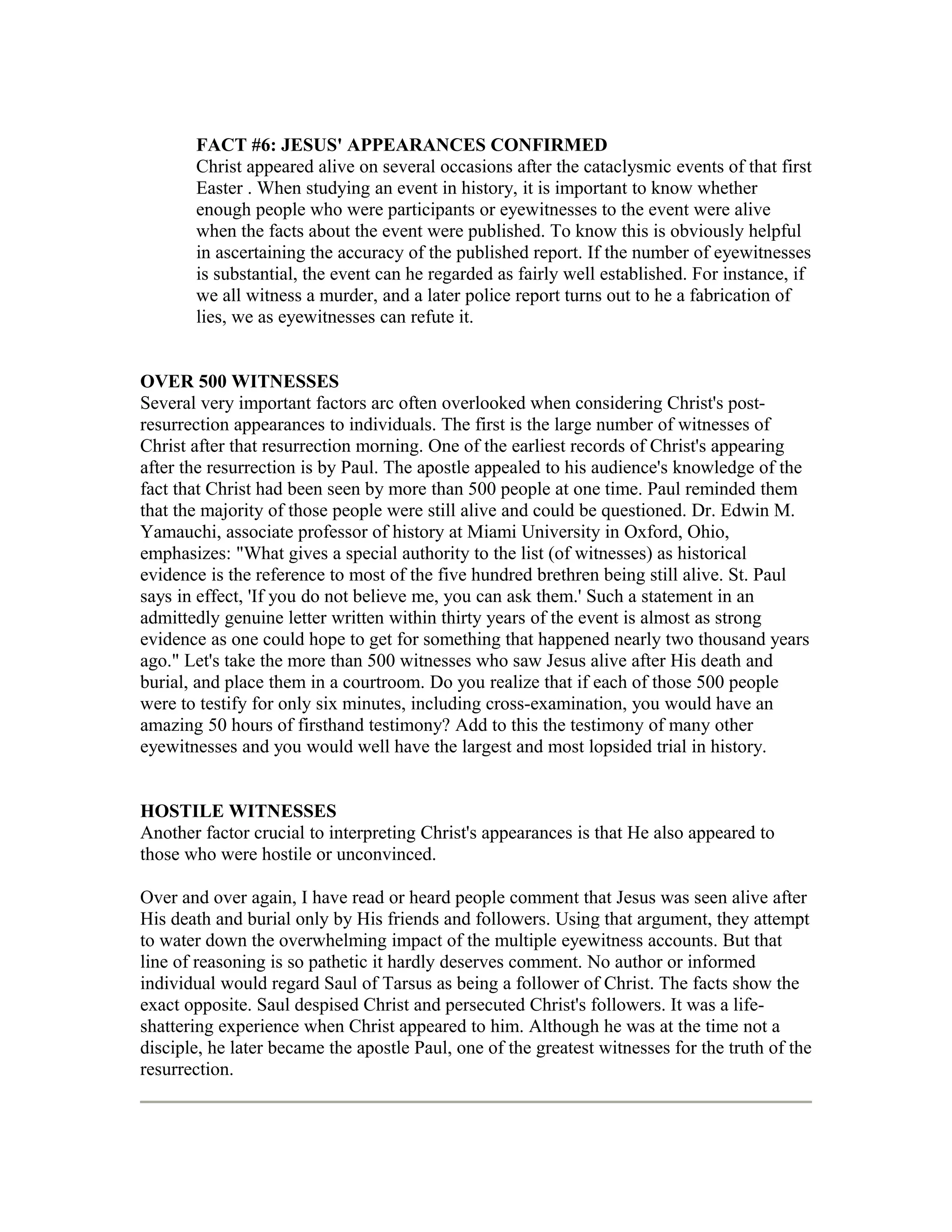
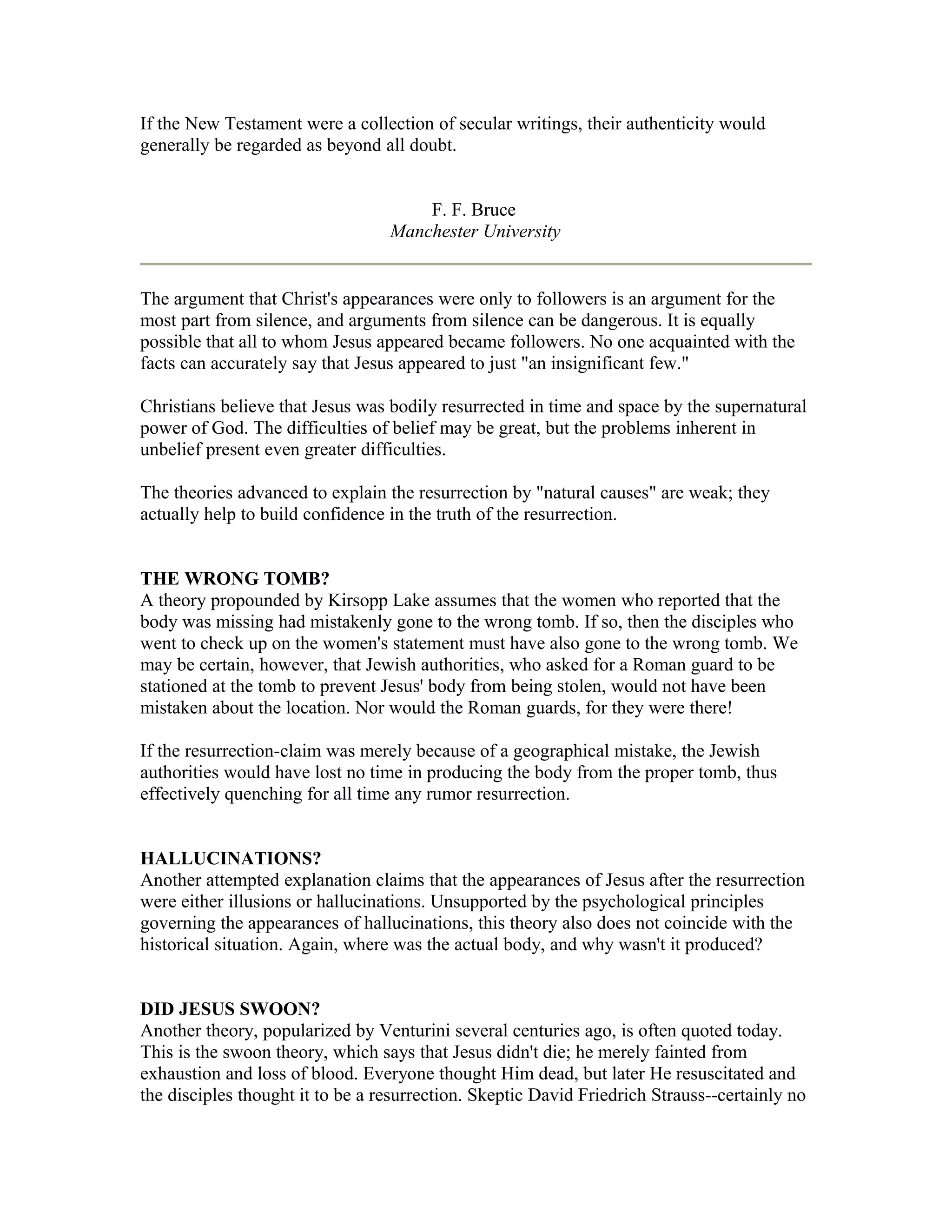
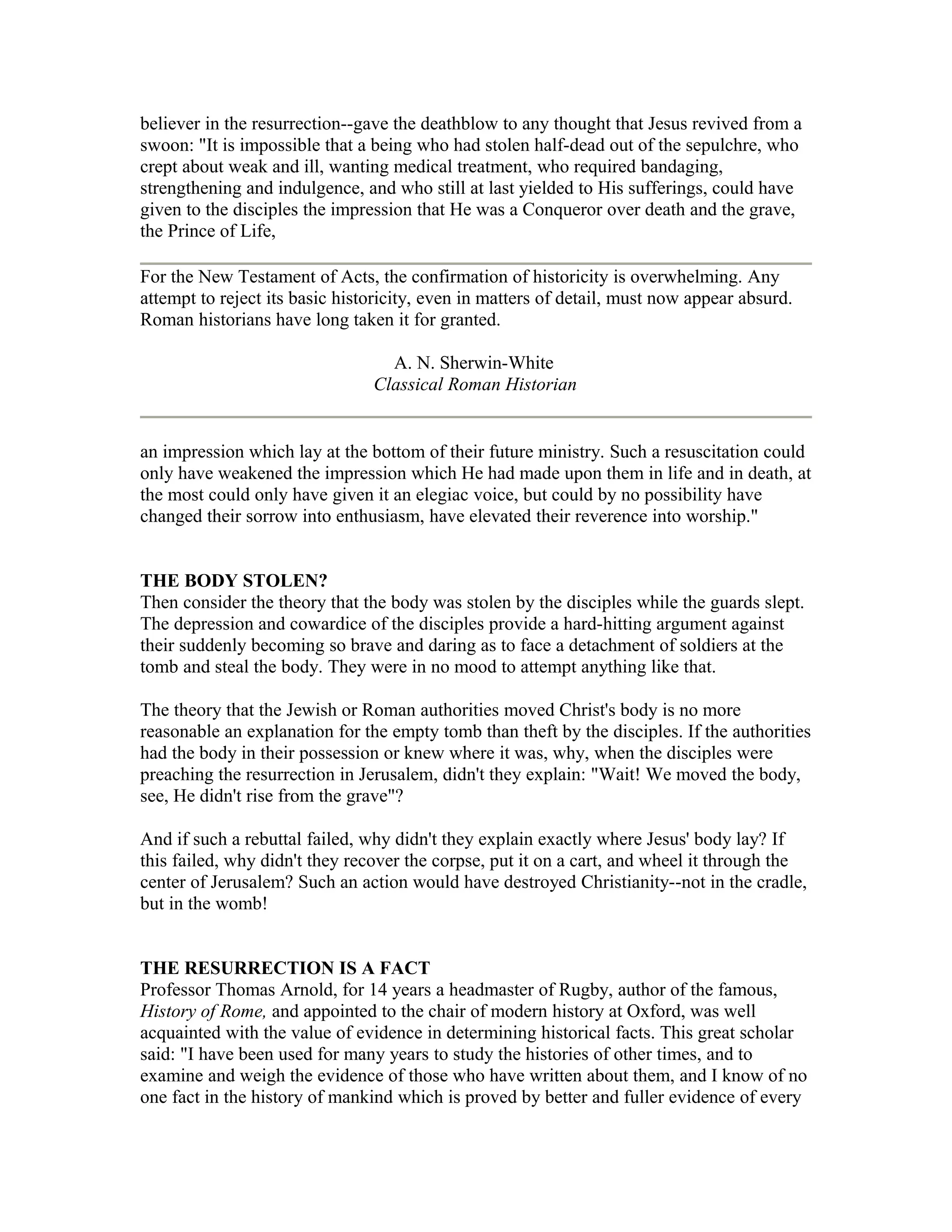
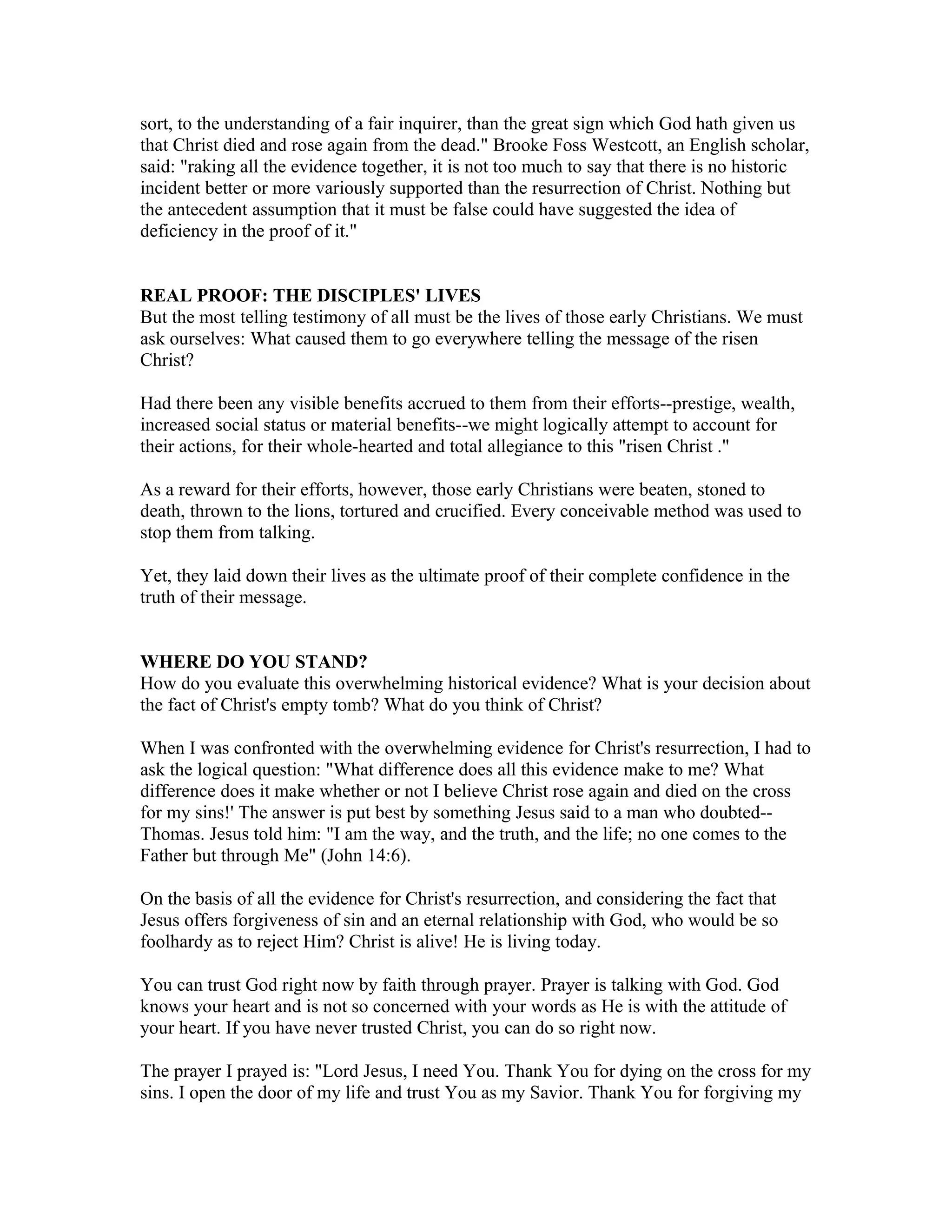
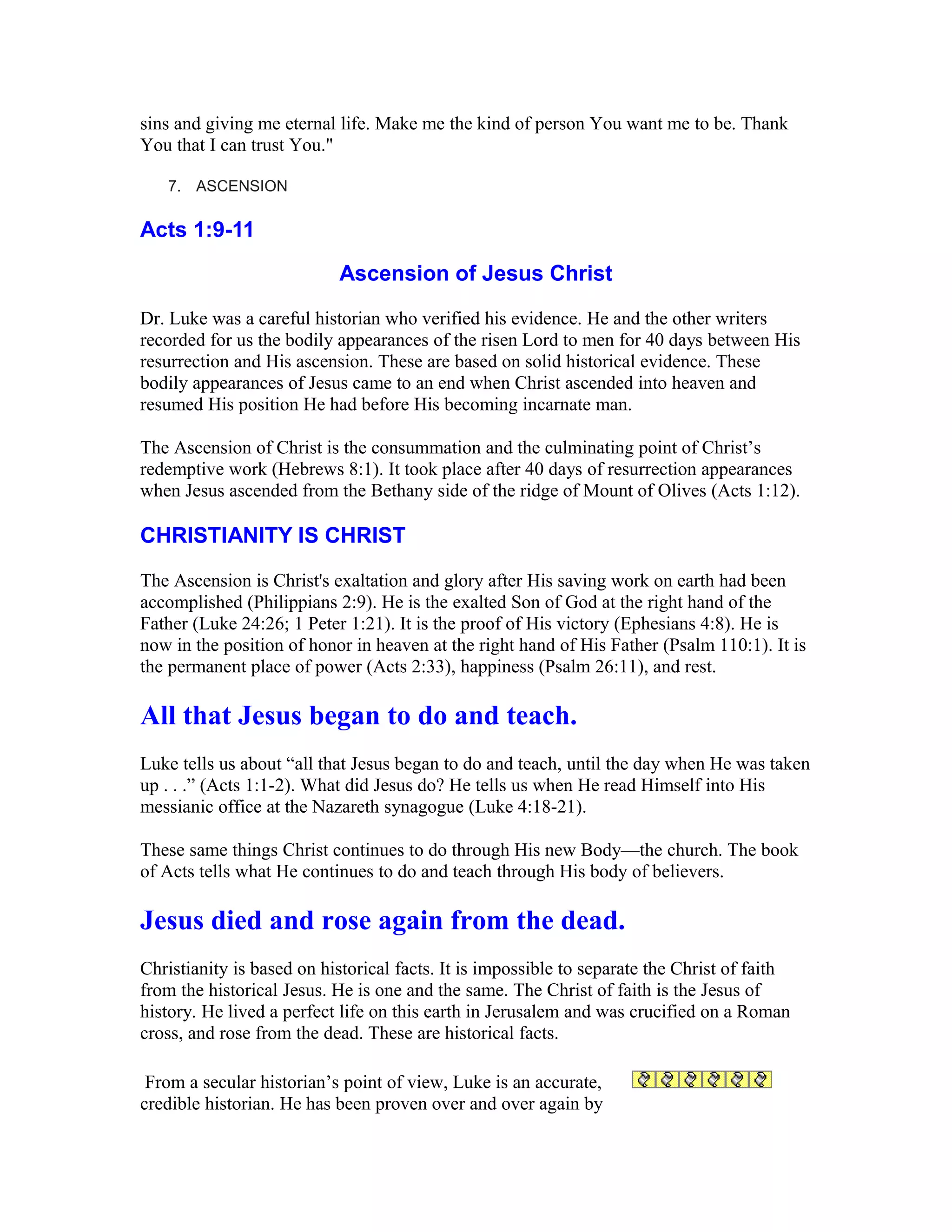
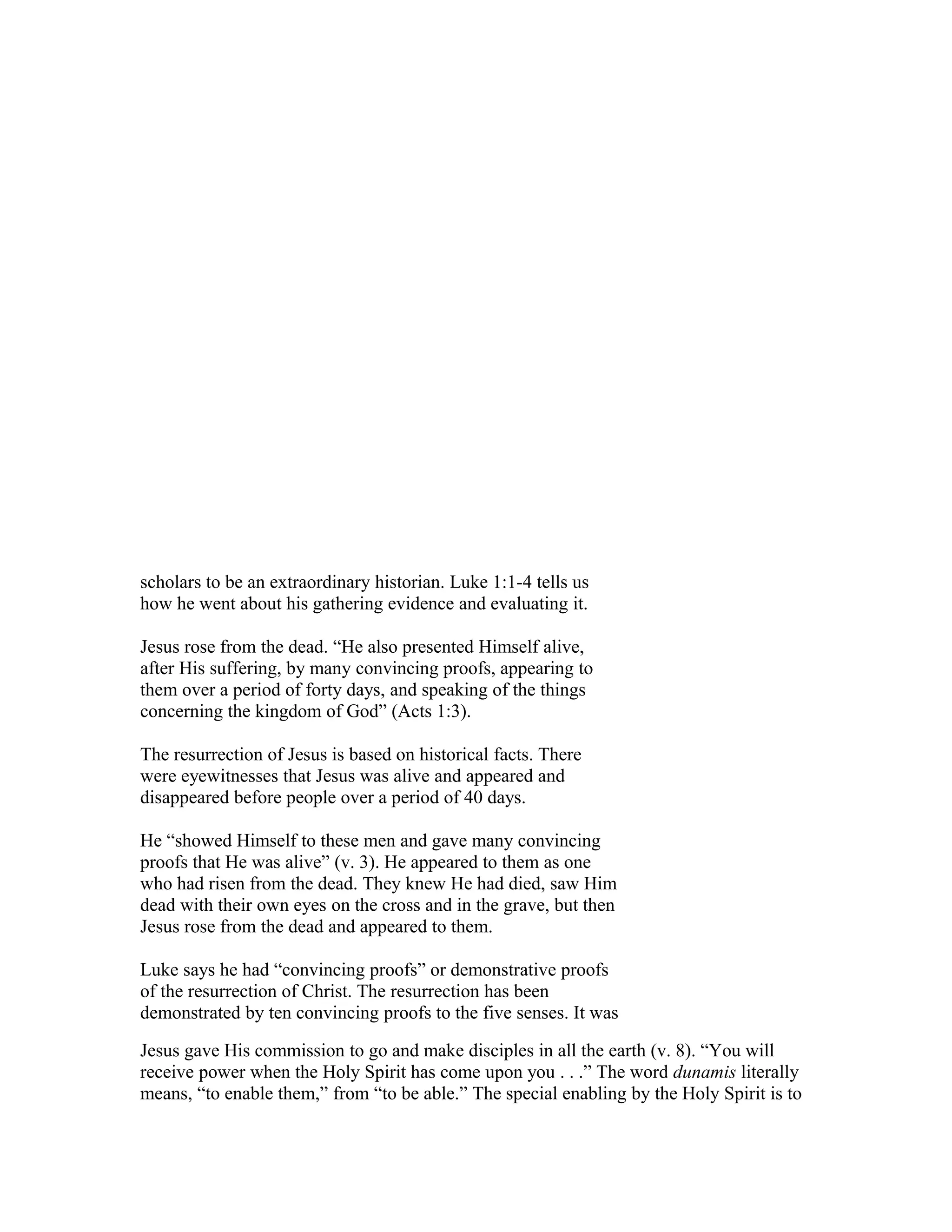
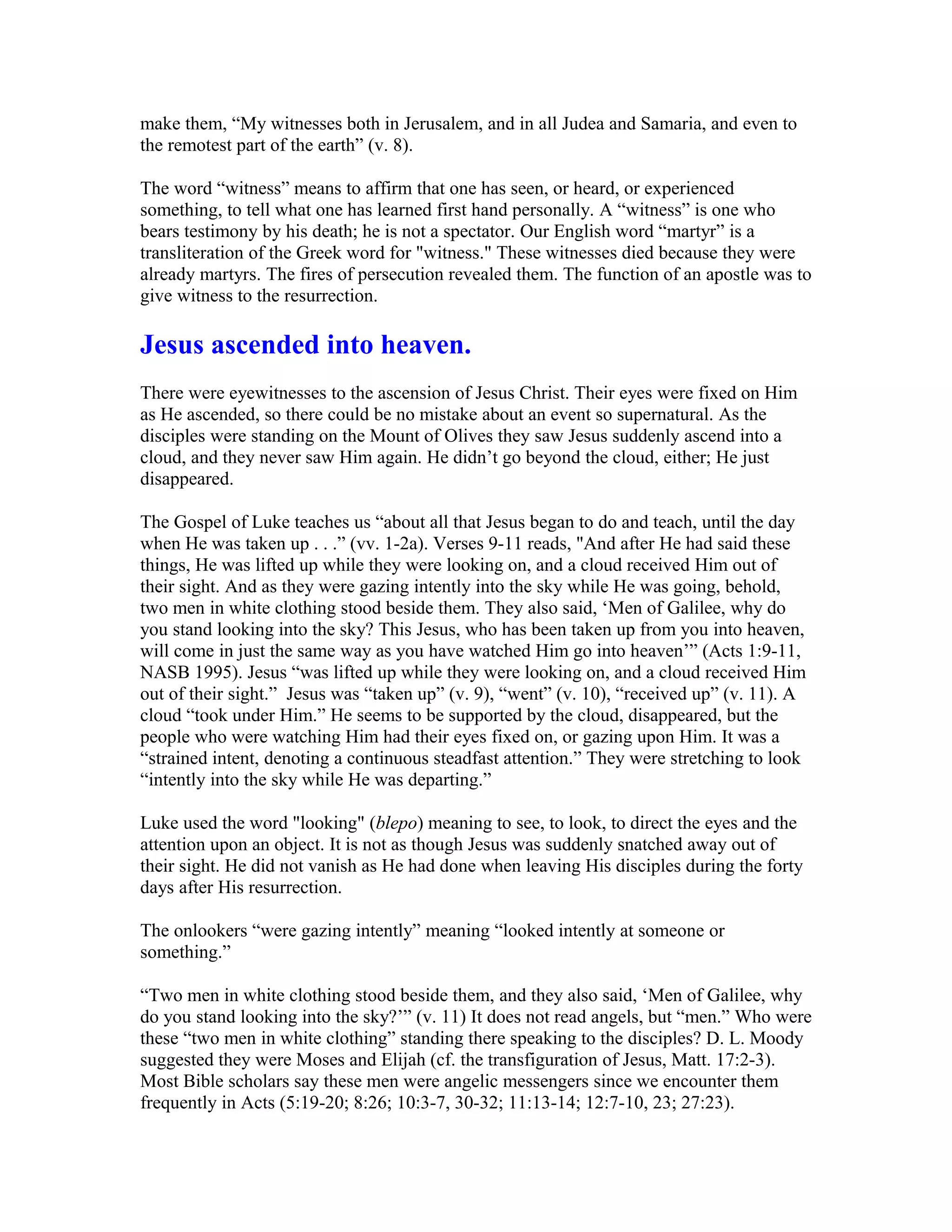
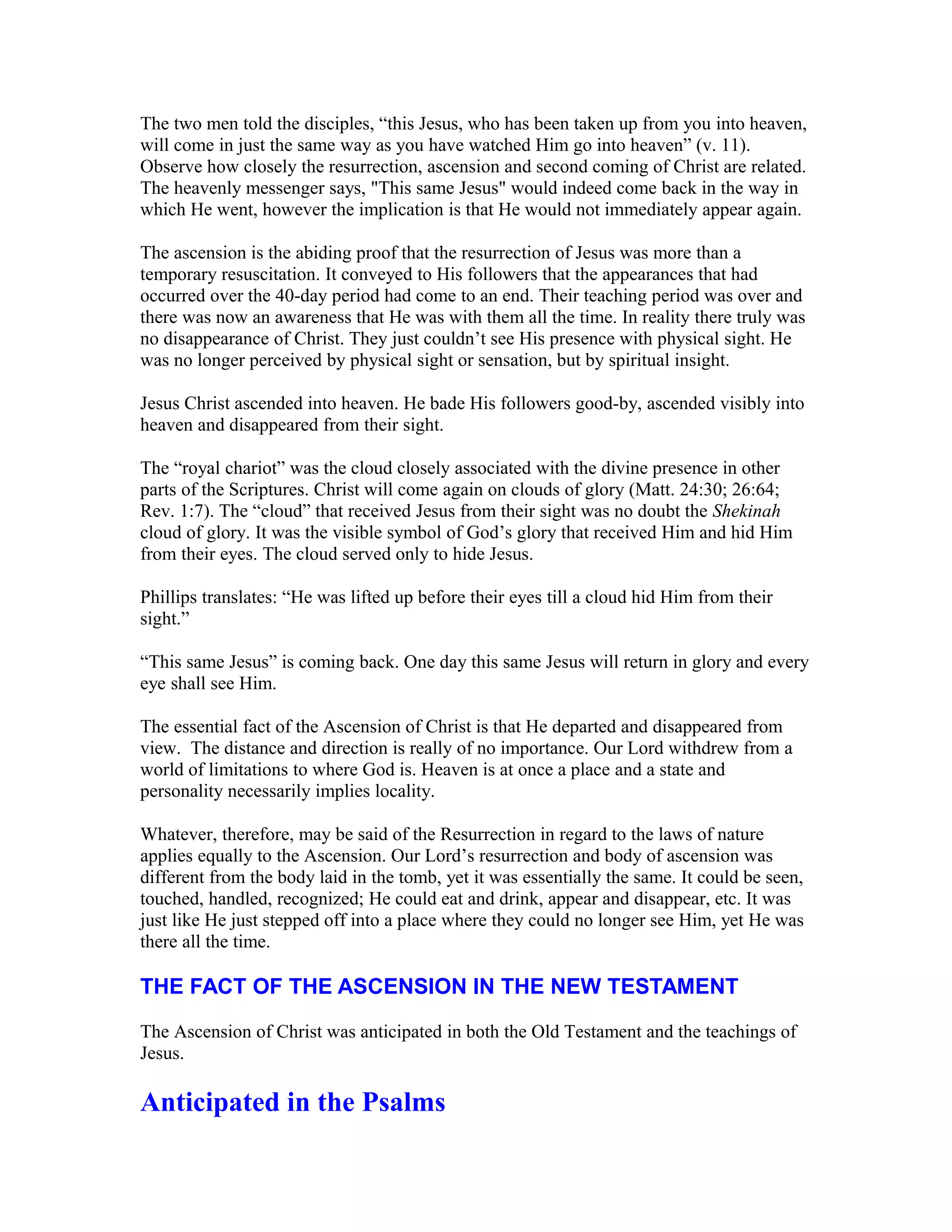
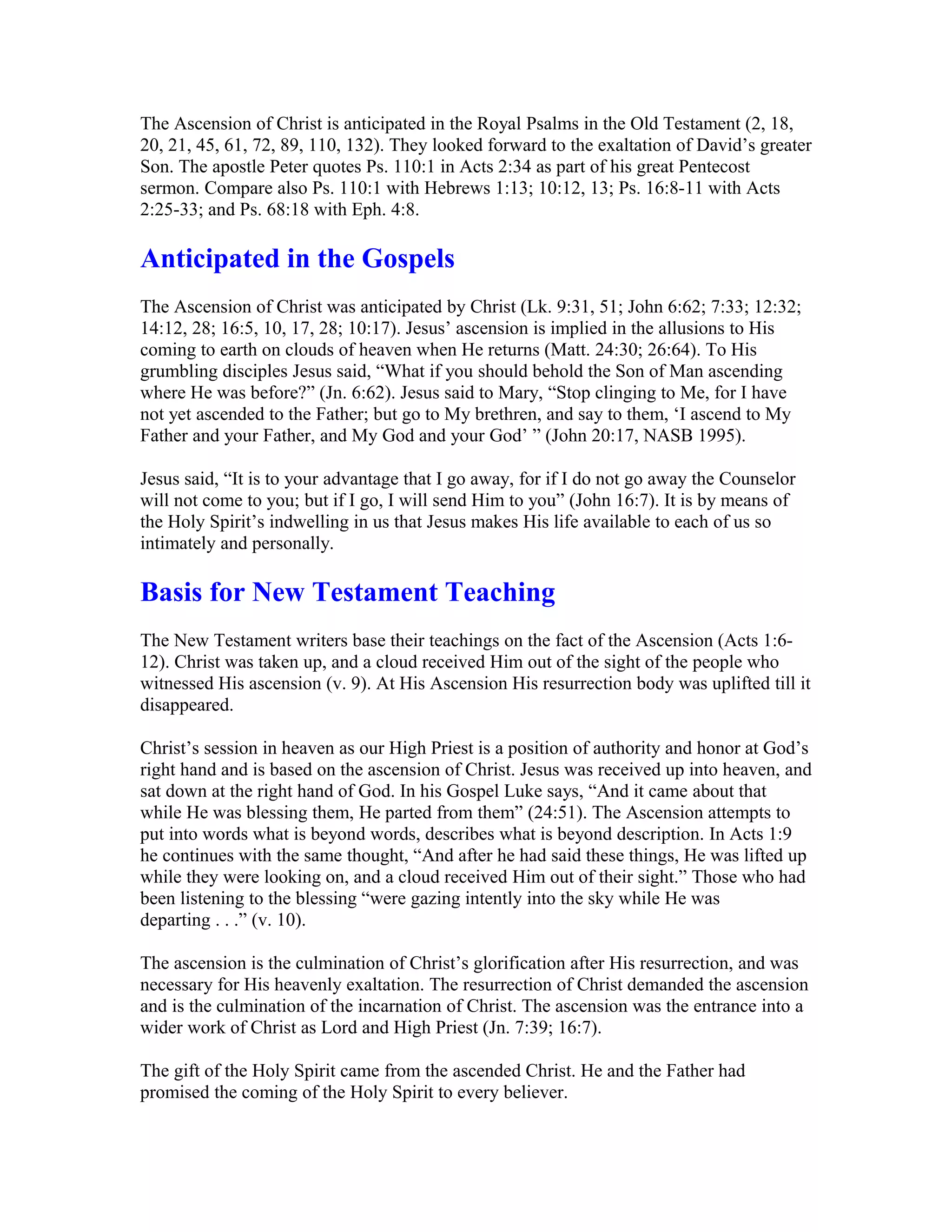
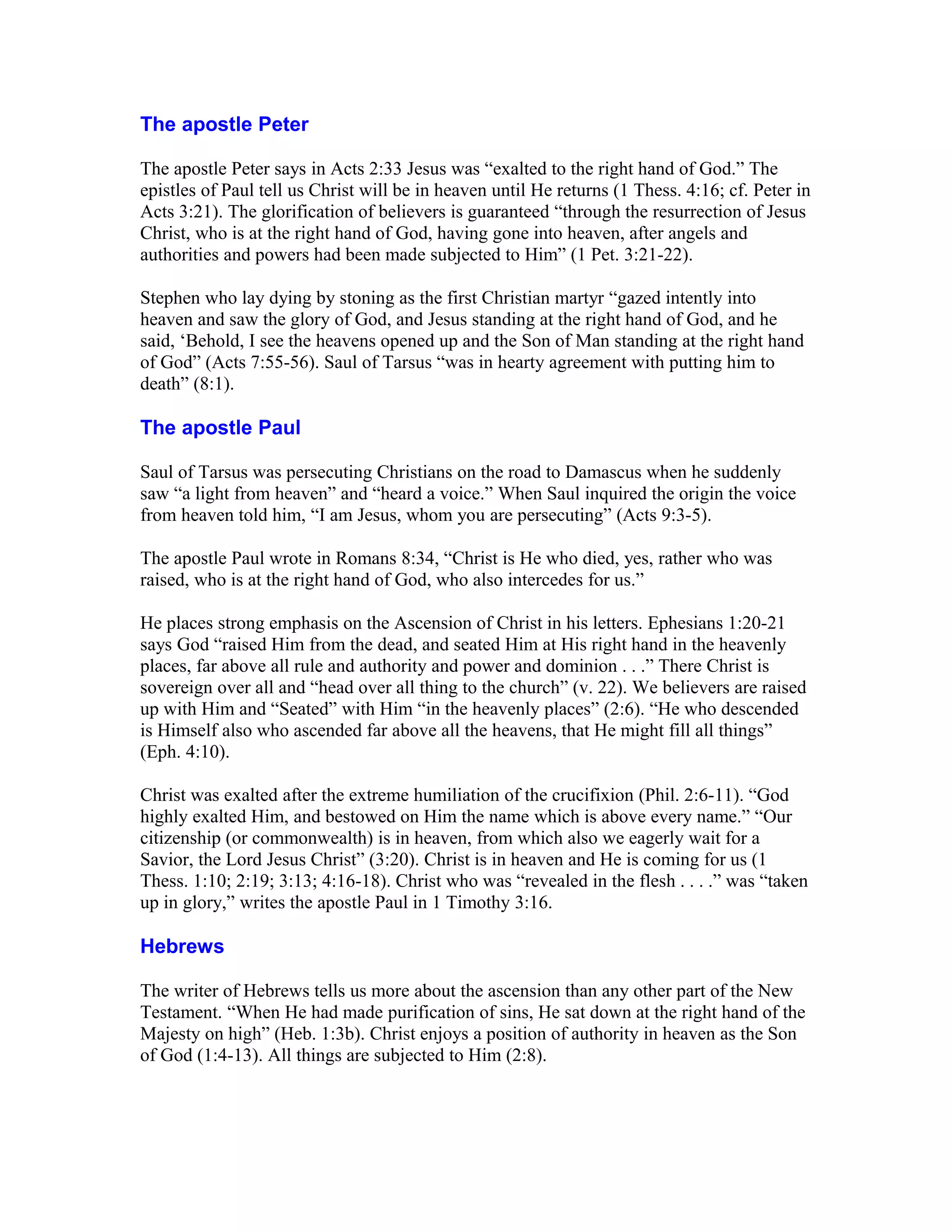
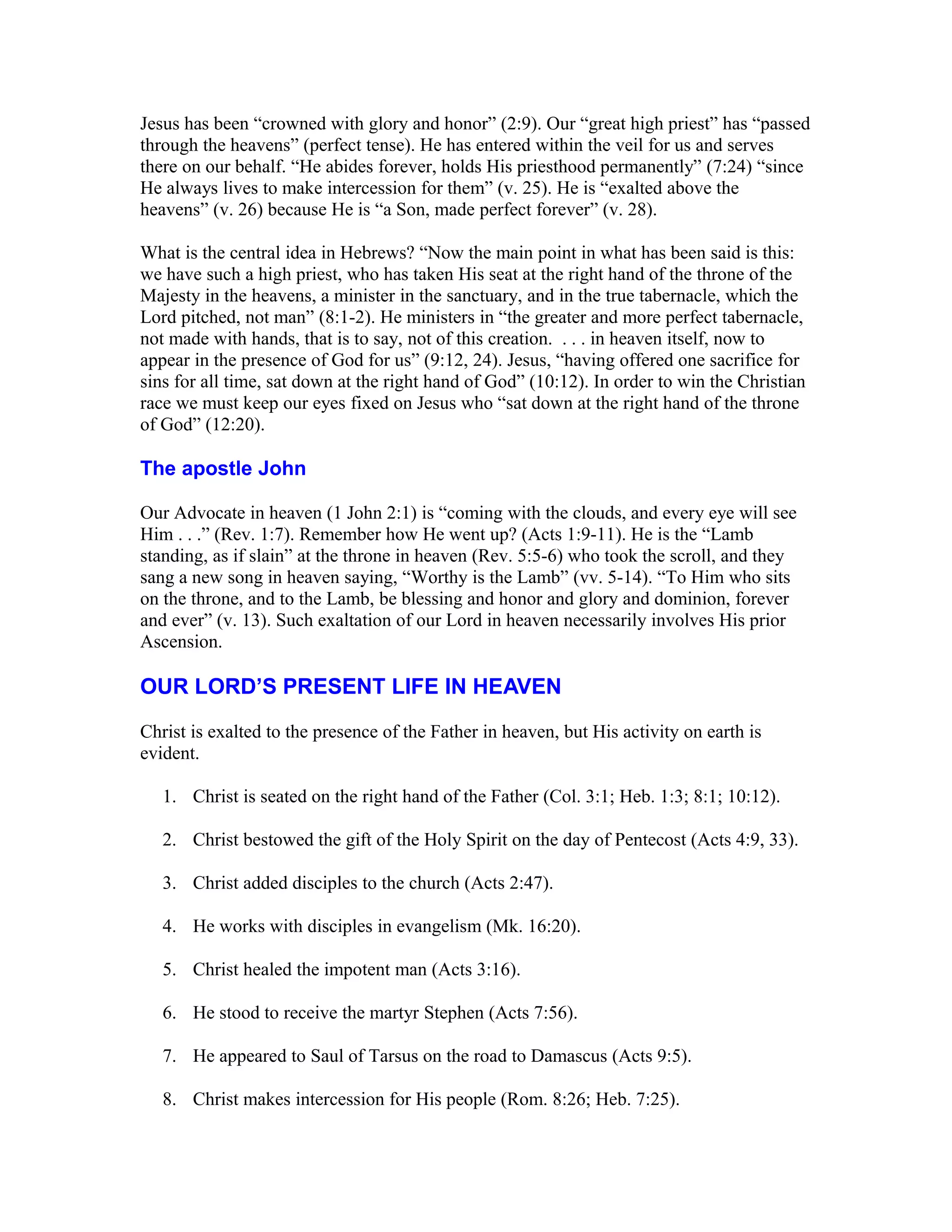
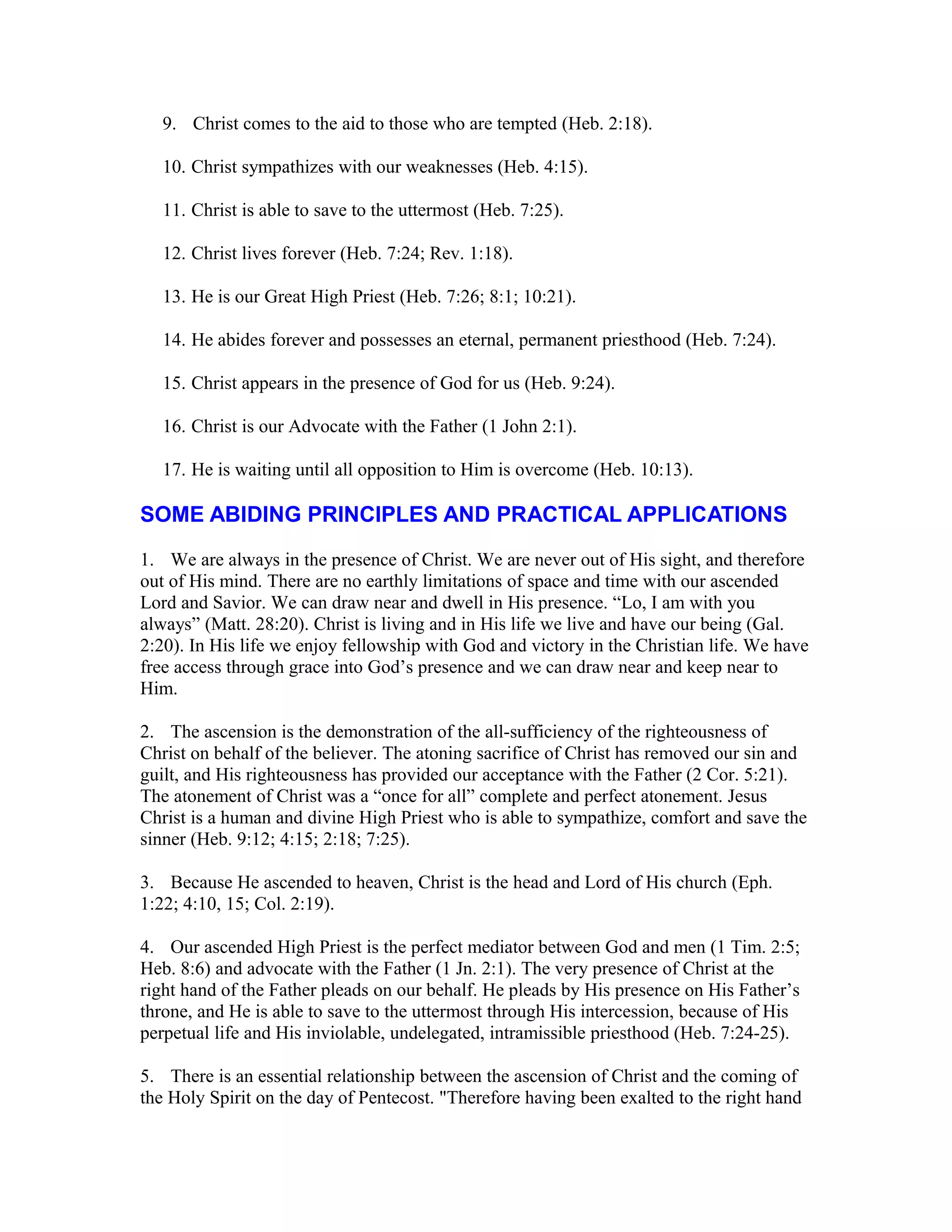
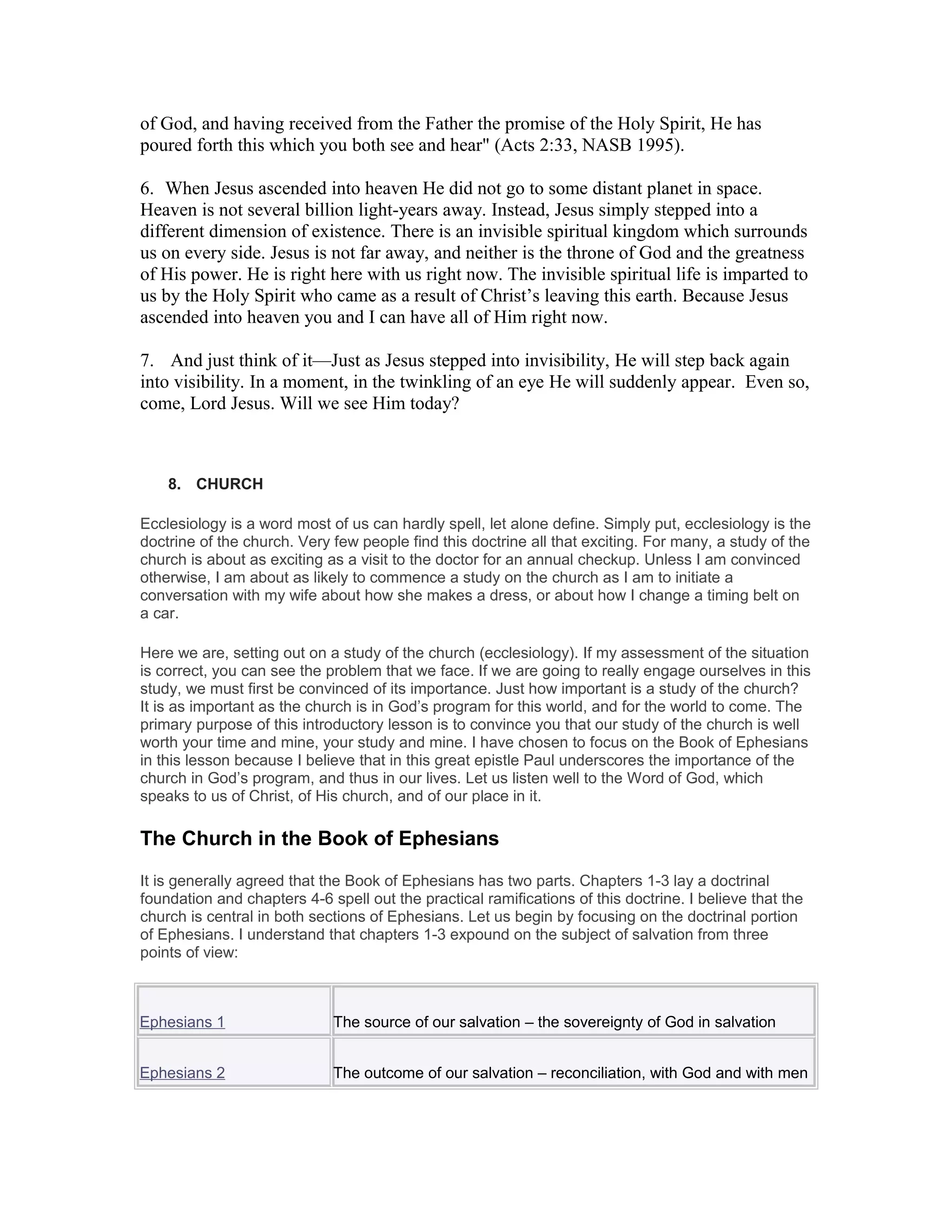
![Ephesians 3 The divine purpose of salvation – the glory of God
Ephesians 1
1 From Paul, an apostle of Christ Jesus by the will of God, to the saints [in Ephesus], the
faithful in Christ Jesus. 2 Grace and peace to you from God our Father and the Lord Jesus
Christ! 3 Blessed is the God and Father of our Lord Jesus Christ, who has blessed us with
every spiritual blessing in the heavenly realms in Christ. 4 For he lovingly chose us in Christ
before the foundation of the world that we may be holy and unblemished in his sight. 5 He did
this by predestining us to adoption as his sons through Jesus Christ, according to the pleasure
of his will— 6 to the praise of the glory of his grace that he has freely bestowed on us in his
dearly loved Son. 7 In him we have redemption through his blood, the forgiveness of our
trespasses, according to the riches of his grace 8 that he lavished on us in all wisdom and
insight. 9 He did this when he revealed to us the secret of his will, according to his good
pleasure that he set forth in Christ, 10 toward the administration of the fullness of the times, to
head up all things in Christ—the things in heaven and the things on earth. 11 In Christ we too
have been claimed as God’s own possession, since we were predestined according to the one
purpose of him who accomplishes all things according to the counsel of his will 12 so that we,
who were the first to set our hope on Christ, may be to the praise of his glory. 13 And when you
heard the word of truth (the gospel of your salvation)—when you believed in Christ—you were
marked with the seal of the promised Holy Spirit, 14 who is the down payment of our
inheritance, until the redemption of God’s own possession to the praise of his glory (Ephesians
1:1-14, The NET Bible).2
These verses are rich with doctrinal truths, but our purpose here is to summarize the nature of the
spiritual blessings of salvation that God has bestowed on us.
(1) Our spiritual blessings are indeed bountiful. We are blessed with “every spiritual blessing”
(1:3), which are “freely bestowed on us” (1:6), according to “the riches of His grace” (1:7).
Indeed these blessings have been “lavished” upon us (1:8).
(2) These blessings have God the Father as their source. It is He who has blessed us with every
spiritual blessing (1:3). It is He who chose us in eternity past, before the foundation of the world
(1:4). He predestined us to adoption as sons (1:5).
(3) The blessings of salvation are accomplished through the person and work of Jesus Christ
(1:3; 1:4, 5, 6, 7, 9, 10, 11, 12, 13) and are assured through the Holy Spirit, Who seals us until
our day of redemption (1:13-14).
(4) We have been predestined and saved unto good works. He purposed that we should be “holy
and unblemished in his sight” (1:4).
(5) We have been saved according to the will of God (1:4-5, 9, 11), to accomplish His
foreordained purposes (1:6, 9-12).
(6) We have been saved for God’s pleasure (1:5, 9), and for the praise of His glory (1:6; 12).
(7) Our salvation is a part of God’s program to exalt and glorify Christ, so that He is preeminent in
and over all creation (1:9-10).](https://image.slidesharecdn.com/238822738-apologetics-arguments-150913062852-lva1-app6892/75/238822738-apologetics-arguments-53-2048.jpg)
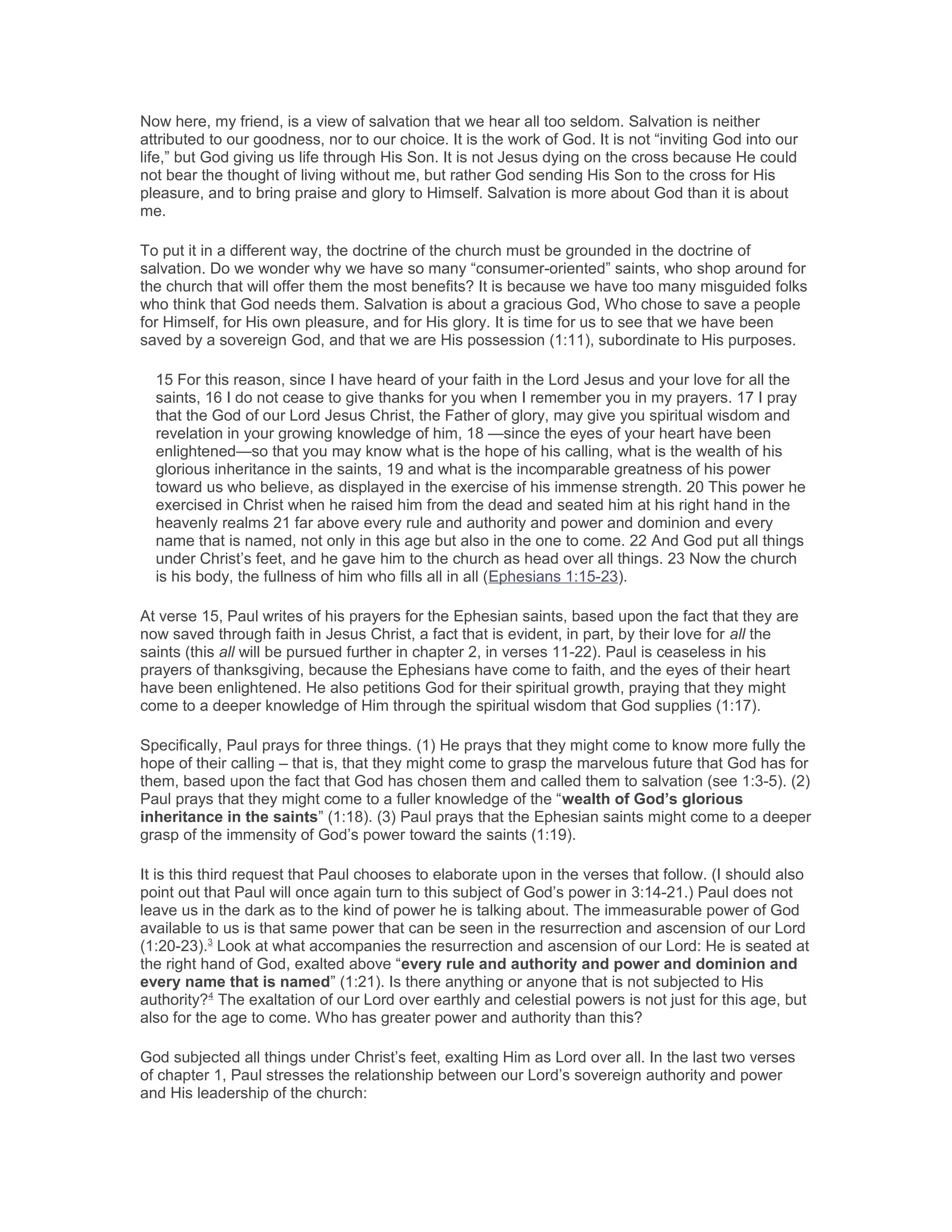
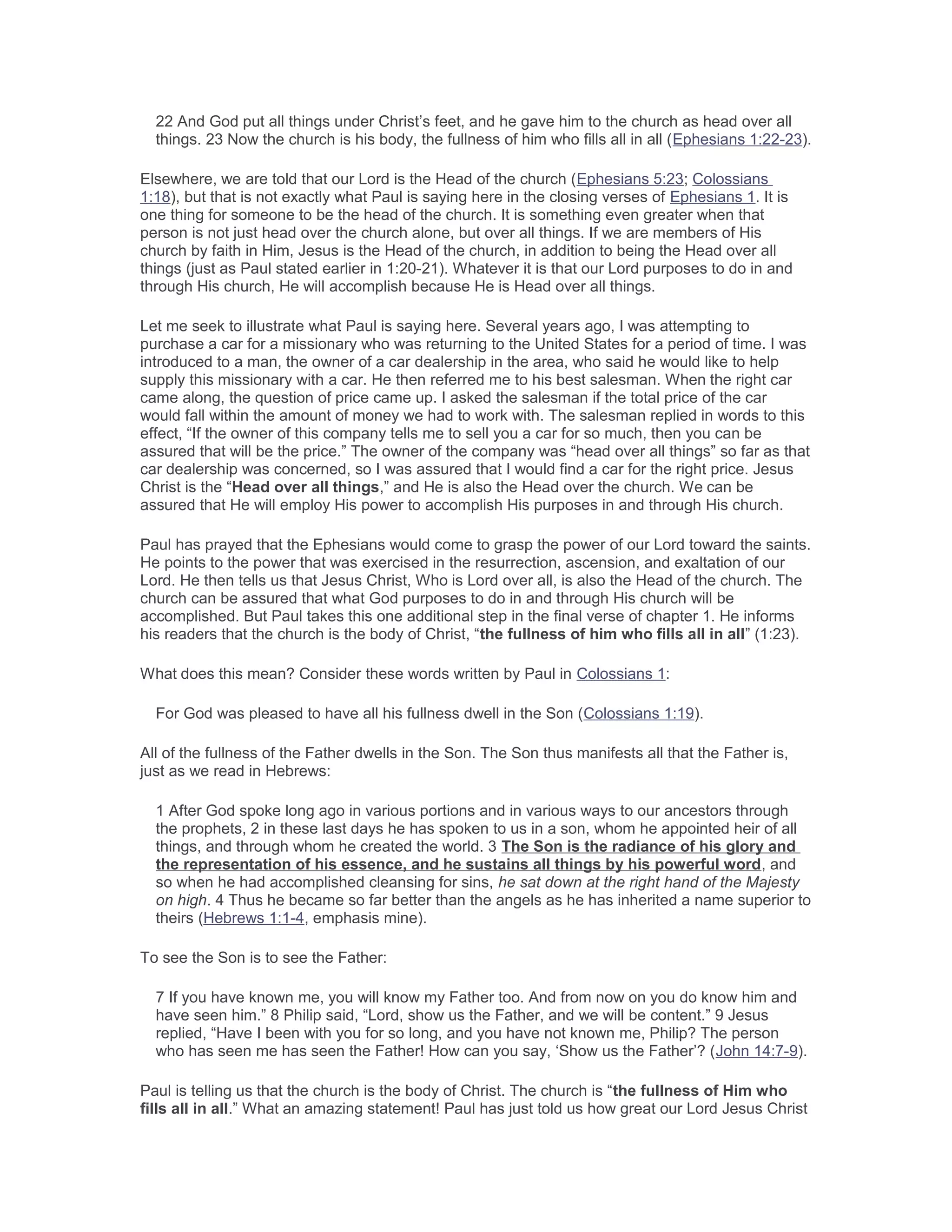
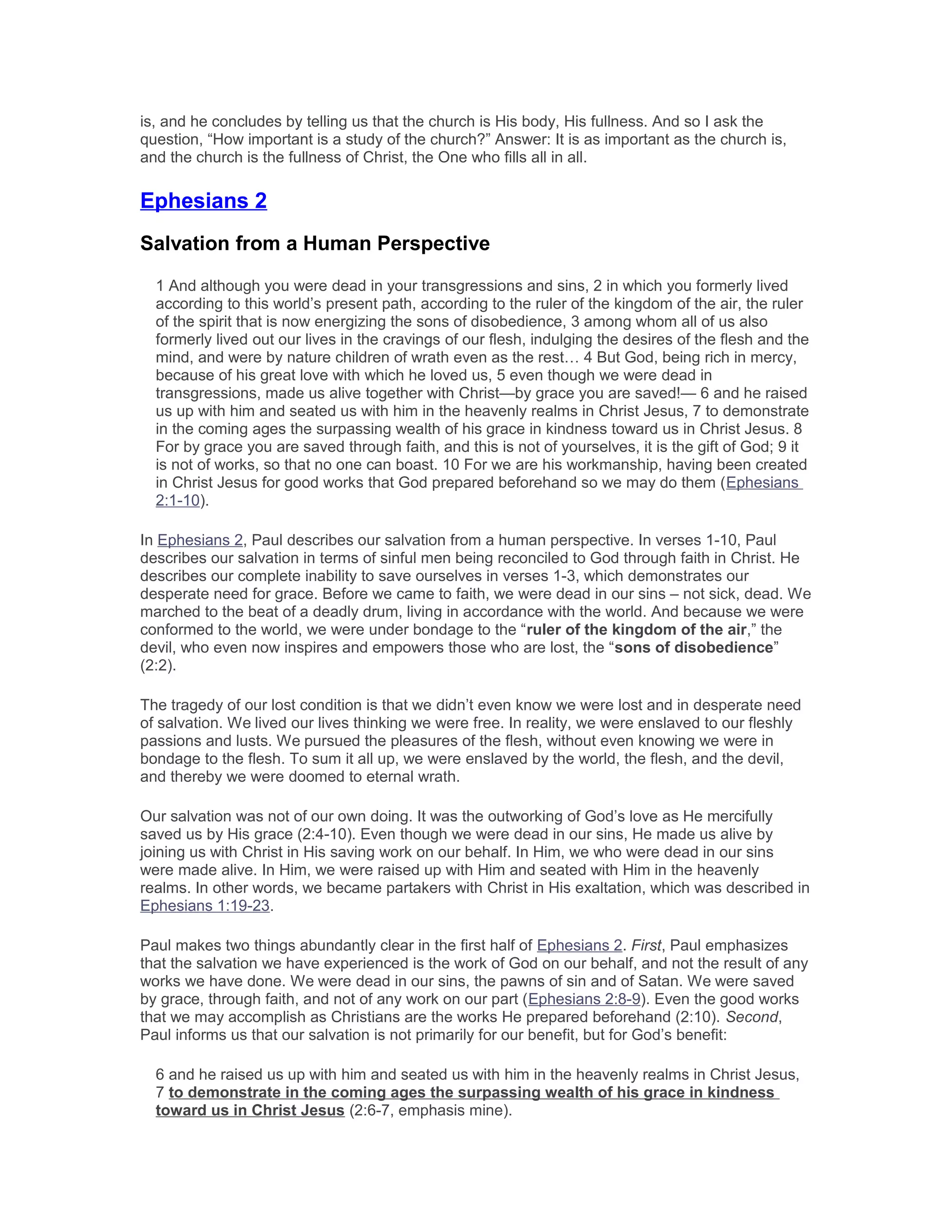
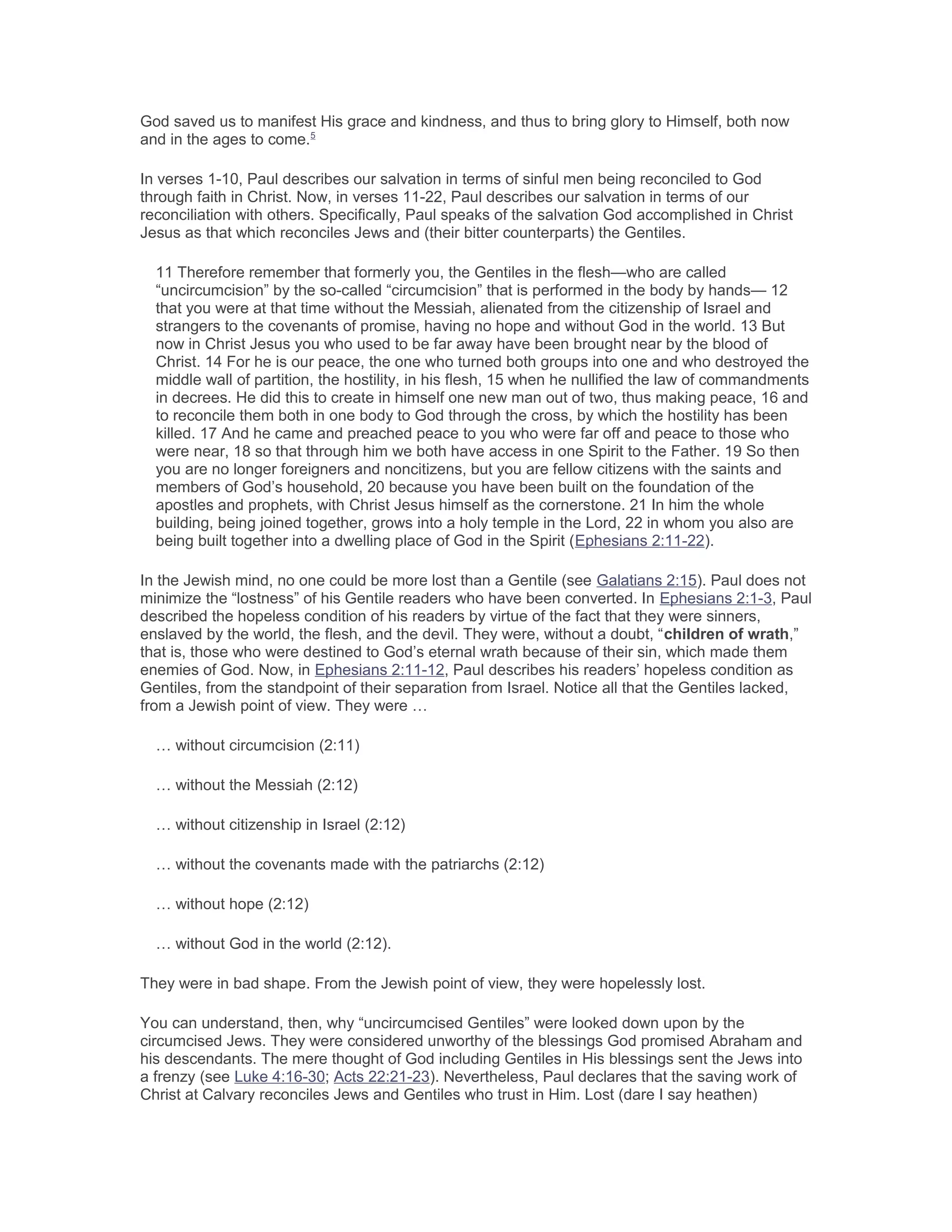
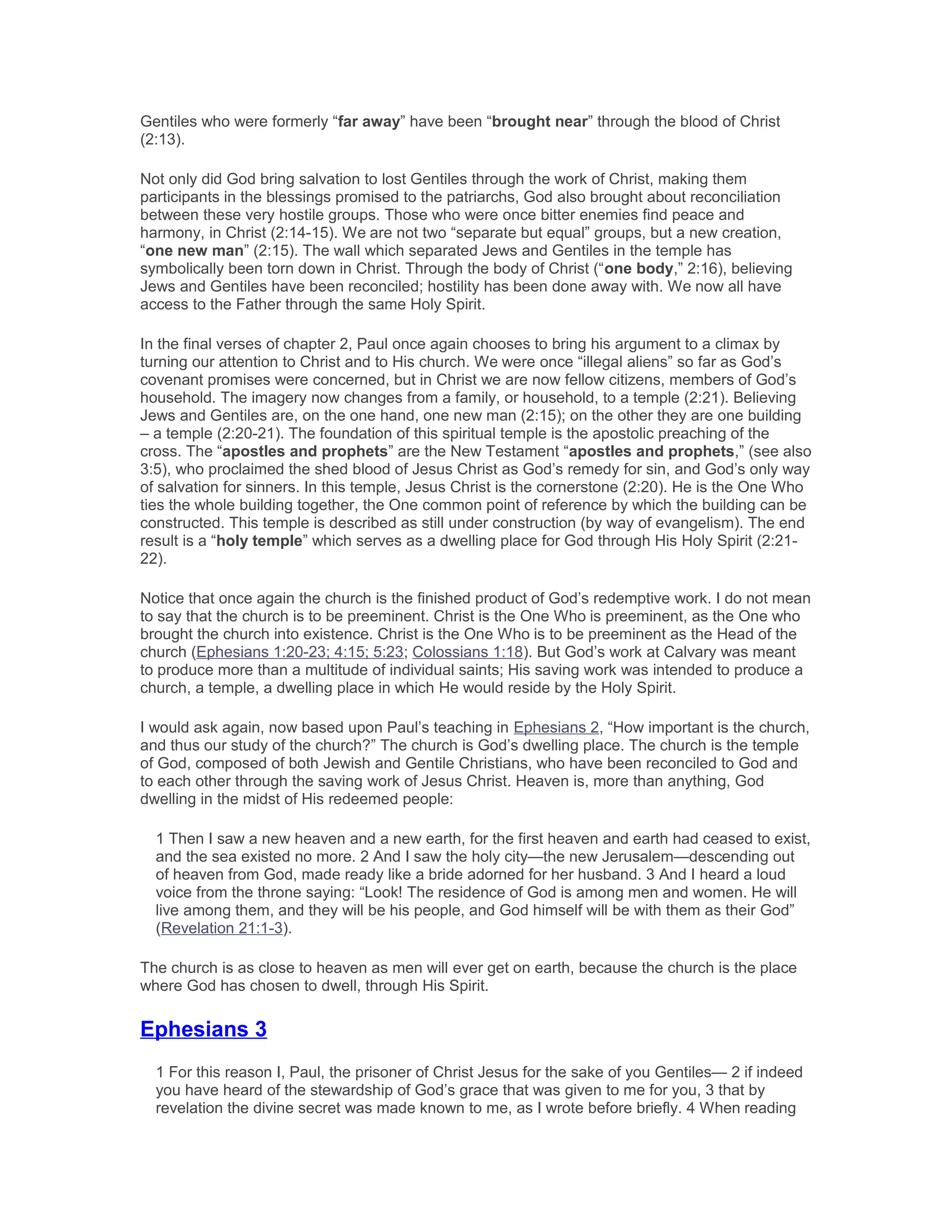
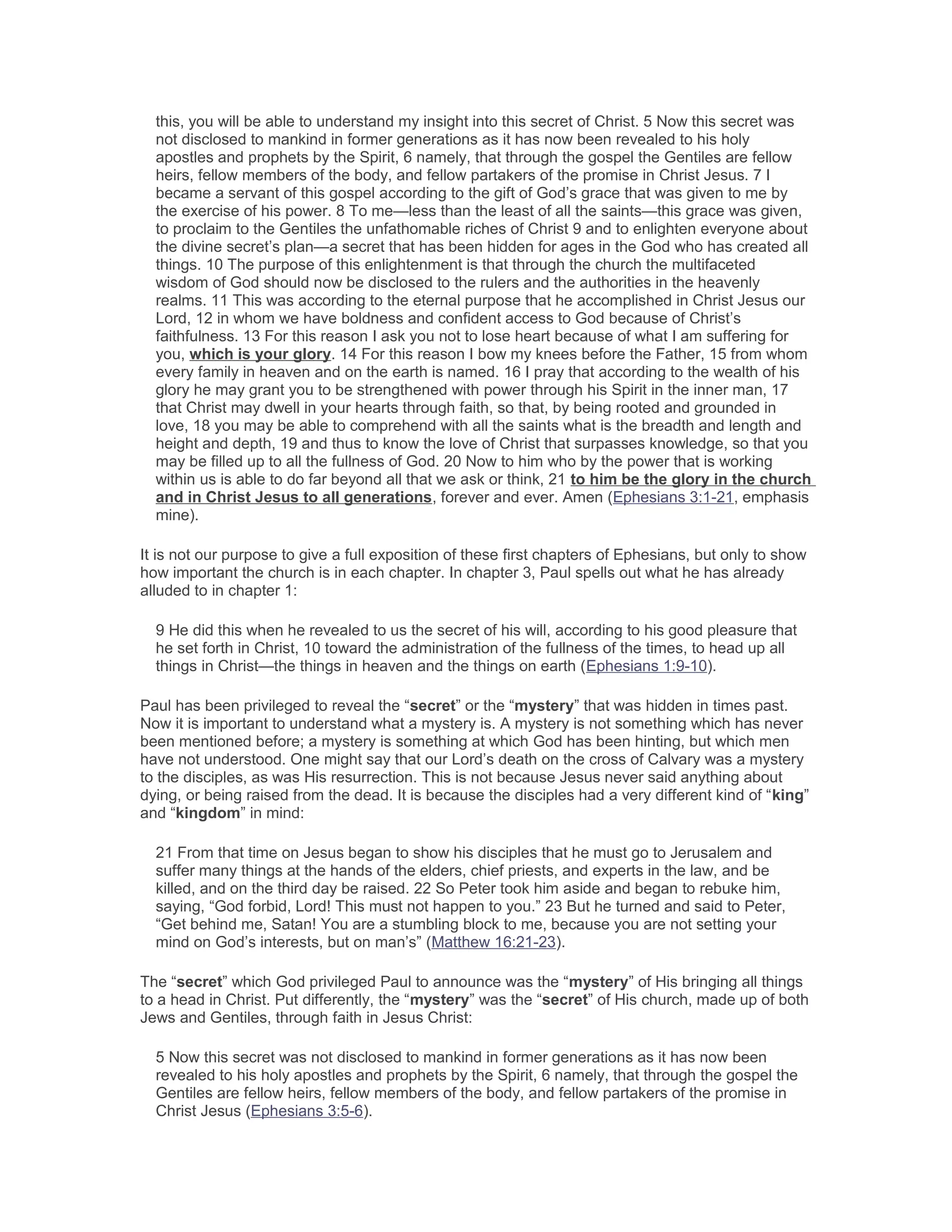
![This mystery is great—but I am actually speaking with reference to Christ and the church
(Ephesians 5:32).
Looking back, the salvation of Jews and Gentiles should come as no surprise, as we can see
from Paul’s quotations from the Old Testament in Romans 9-11. But looking forward, no one saw
the church coming. It was a great surprise. Paul was privileged not only to proclaim this mystery
(a proclamation that was not always welcomed – see Acts 22:21-23), but to actually preach the
gospel to the Gentiles.
My theological training predisposed me to think of the church as a kind of parenthesis,
sandwiched between God’s working with the Israel in the Old Testament and His working with
Israel in the future. But this is not the impression I get from Paul at all. As I was reading this week,
I found that I was not alone in this conclusion:
“Several times I have read the Bible straight through, from Genesis to Revelation, and each
time it strikes me that the church is a culmination, the realization of what God had in mind from
the beginning.”6
As Philip Yancey puts it, this sense of culmination is not something reached independently of
God’s Word, but as a result of reading His Word. Consider whether or not these texts don’t also
point to the same conclusion:
5 Now may the God of endurance and comfort give you unity with one another in accordance
with Christ Jesus, 6 so that together you may with one voice glorify the God and Father of our
Lord Jesus Christ. 7 Receive one another, then, just as Christ also received you, to God’s
glory. 8 For I tell you that Christ has become a servant of the circumcised on behalf of God’s
truth to confirm the promises made to the fathers, 9 and thus the Gentiles glorify God for his
mercy. As it is written, “Because of this I will confess you among the Gentiles, and I will
sing praises to your name.” 10 And again it says: “Rejoice, O Gentiles, with his people.” 11
And again, “Praise the Lord all you Gentiles, and let all the peoples praise him.” 12 And
again Isaiah says, “The root of Jesse will come, and the one who rises to rule over the
Gentiles, in him will the Gentiles hope.” 13 Now may the God of hope fill you with all joy and
peace as you believe in him, so that you may abound in hope by the power of the Holy Spirit
(Romans 15:5-13).
39 And these [Old Testament saints] all were commended for their faith, yet they did not
receive what was promised. 40 For God had provided something better for us [New Testament
saints], so that they would be made perfect together with us (Hebrews 11:39-40).
The church is not a parenthesis but an exclamation point! The church is not just an interlude or
intermission, something to occupy mankind while God prepares to save Israelites. The church is
the culmination and climax of God’s eternal plan. It is the consummation of God’s purposes, the
completion of what God had predestined in eternity past. The Scriptures had spoken of this, but
not so clearly that men would understand (and even if it were clearly revealed, it would not be
welcomed).
This “mystery,” now revealed, puts Paul’s persecution in a different light:
13 For this reason I ask you not to lose heart because of what I am suffering for you, which is
your glory (Ephesians 3:13, emphasis mine).
20 Now to him who by the power that is working within us is able to do far beyond all that we
ask or think, 21 to him be the glory in the church and in Christ Jesus to all generations,
forever and ever. Amen (Ephesians 3:20-21, emphasis mine).](https://image.slidesharecdn.com/238822738-apologetics-arguments-150913062852-lva1-app6892/75/238822738-apologetics-arguments-60-2048.jpg)
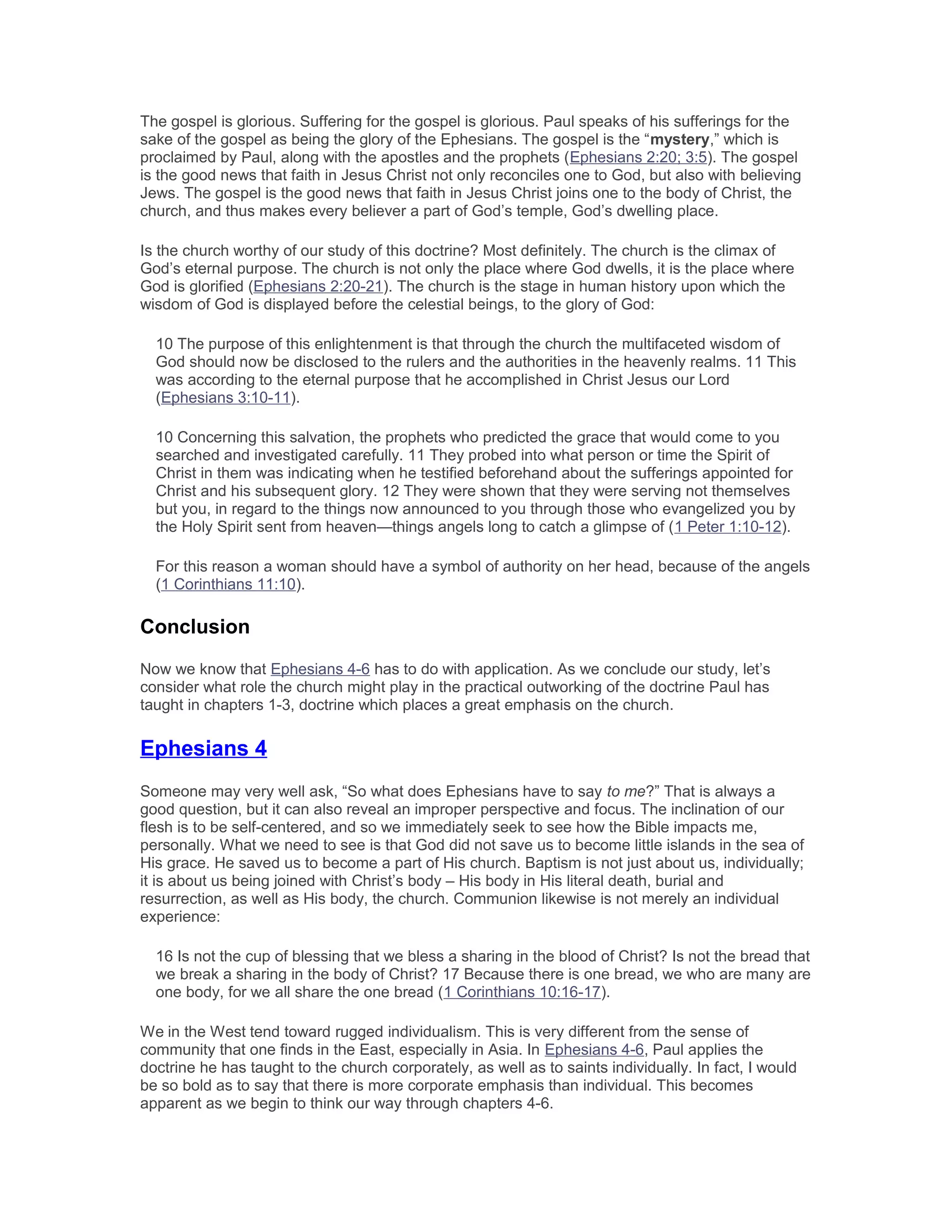
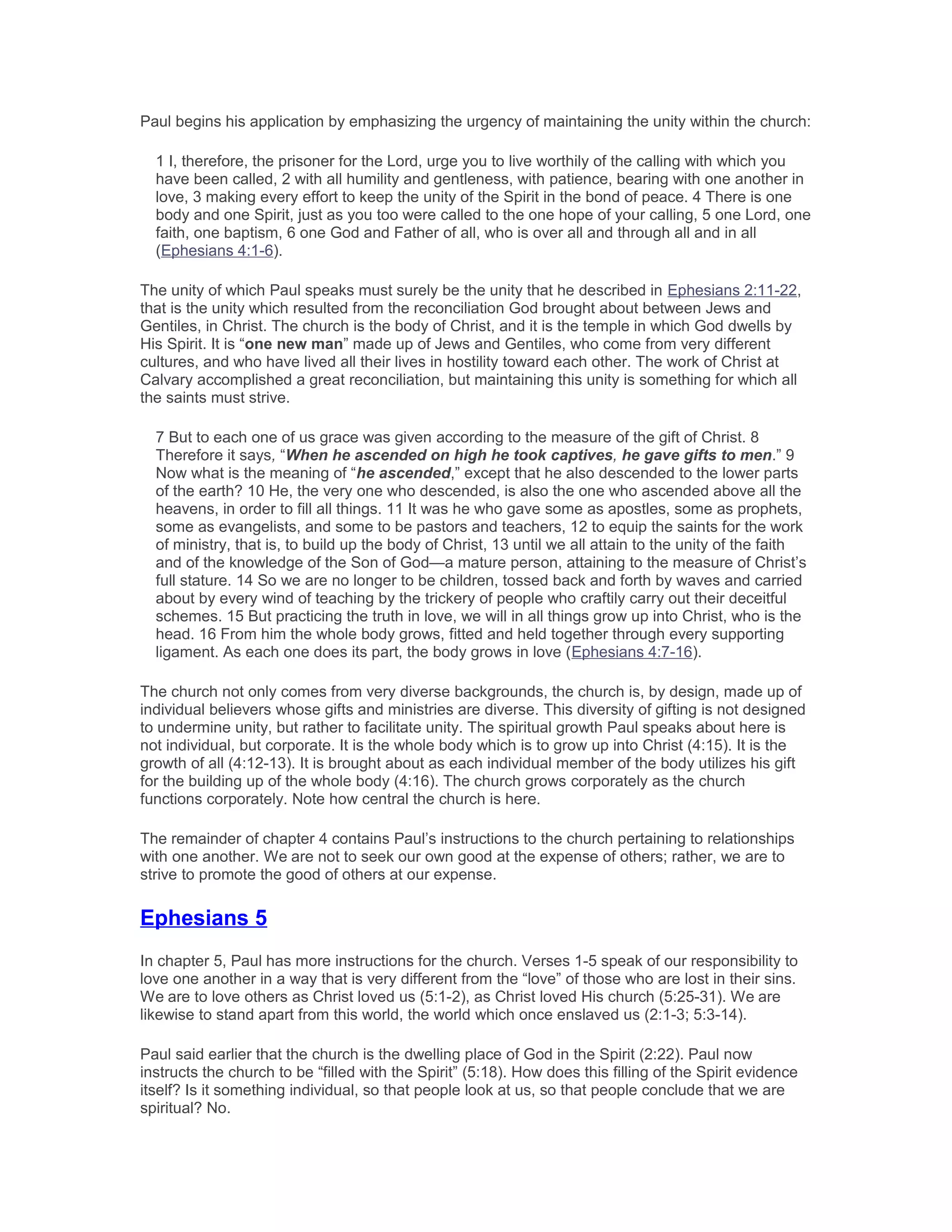
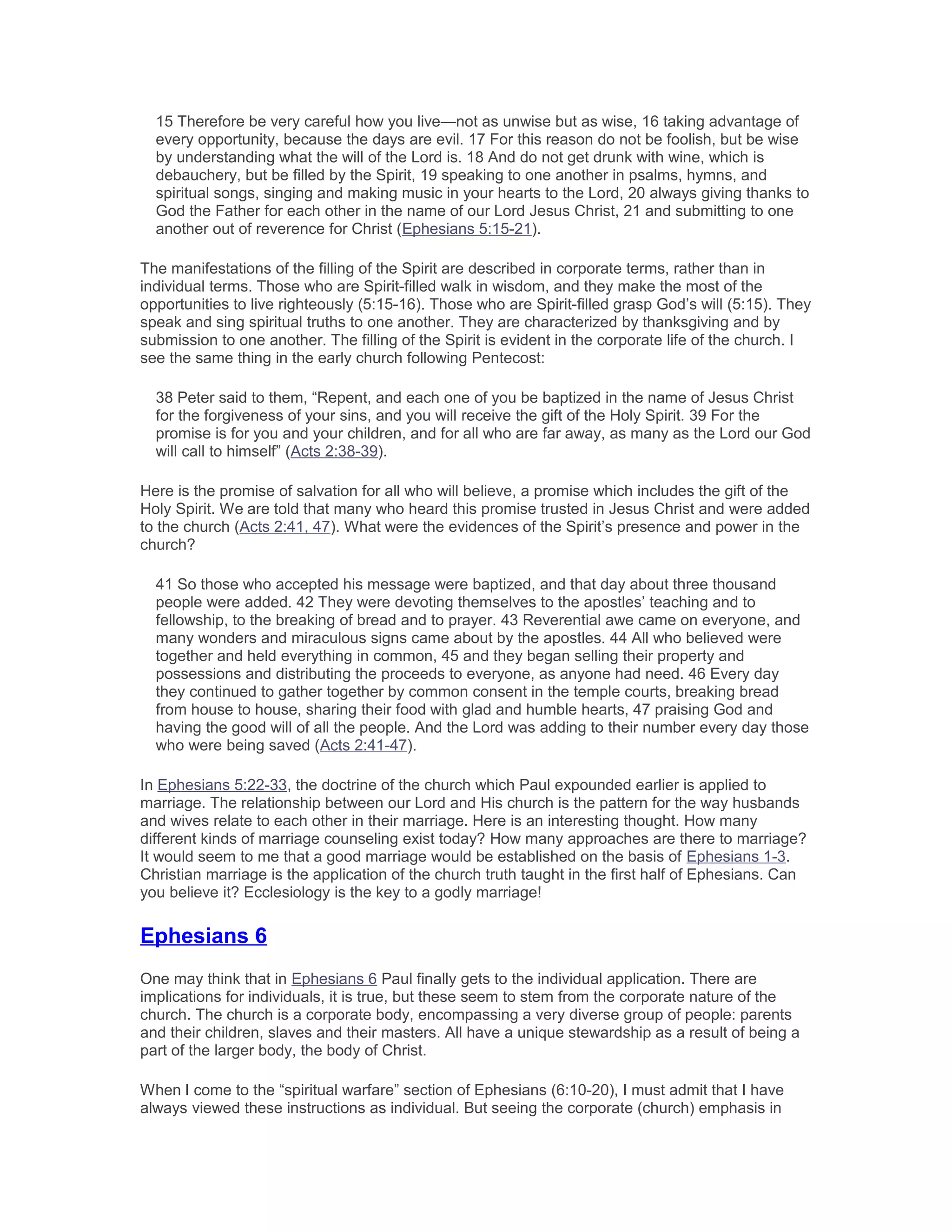
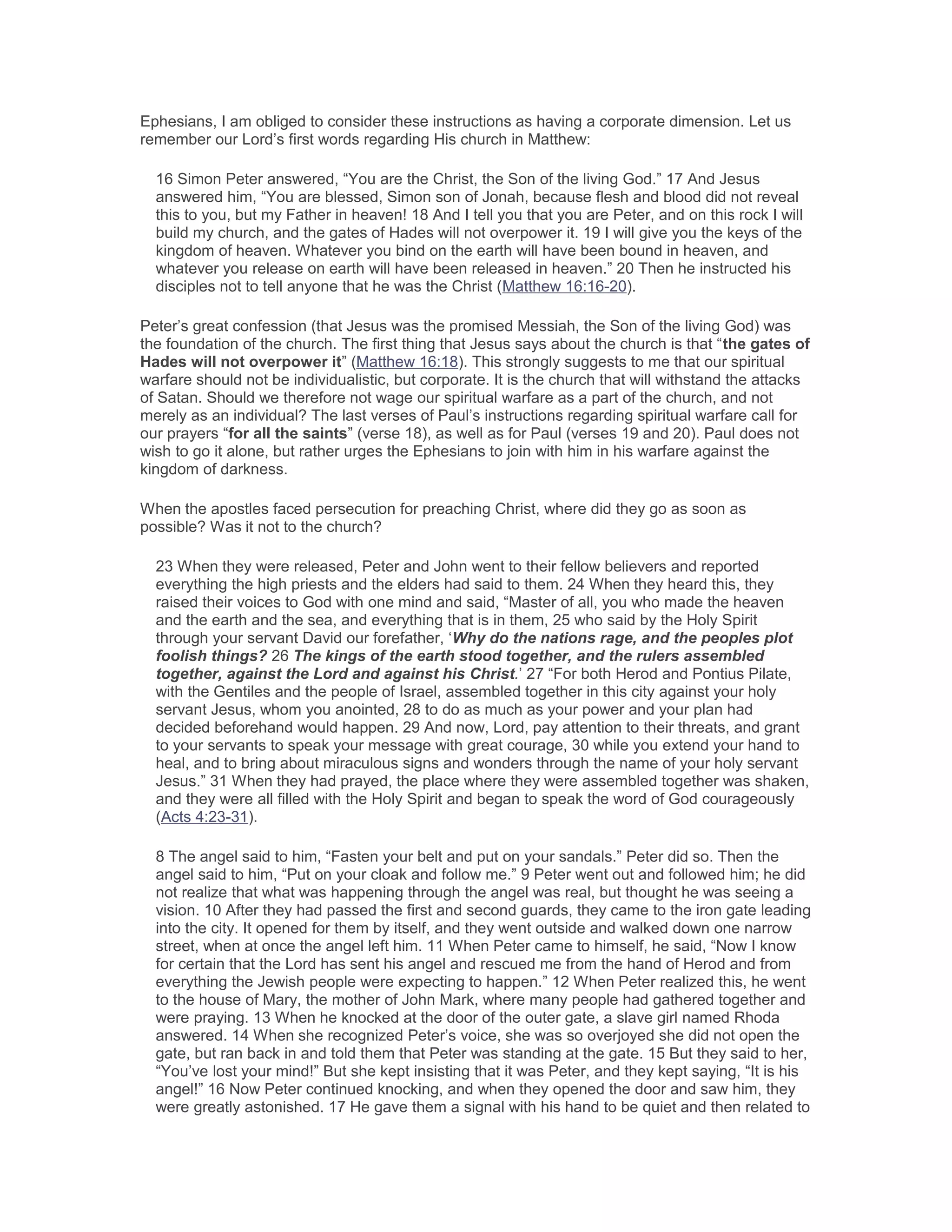
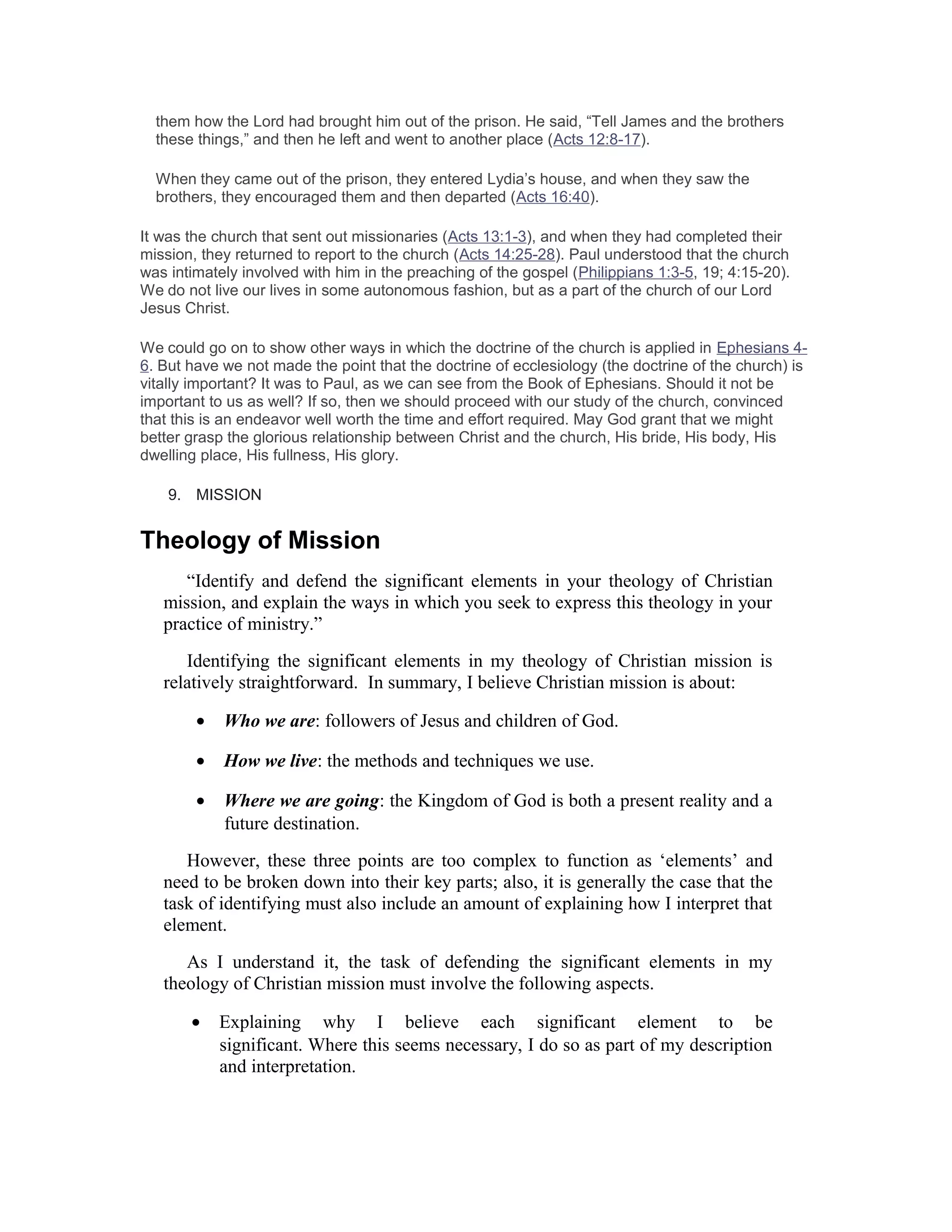
![• The elements of my theology are only present because they fit into a
wider framework of doctrine and practice. While the question does not
explicitly ask about this framework, I need to briefly identify some other
frameworks, the rejection of which plays a significant part in my choice
of significant elements.
• Some further explanation is needed as to why I have left out some other
elements other people consider to be significant.
Finally, the description of how I seek of express this theology is to be
understood in the context of my work at Crisis Centre Ministries.
1. Elements of Christian Mission
1.1. It is all about following Jesus
Christian mission must be about the mission of the Christ. Jesus had a
mission, and if we choose to follow Him, then we accept His mission as our
own. All the other elements of my theology of mission flow out of this one.
We are not called to exercise the same ministry as Jesus, but His practice of
ministry is to be normative for us: “our task is simply to imitate him” even
though what He did was “unique, climactic, decisive” [Wright, 2000:140].
Since a commitment to Jesus is also a commitment to His mission, this
mission must take a primary, central and inescapable place in our lives.
Primary, because Jesus consistently called people to give Him the primary
place in their lives. The earliest creed was probably the simplest: ‘Jesus is Lord’:
He is our absolute master. We may choose whether or not we follow Jesus, but if
we follow, we cannot choose to opt out of any aspect or area of discipleship.
(Despite our missionary recruitment strategies, He did not say “If you feel really
enthusiastic, you may want to consider going into all the world…”)
Central, because following Jesus has a determining influence on all other
aspects of our lives.
Inescapable, because there is only one category of membership.
Traditionally, the Church has been divided into doers and watchers: clergy and
laity, priests and people; but there is no (justifiable) basis for this in the New
Testament. We each have different roles to play, but we are all called to work
towards achieving the same goal.
1.2. It is about incarnation and crucifixion
Incarnation and crucifixion go together. God consistently works through
incarnation. When He wants to do something, He becomes present in a human
being. And in that human life, His power is made perfect in weakness.](https://image.slidesharecdn.com/238822738-apologetics-arguments-150913062852-lva1-app6892/75/238822738-apologetics-arguments-66-2048.jpg)
![The cross is vital, but it can only be properly understood in the context of the
incarnation. Our mission is primarily about God being present for people. He is
present for people because He is present in His people. “Incarnational
community action” [Green, 2001: 31, 55] is the only form of authentically
Christian community action.
The incarnation is central to NT doctrine and practice. John 3:16 is about the
incarnation. Jesus’ pivotal discourse after the Last Supper is a meditation on the
meaning and importance of incarnation: “Abide in me”. Paul’s letters can be
seen as explorations of what it means to be ‘in Christ.’
“It is impossible to stress too strongly that the beginning of mission is not an
action of ours but the presence of a new reality, the presence of the Spirit of God
in power.” [Newbigin, 1989:119] The ‘new reality’ became present in Jesus
through the incarnation, and the giving of the Spirit is also linked to the
incarnation: “‘as the Father has sent Me, I also send you.’ And when He had said
this, He breathed on them and said to them, ‘Receive the Holy Spirit.”’ (John
20:21-22, NASB)
1.3. It is about relationships
We tend to focus on the external details of activities and strategies and
doctrines. In considering Jesus, the most important things to note are not what
He said or what He did, but who He was, and the relationship He had with his
Father. His entire ministry flowed from this self-understanding and relationship.
Wright’s assessment of Jesus’ self-understanding as a key issue is largely
accepted, even by his critics – see, for example, Bock in [Newman, 1999: 110].
Not only Jesus’ ministry but also the whole of the New Testament is primarily
about relationships. Doctrines matter because they affect how we live, and how
we live matters because it affects our relationships.
Jesus summarises the law of Moses in terms of two relationships: love God,
and love your neighbour. The atonement is important because it restores a
broken relationship: “you are no longer strangers and aliens, but… of God’s
household” (Ephesians 2:19).
Perhaps most significantly, we see in the John 20:21 text quoted above that
Jesus “makes his own relationship with the Father the basic paradigm for the
disciples’ relationship with Jesus in the pursuit of their mission.” [Kostenberger
& O’Brien 2001: 260]
1.4. It is about the Kingdom of God
I take it as self-evident that the Kingdom of God, however we are to
understand this concept, was central to both Jesus’ preaching and His wider
mission.](https://image.slidesharecdn.com/238822738-apologetics-arguments-150913062852-lva1-app6892/75/238822738-apologetics-arguments-67-2048.jpg)
![1.5. It is about serving others
Jesus’ own ministry was about encountering other people and serving them in
appropriate ways. His focus was not primarily on His own spiritual life and
health (although these things clearly did matter to Him) but on the concerns and
needs of the people around Him – both His disciples and those who did not
follow Him.
There is no suggestion in the Gospels that Jesus was trying to impose a pre-
defined agenda on the people He met. He returned to some key themes and
issues many times in his ministry, and at times He used encounters with
individuals as an example or teaching aid (“See this child?”), but He never used
the individual.
Jesus saw His own role as that of a servant (Luke 22: 27), and always put the
needs of the people He met before his own agenda of teaching and demonstrating
the Kingdom.
1.6. It is about the whole person
In modern terms, Jesus exercised a ‘holistic’ ministry: his activity was neither
purely focussed on the spiritual (preaching and praying) nor on the physical
(feeding and healing). This sounds simple and obvious, but it is not simple in
practice, and I have encountered many Evangelical Christian who do not believe
that this aspect of His ministry is normative for us.
1.7. It is about engagement in society
Jesus and the Apostles worked to reach and transform individuals: there is no
suggestion that they planned to transform the society they lived in. But still,
Jesus’ mission led Him to engage the political and economic systems of His day:
He taught about money, tax and inheritance rights.
While we may choose to disengage from some aspects of society (such as
food sacrificed in pagan temples, or the national lottery), we are expected to
function as active members of society and not withdraw from it into self-
sufficient monasteries or communes. Jesus chose not to join the Essenes.
The term ‘engagement’ should be understood in the context of Warren’s
linking of “distinctive and engaged” [1995: 29], a discussion which closely
parallels my use of the phrase “unique and united” which has been repeated
many times since first preaching a sermon on that theme in 1987.
1.8. It is about working together
We are united in a real way with our fellow members of the society in which
we live, but in a deeper way with our fellow Christians. While it is not entirely
true that “there are no lone Christians in the Bible” (the Ethiopian eunuch seems](https://image.slidesharecdn.com/238822738-apologetics-arguments-150913062852-lva1-app6892/75/238822738-apologetics-arguments-68-2048.jpg)
![to be the exception that proves the rule), Christian ministry is always undertaken
as a corporate activity. Jesus sent out the disciples in pairs; the Apostles worked
in groups; in each new church Elders (plural) were appointed; and so on.
Our unity is not only a vital doctrine, but it testifies to and authenticates the
message we preach: “the only effective hermeneutic of the gospel is the life of
the congregation which believes it” [Newbigin, 1989:234]
The ministry and gifting of each individual Christian is seen in the context of
the Body of Christ, and each member needs the other members to make up what
is lacking: “If the whole were hearing, where would the sense of smell be? (1
Corinthians 12: 17b)
1.9. It is about the ‘Ephesians Four’ ministries
I believe that the ministries listed by Paul in Ephesians 4:11 are all vital
components of both church life and Christian mission. I do not have space to
explain and justify my interpretation of this verse and the surrounding passage,
but it seems to me that this passage is talking about “a total mobilisation of the
entire membership of the Church for ministry to the world and building up the
body” [Johnstone, 1998:163] both locally and elsewhere.
2. Defending (1): Alternative Approaches
What I would like to do at this point is respond in detail to Bosch [1991], but
space does not permit.
I have long held the view that most of our errors in doctrine and practice can
be traced to a misunderstanding of the nature of the church. Of course, this brief
statement ignores a major ‘chicken and egg’ issue (such as I describe below
under ‘Eschatology’), but it does provide a framework for mentioning three
alternative approaches I reject in principle.
2.1. The Church as an institution
While the church clearly is an institution, it is more than an institution. The
reduction of the church in practice to no more than a human institution is often
identified with the Constantinian revolution. For example, we read, “The legacy
that Christendom bequeathed to the church was effectively to reduce it to the
status of an institution for the care of the faithful” [Shenk, in Saaymon &
Kritzinger, 1996:90], but in reality this transformation took place much earlier.
The early Church Fathers were very concerned about matters such as the
characteristics of a holy lifestyle, the value of martyrdom, the differences
between Christian and non-Christian values and lifestyle, and church practice:
the letter of Polycarp [Staniforth, 1968: 144-150] is a good example. It is all
about ‘the care of the faithful.’ According to the written records, they showed
very little concern for mission and evangelism: in the Didache, only chapter 11](https://image.slidesharecdn.com/238822738-apologetics-arguments-150913062852-lva1-app6892/75/238822738-apologetics-arguments-69-2048.jpg)
![touches on these concerns, and then it is only to warn that a true ‘missioner’ will
never stay as a guest “more than a day, or two days if it really necessary” [:233].
2.2. The Church as the whole society
I am persuaded by various arguments (see, for example, Verduin [1976]) that
the identification of Church with society is mistaken, and also has a number of
serious and unfortunate consequences. Two of these consequences are
particularly relevant here.
Firstly, if the whole of society belongs to the church, there is no place for
Christian mission within the ‘Christian’ society. I acknowledge the inspirational
work of many Christians, such as St Francis, who gave themselves to this task,
but the battles they had to fight within the church to justify their activities
adequately demonstrates my point.
And secondly, if the model is for society as a whole to be Christian, then
‘Christian’ mission must result in the destruction and re-creation of the culture of
any non-Christian society. Mission in this context is not about serving people
but conquering them. For example, the missionaries arriving with Cortés and
Pizarro were clearly involved in “a continuation of the crusades.” [Bosch, 1991:
226]
2.3. The Church as a ghetto
Many people outside the Church have declared it to be irrelevant, but the real
problem is that much of the Church believes itself to be irrelevant to modern life
and society as a whole: the private world of personal identity and meaning is not
functionally connected with the public world of the state, commerce, health and
education [Walker, 1996: 116-121].
It can be argued that Protestant churches accepting “compartmentalized
living” [Gibbs & Coffey, 2000: 37] is a natural consequence of the Reformers’
unquestioning acceptance of the Roman Catholic understanding of the Church
carried forward into a world in which every congregation owes more to the
gathered Church of the Anabaptists than the parish church of Christendom; but
we do not have room to pursue that question here.
3. Defending (2): ‘Missing’ Elements
All Christian truth is inter-related, and mistakes or biases in interpreting any
one area will have an impact on our understanding of all other areas.
Consequently, I do not want to exclude any Biblical material or concept:
everything is relevant, and every doctrine can make an important contribution
when considering some aspect of Christian mission.](https://image.slidesharecdn.com/238822738-apologetics-arguments-150913062852-lva1-app6892/75/238822738-apologetics-arguments-70-2048.jpg)
![The following items are only excluded from my list of significant elements
because they are less significant to me in establishing a theology of Christian
mission than the elements identified above.
3.1. The mission of God
It seems to me that much of the discussion of the ‘mission of God’ improperly
confuses the works of the Father and the Son. But the Father’s mission is
“wrapped up first and foremost in God’s act of sending his Son.” [Williams, in
Larkin & Williams, 1998: 240] The Father sends the Son; the Son has a mission,
and invites us to join Him in it.
The work of God (in, for example, creation, or the calling of Abraham) may
inform our understanding of Christian mission, but does not define or determine
it. In seeking to understand Christian mission, it must be of secondary rather
than primary importance.
3.2. The trinity
The New Testament clearly teaches that we follow Jesus, who is the way to
the Father, in the power of the Holy Spirit. But it is equally obvious that the NT
does not contain a doctrine of the trinity, and it took the Church centuries of
prayer, debate and conflict before the Athanasian Creed was formulated and
widely accepted; and even then, the filioque controversy was never resolved.
While many writers consider belief in the trinity to be foundational or a
“fundamental belief” [Newbigin, 1978:31], and while I wholeheartedly believe in
the triune God, I cannot believe that a doctrine that Jesus and the Apostles never
(to our knowledge) taught can be central to any vital aspect of Christian life or
teaching.
3.3. Spiritual warfare
Much teaching about spiritual warfare is dangerously misguided. Books on
the subject tend to treat it as a specialist activity for the spiritual elite, while in
the NT it is used as one metaphor among many for the ‘normal Christian life’
that all followers of Christ are called to.
So I wish to simultaneously affirm that authentic Christian mission is an
engagement in spiritual warfare, and also to deny the relevance of much writing
on the subject. In this, as in many areas, I am indebted to Forster – see [1997: 7]
for example.
3.4. Eschatology
I believe and teach what I affirmed above: that our beliefs affect the way we
live. But the opposite is also true: we tend to believe the doctrines which support
the way we choose to live. In all the evangelical churches I have known well,](https://image.slidesharecdn.com/238822738-apologetics-arguments-150913062852-lva1-app6892/75/238822738-apologetics-arguments-71-2048.jpg)
![whatever was taught from the pulpit, the people who tithed tended to believe in
tithing.
I have spent a great deal of time talking with people about eschatology,
primarily in the context of mission and evangelism. From my personal
experience, eschatology is one of those areas where people tend to believe what
is convenient to them and the group they belong to. It is very easy to claim that
your lack of engagement in society is a consequence of your doctrine.
Conversely, if you want to overturn the current social framework, a belief in an
imminent millennial kingdom is very useful, as can be seen from the tragedy of
Münster in 1534-5 [Williams, 1962: 362-381].
It is easy to establish a logical connection between eschatological theories and
the practice of mission (or the lack of it), but “neither the eschatologization nor
the historicization of mission satisfies” [Bosch, 1991:508] because there must be
an eschatological dimension to our missionary activity, but those who take an
eschatological starting point offer no consistent model or guidance.
3.5. Election
Both Calvinists and Armenians have been deeply involved in Christian
mission: Wesley and Whitfield are the classic examples. And both sides can
argue convincingly that their position provides the greatest impetus for
missionary activity. So, however important to the individual the doctrine of
election may be, it is clearly not an essential part of an understanding of
Christian mission.
If we widen the concept of election from the confines of the Calvinist-
Armenian debate, it seems to me that what is really being spoken about much of
the time is the closely-related concept of incarnation. For example, “God’s way
of universal salvation… must be accomplished by the way of election – of
choosing, calling and sending one to be the bearer of blessing for all.”
[Newbigin, 1978: 78-79]
4. Expressing the Theology
4.1. Following Jesus
One of the chief difficulties in planning any social action project is the
question of boundaries: some of the problems you come across will be what you
were set up to deal with, while others will not be. At times the boundaries will
be arbitrary (many projects for young people help those up to 25 years old, for
example) and often the boundaries will be blurred and subjective (many charities
help people with ‘serious’ financial hardship).
This creates difficulties for any project, but especially for a Christian project
where we are seeking to follow Jesus. How do you set boundaries; how do you
refuse to help people in Jesus’ name?](https://image.slidesharecdn.com/238822738-apologetics-arguments-150913062852-lva1-app6892/75/238822738-apologetics-arguments-72-2048.jpg)
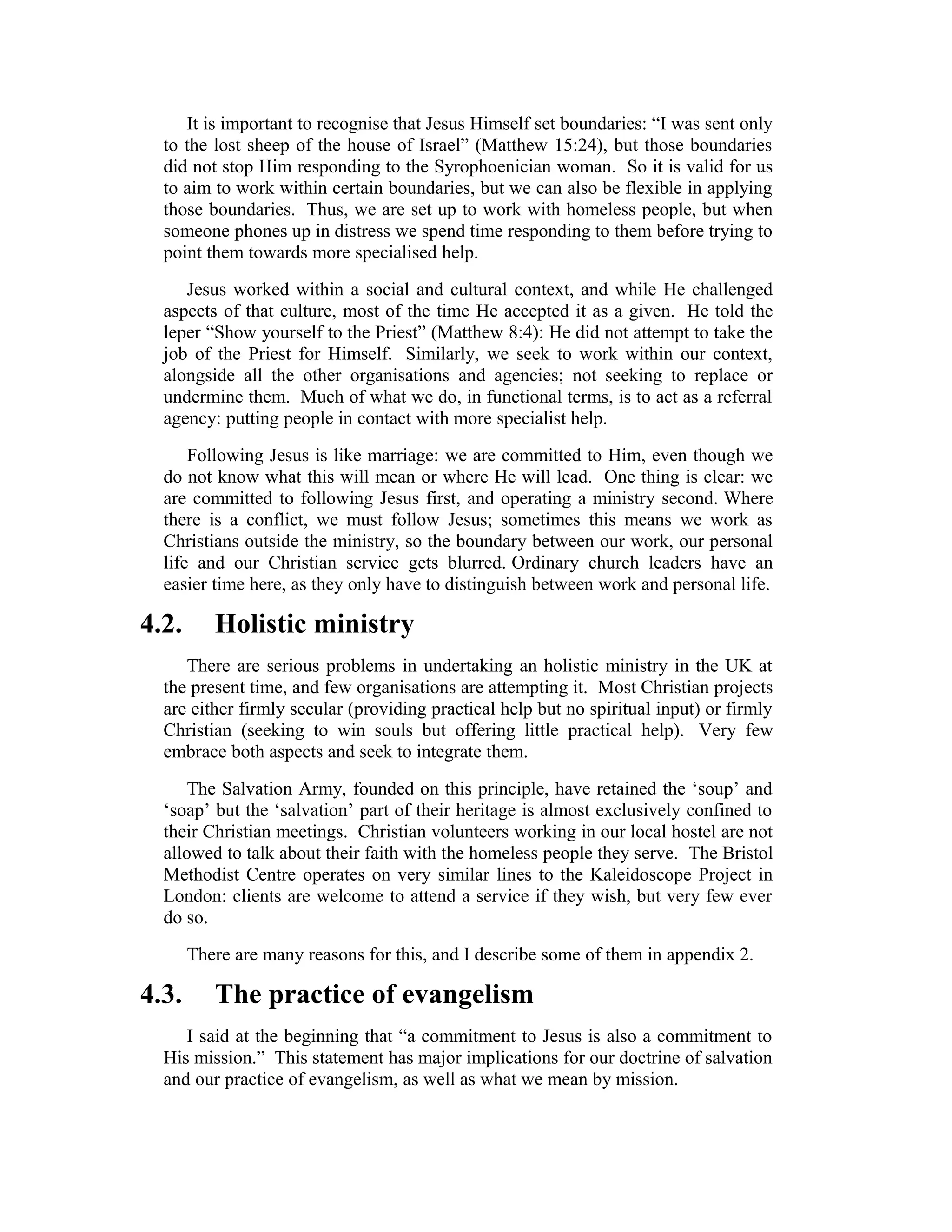
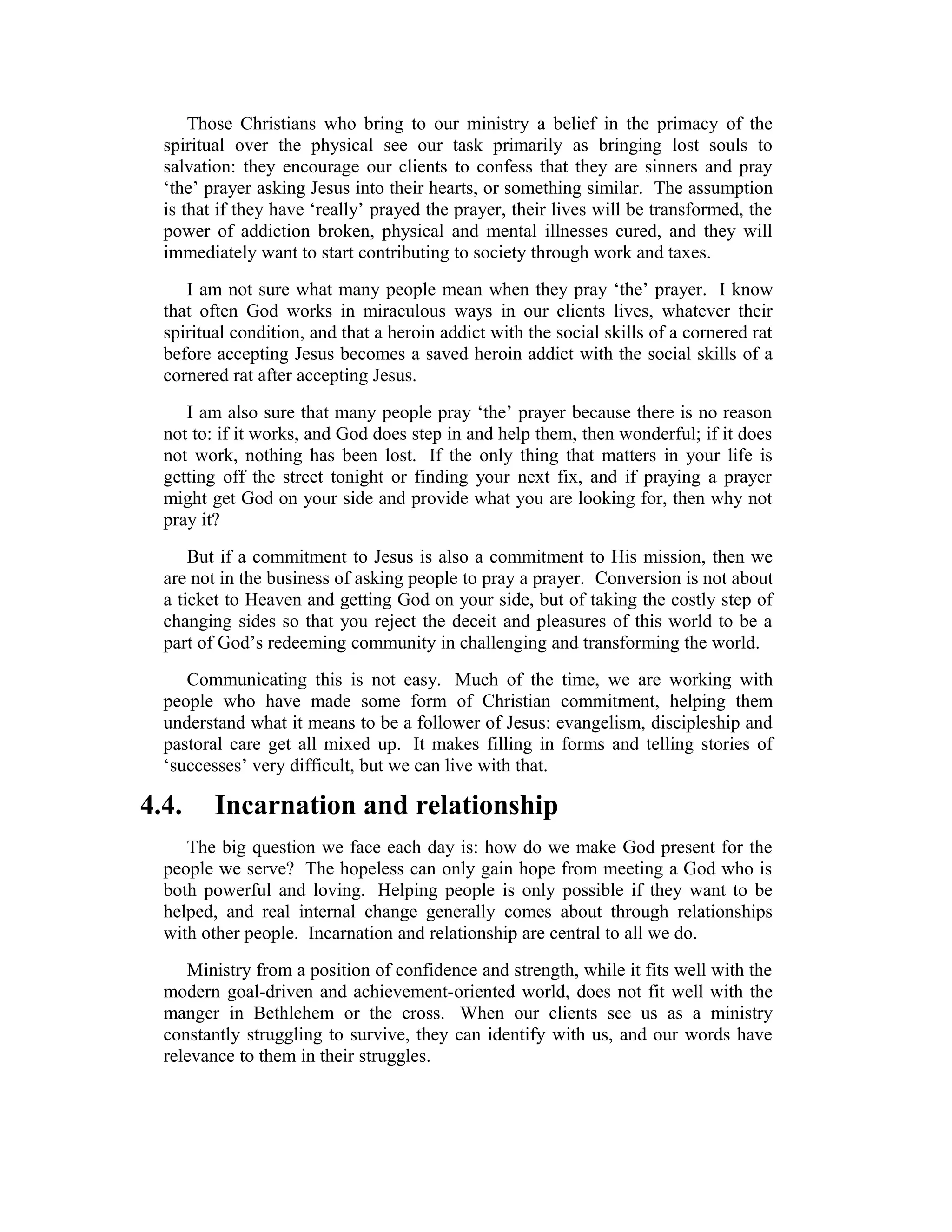
![One of the key problems our clients have with most ordinary churches is that
the people in them are far too successful. From the outside, everyone is happy,
successful in their work and secure in their marriages. I have handled enough
pastoral crises to know this is not true, but the illusion of respectable success has
a powerful hold on most modern churches. When we admit our spiritual
struggles and weaknesses, the poor and the weak may recognise in our lives the
presence of a God who can reach down to where they are.
Theological certainty can cause the same problems. “I have often been
puzzled by missionaries persuading their Asian friends to change their faith from
Buddha to Jesus Christ… They themselves are not ready to change one iota of
their rigid theological position or denominational security and self-identity.”
[Koyama, 1976: 33]
God revealed Himself in Jesus not as a powerful King or avenging Judge, but
as a powerless nobody. Both the incarnation and the cross show us a God who
comes to us in weakness so that He can touch us weak creatures and change us.
10. LAST JUDGEMENT
Judgment Day
Introduction
Judgment Day marks the end of time. What will occur on that day? Do we know when it
will transpire? Will there be any warning? Many people may have opinions and
speculations, but only the Bible is the authority that can answer these questions for us.
Therefore, let us examine a few passages to see what the Bible has to say.
All Saints from All Time will be Carried to Heaven
During the New Testament times, the Christians at Thessalonica became worried that the
Christians who died would miss out on Jesus' return. They were afraid those who died
ceased to exists. Let's examine the apostle Paul's explanation about the dead and
Judgment Day:
But I do not want you to be ignorant, brethren, concerning those who have fallen asleep,
lest you sorrow as others who have no hope. For if we believe that Jesus died and rose
again, even so God will bring with Him those who sleep in Jesus.
"For this we say to you by the word of the Lord, that we who are alive and remain until
the coming of the Lord will by no means precede those who are asleep. For the Lord
Himself will descend from heaven with a shout, with the voice of of an archangel, and
with the trumpet of God. And the dead in Christ will rise first. Then we who are alive](https://image.slidesharecdn.com/238822738-apologetics-arguments-150913062852-lva1-app6892/75/238822738-apologetics-arguments-75-2048.jpg)
